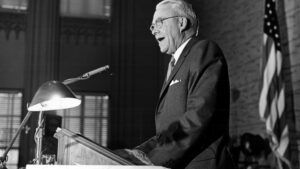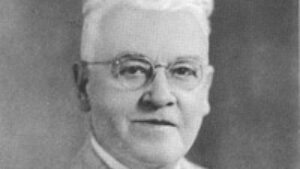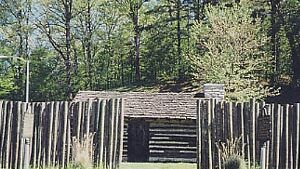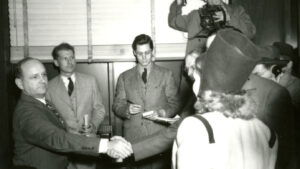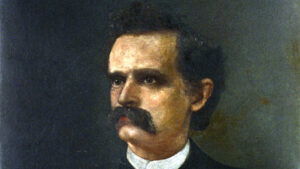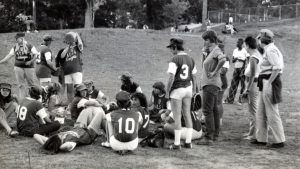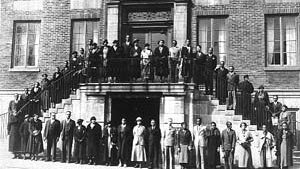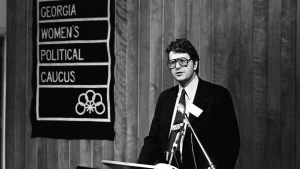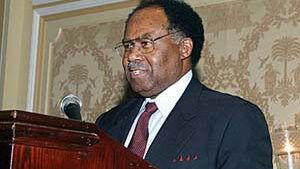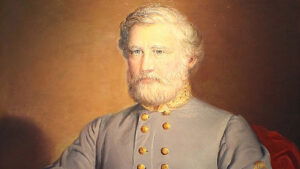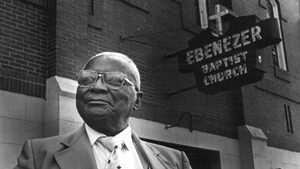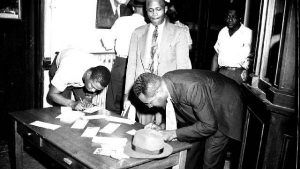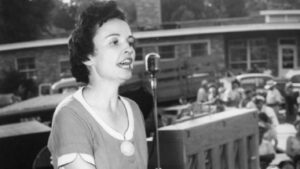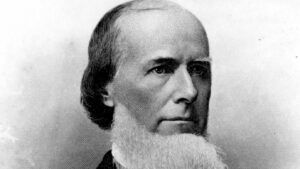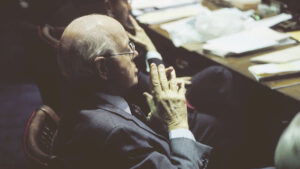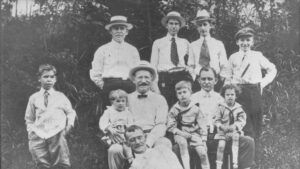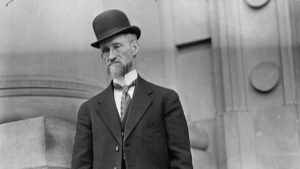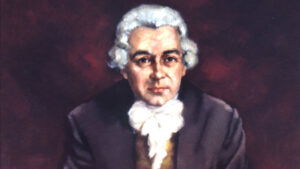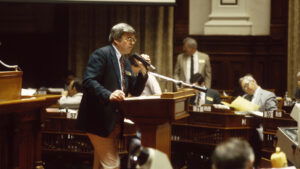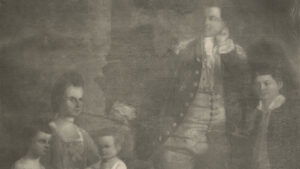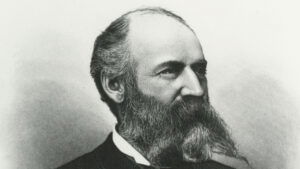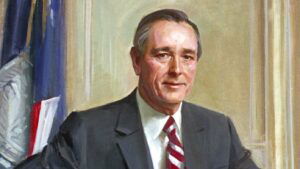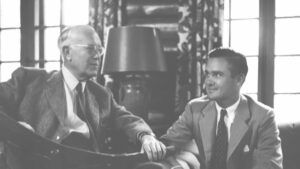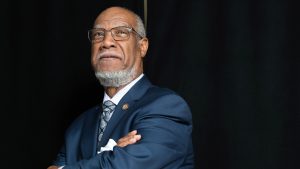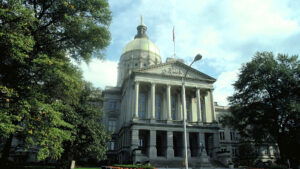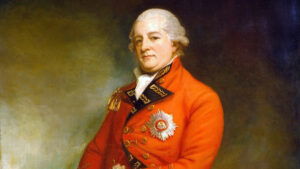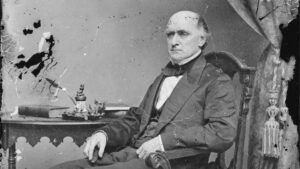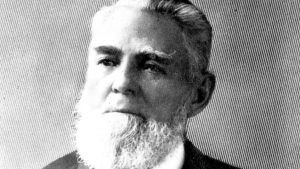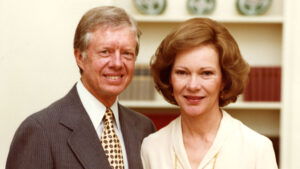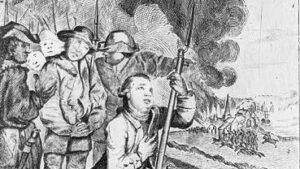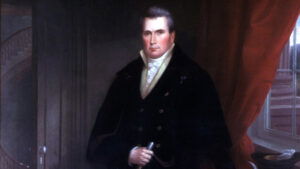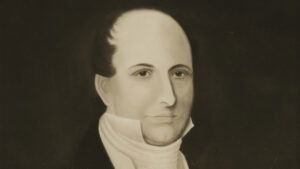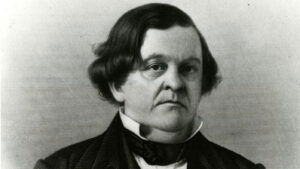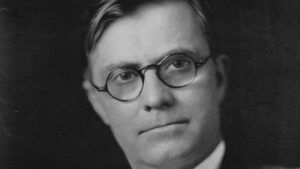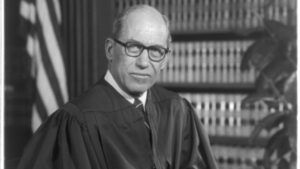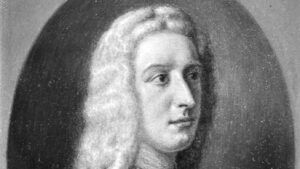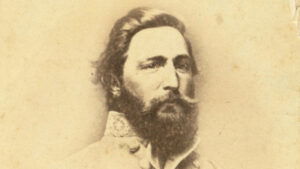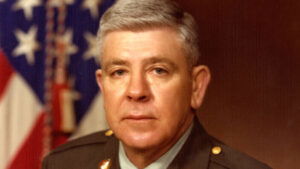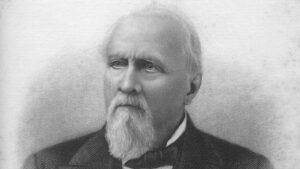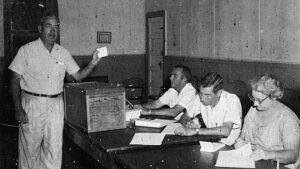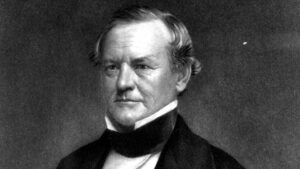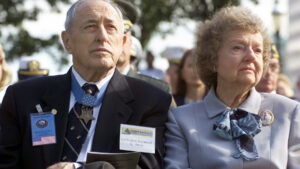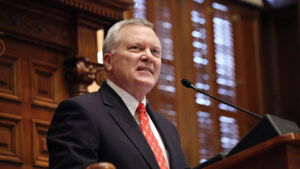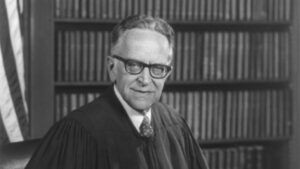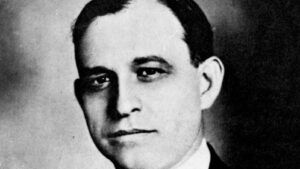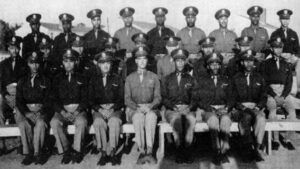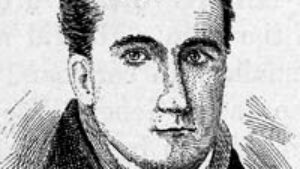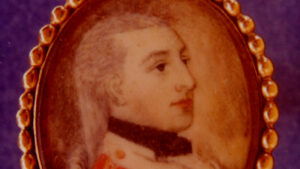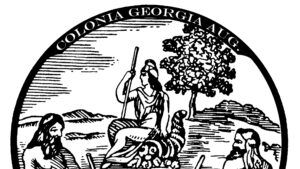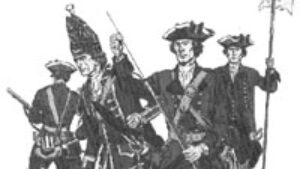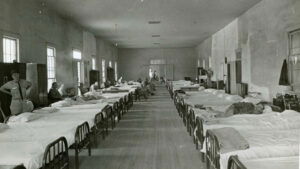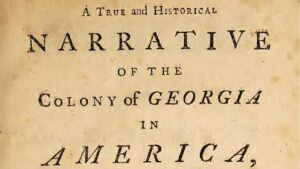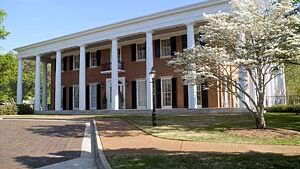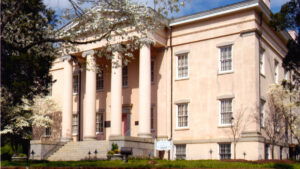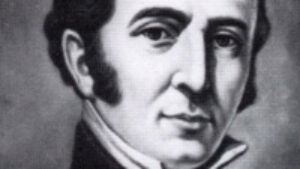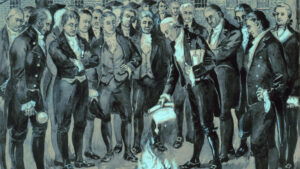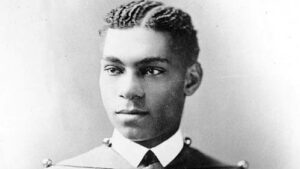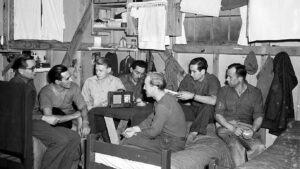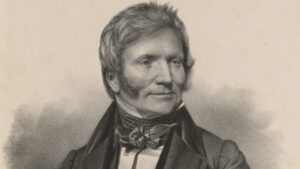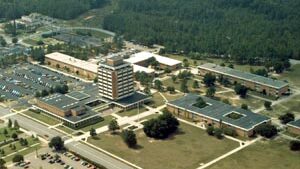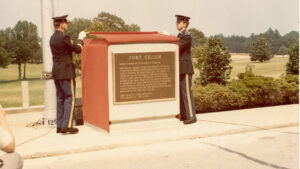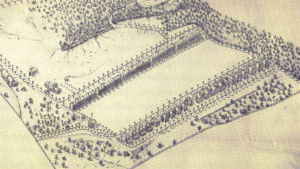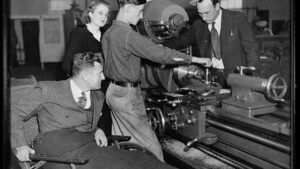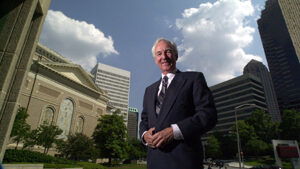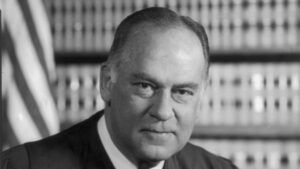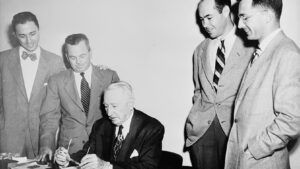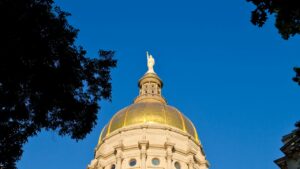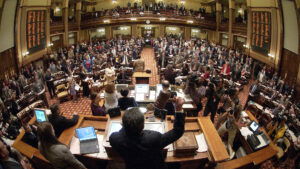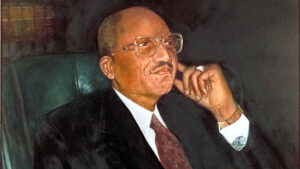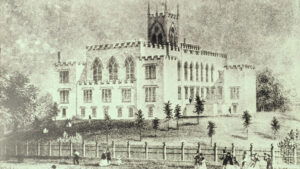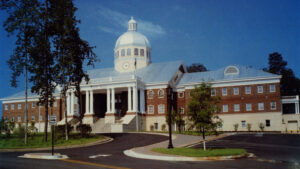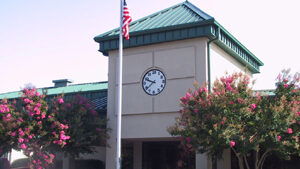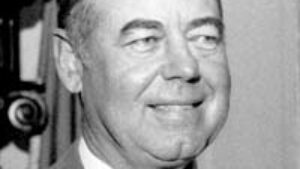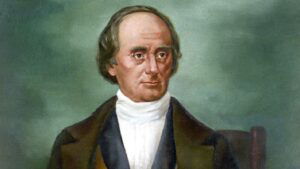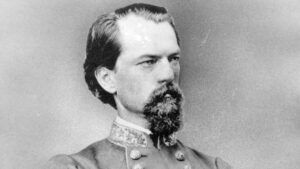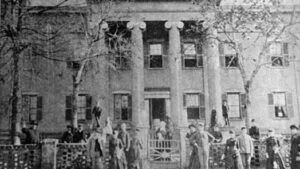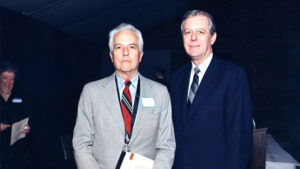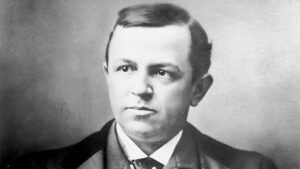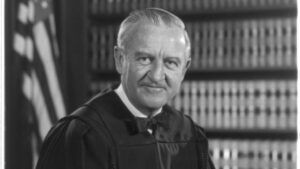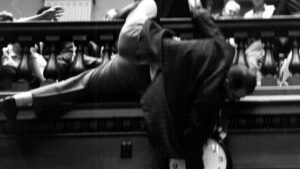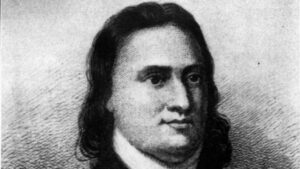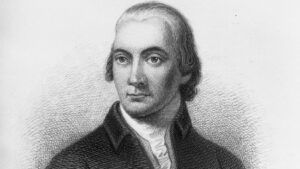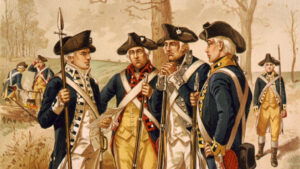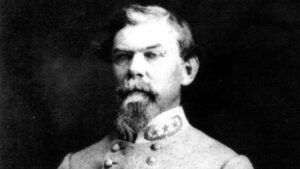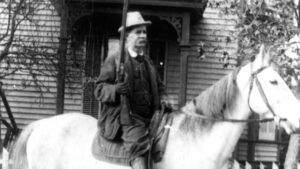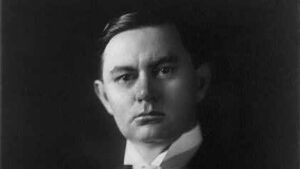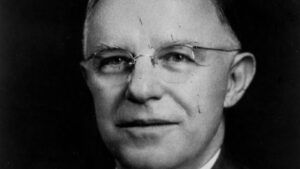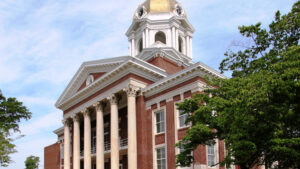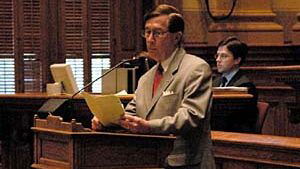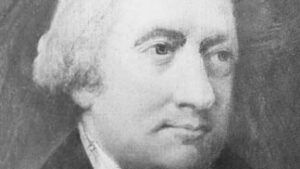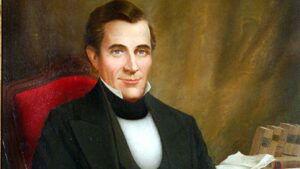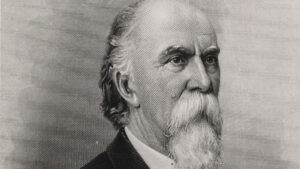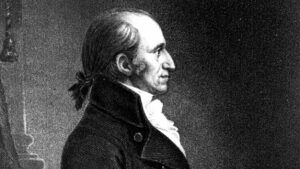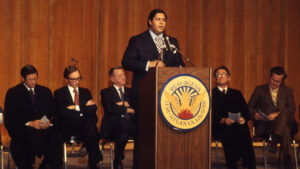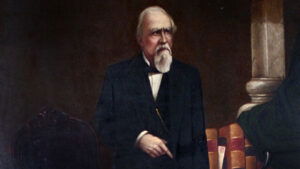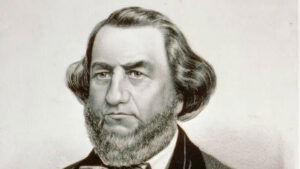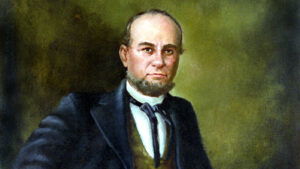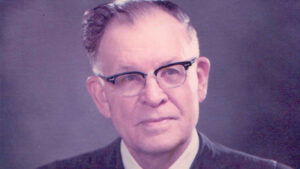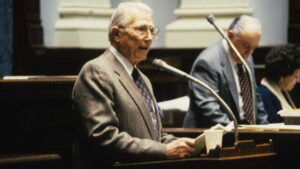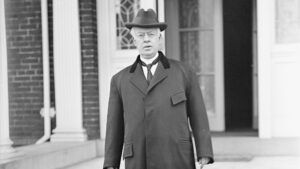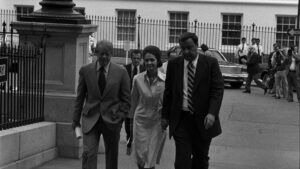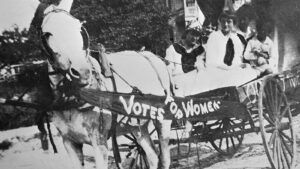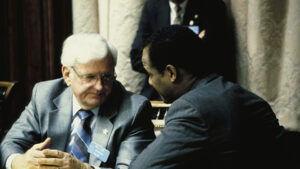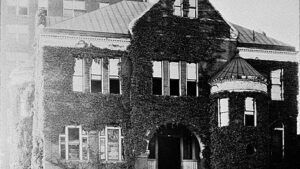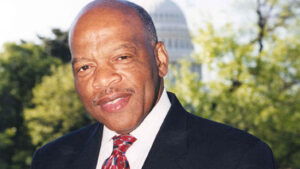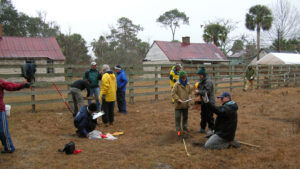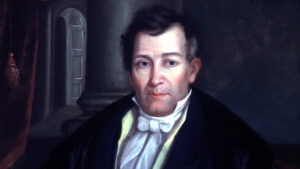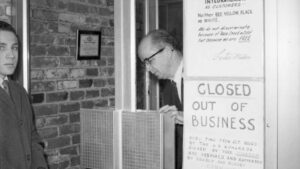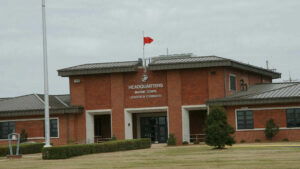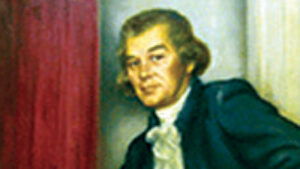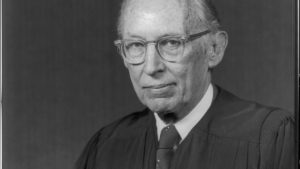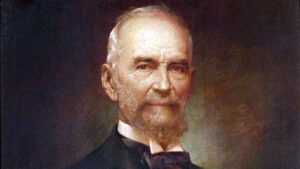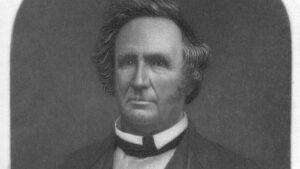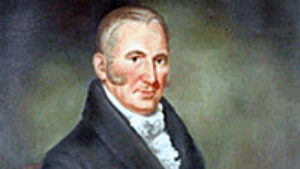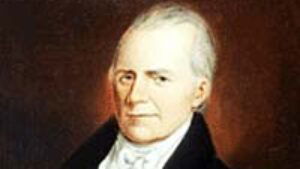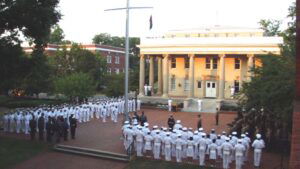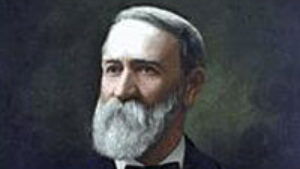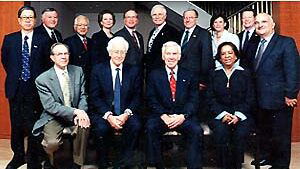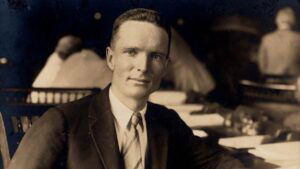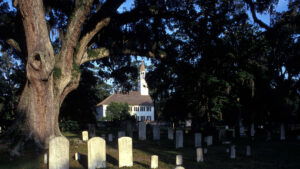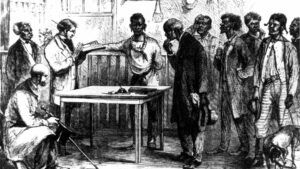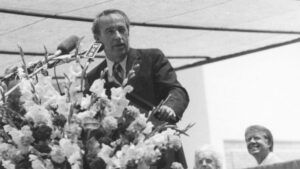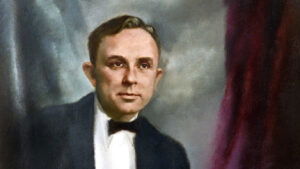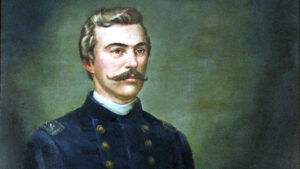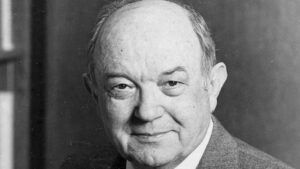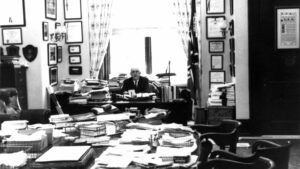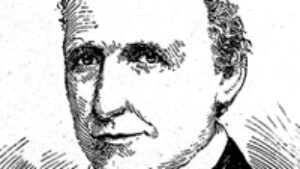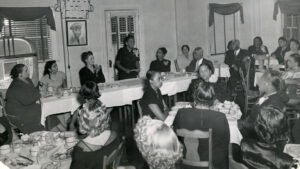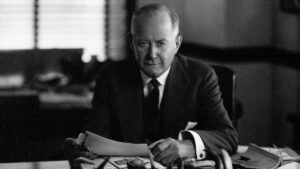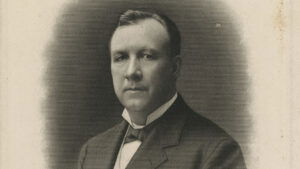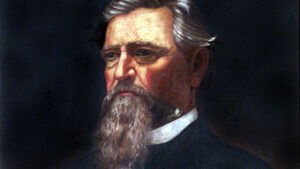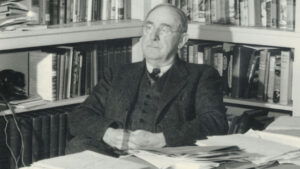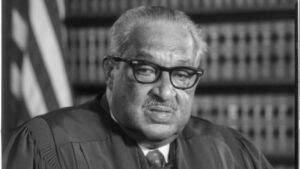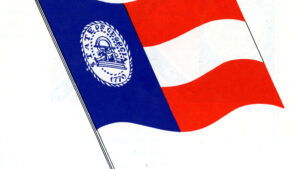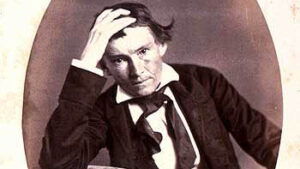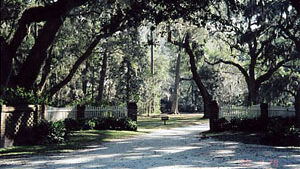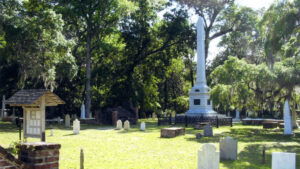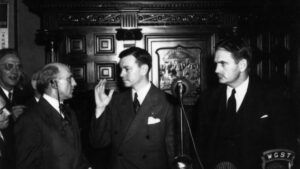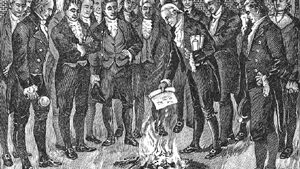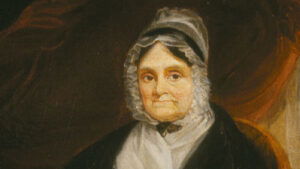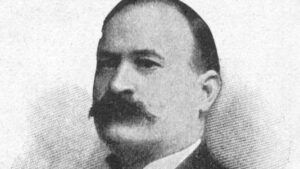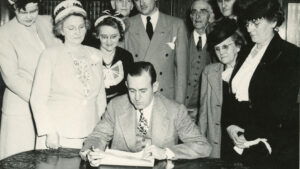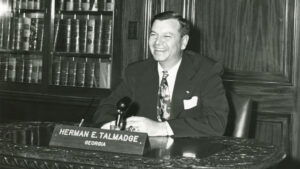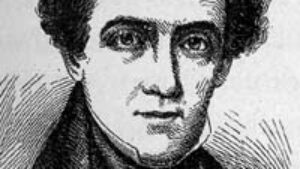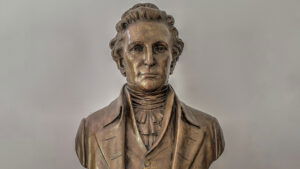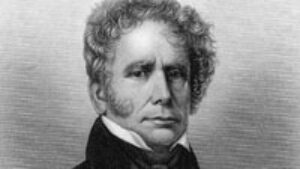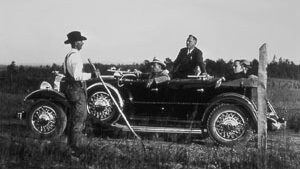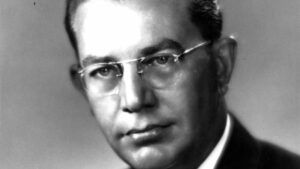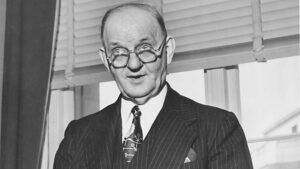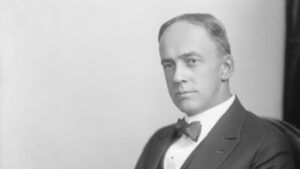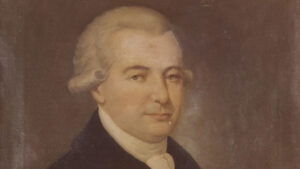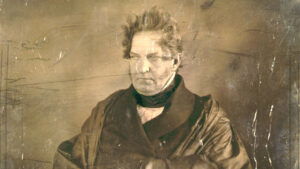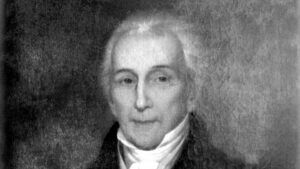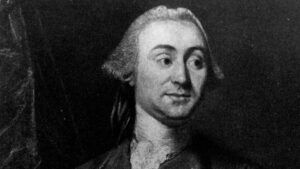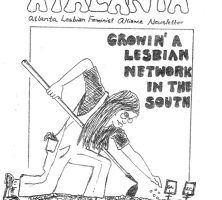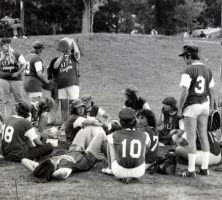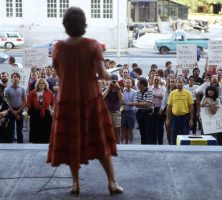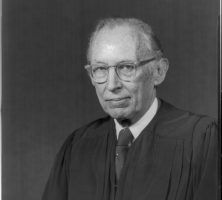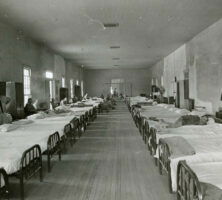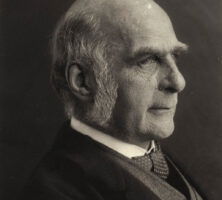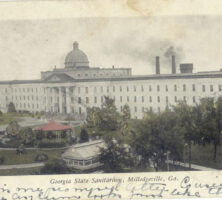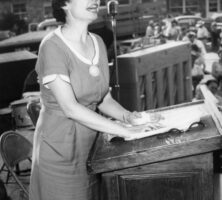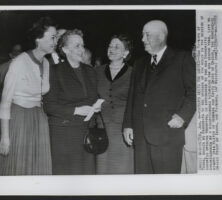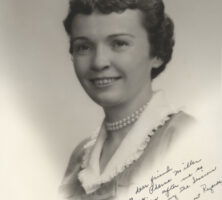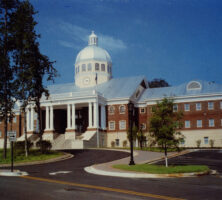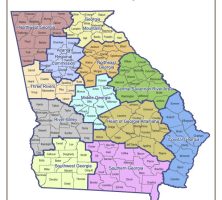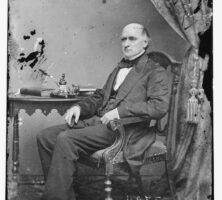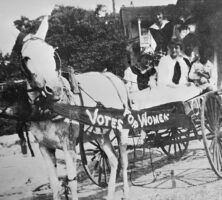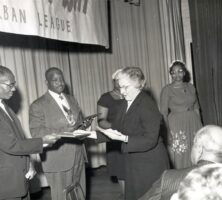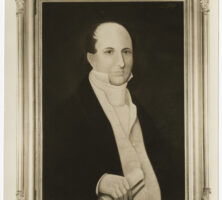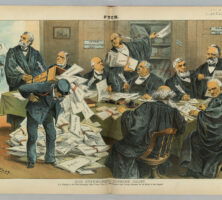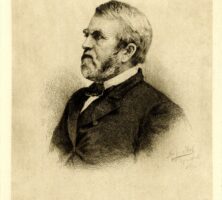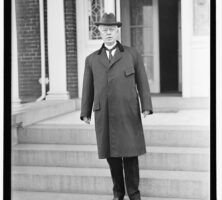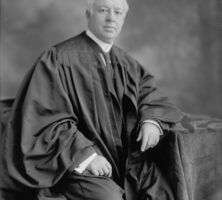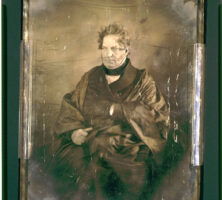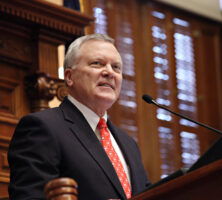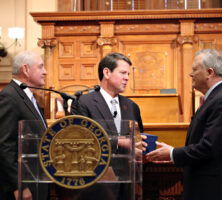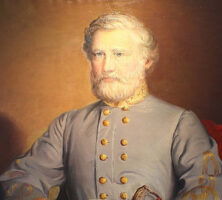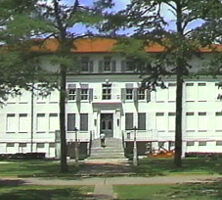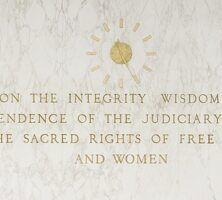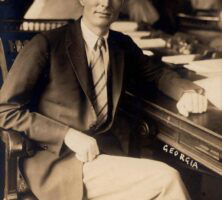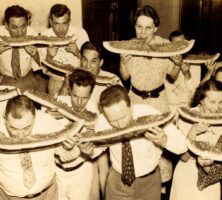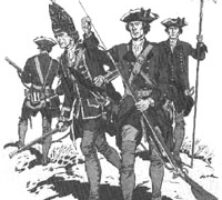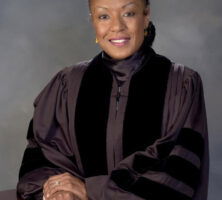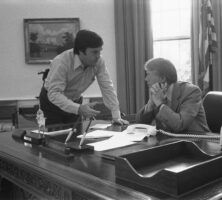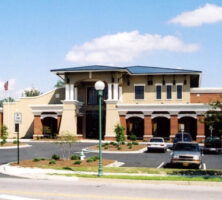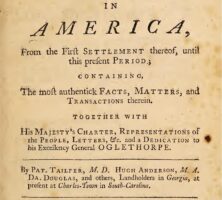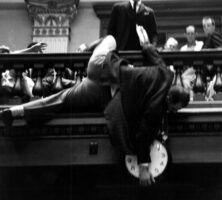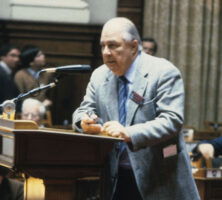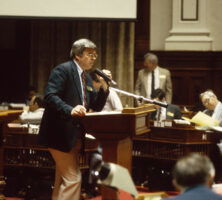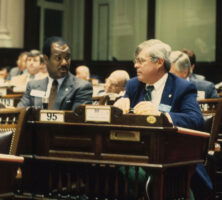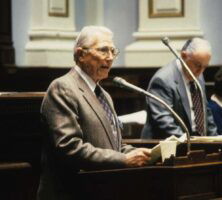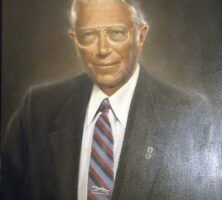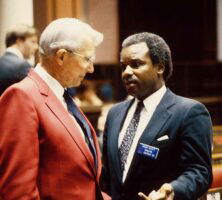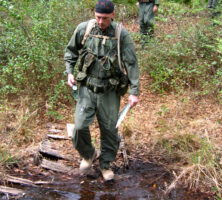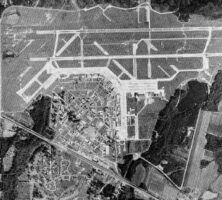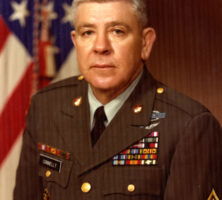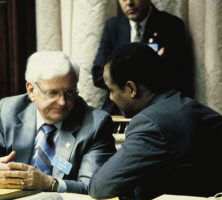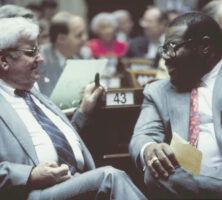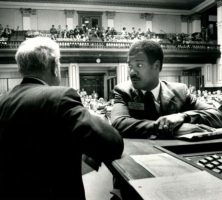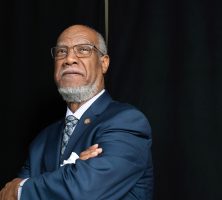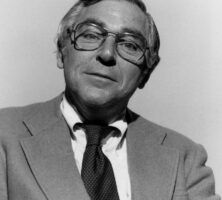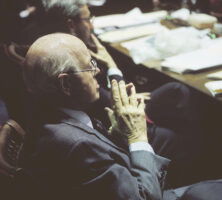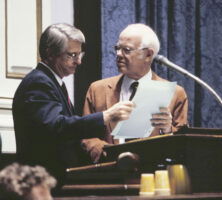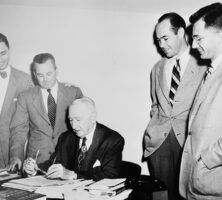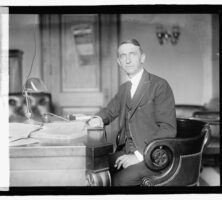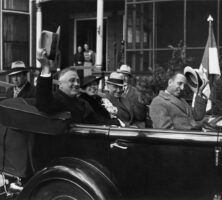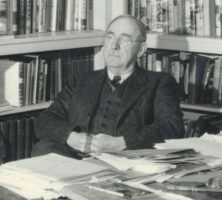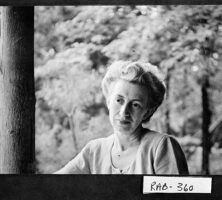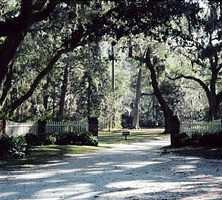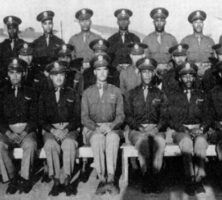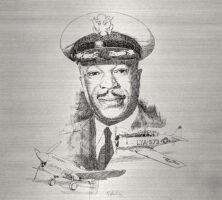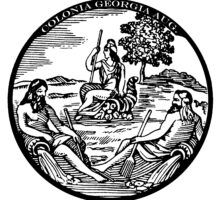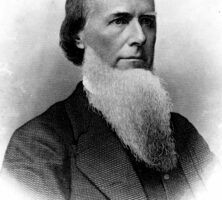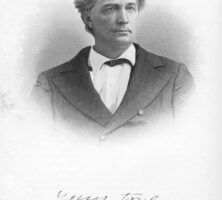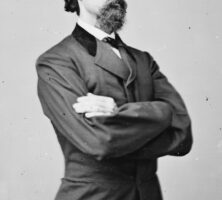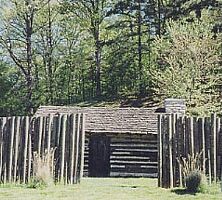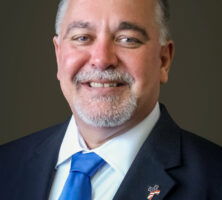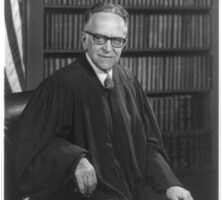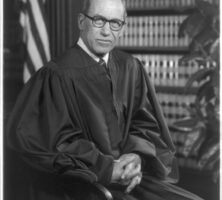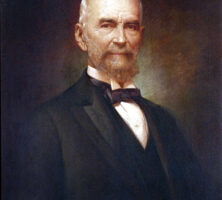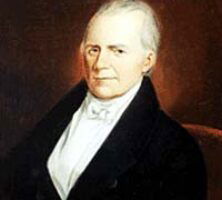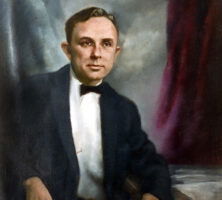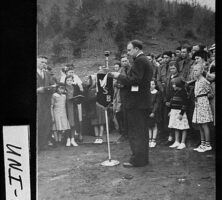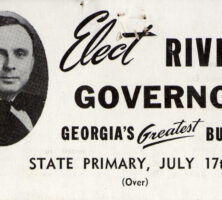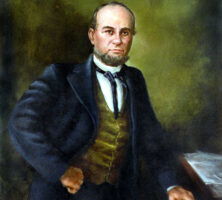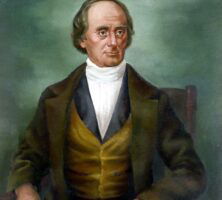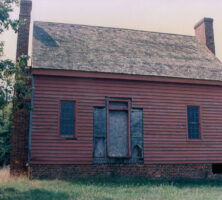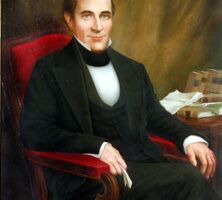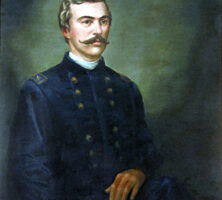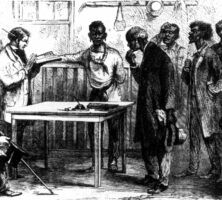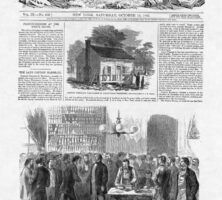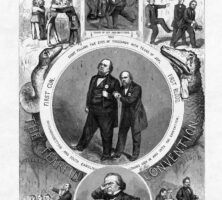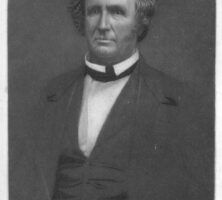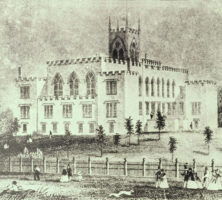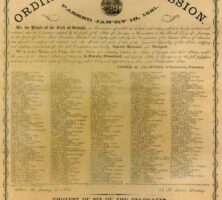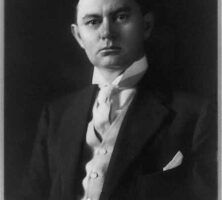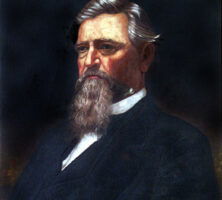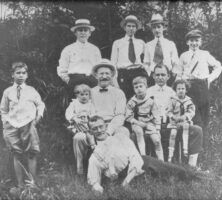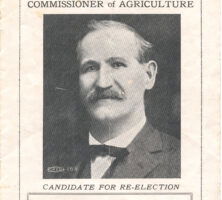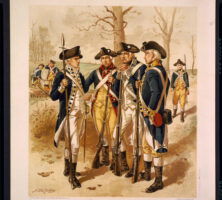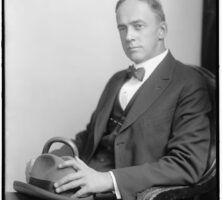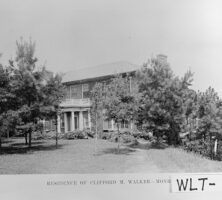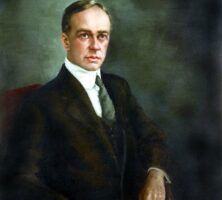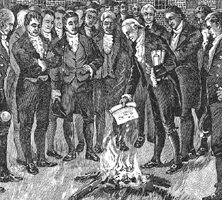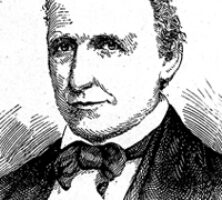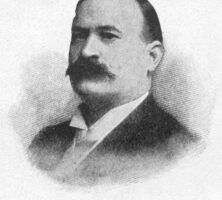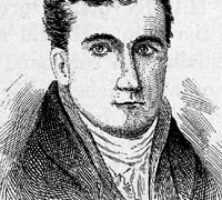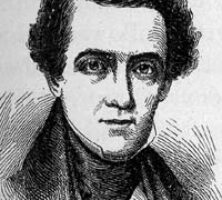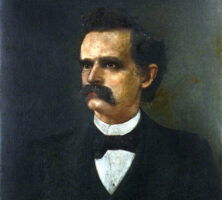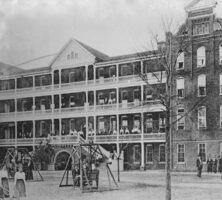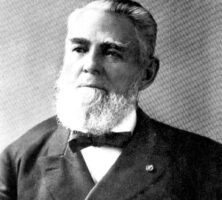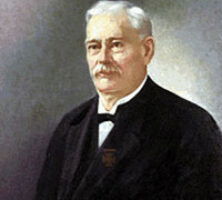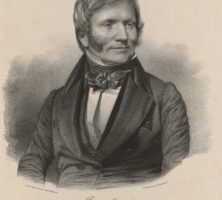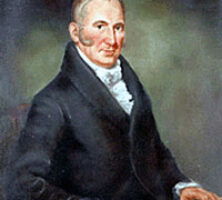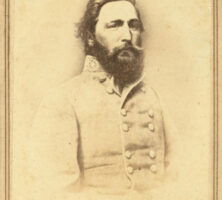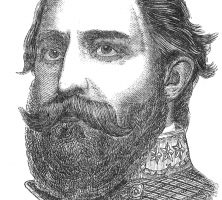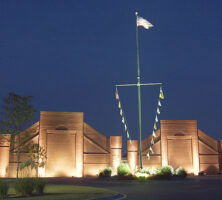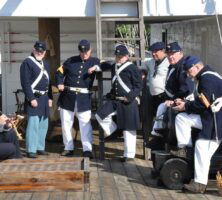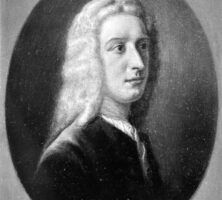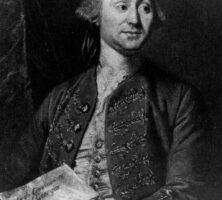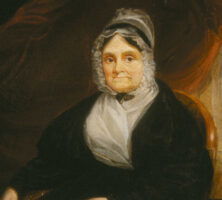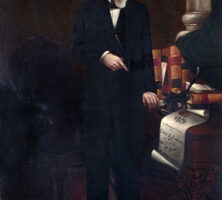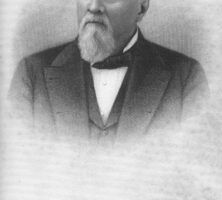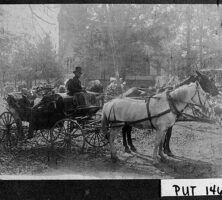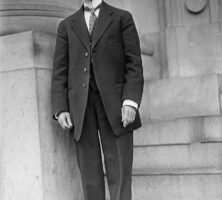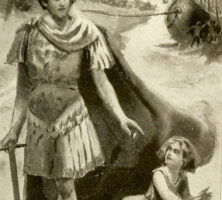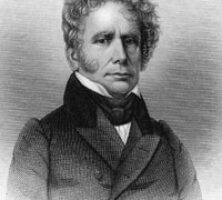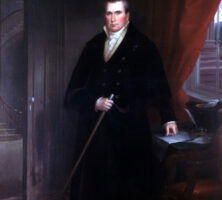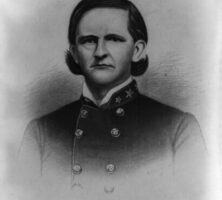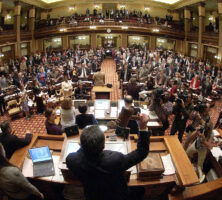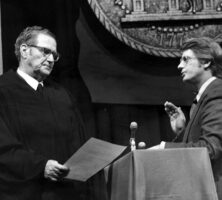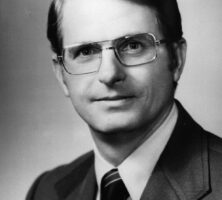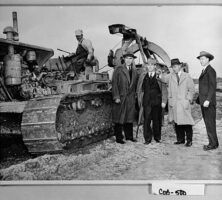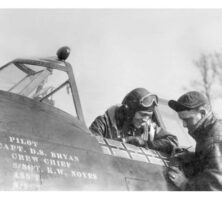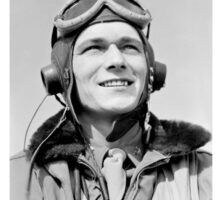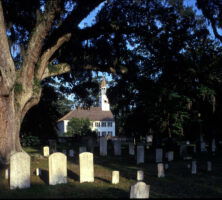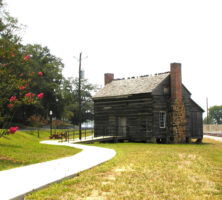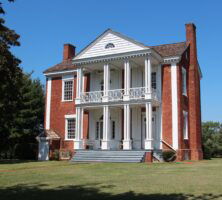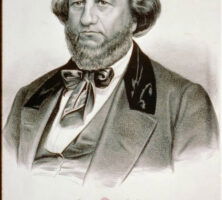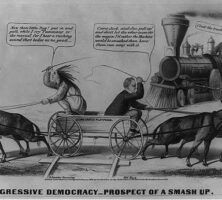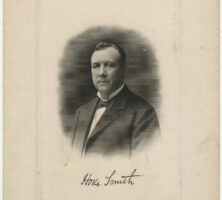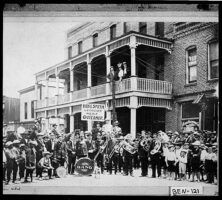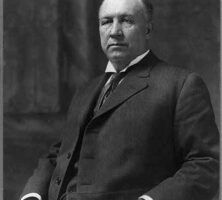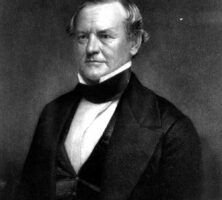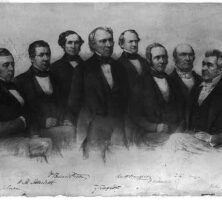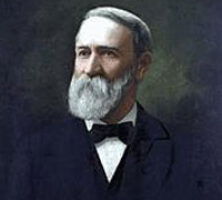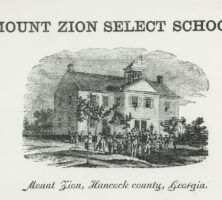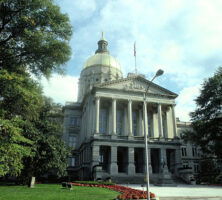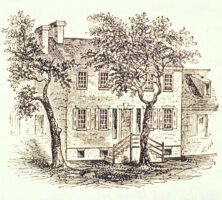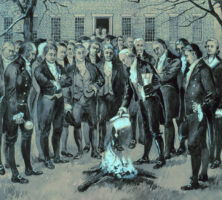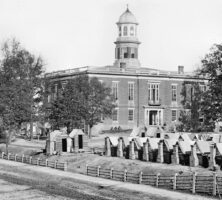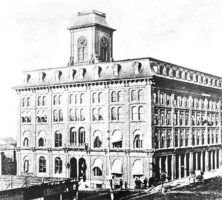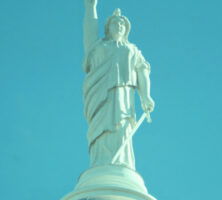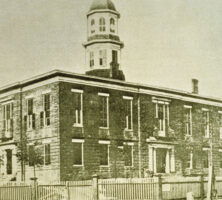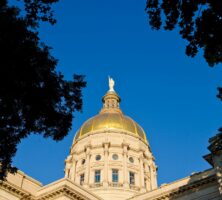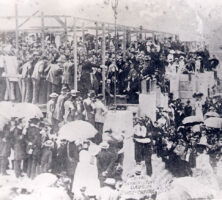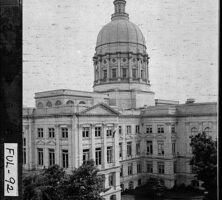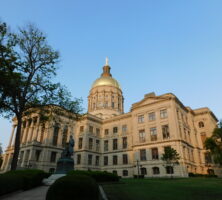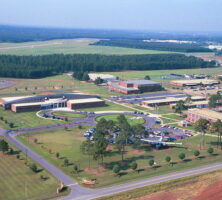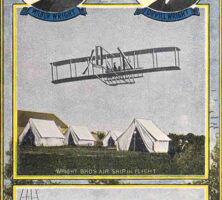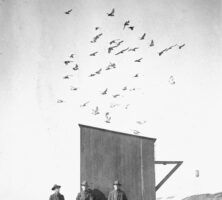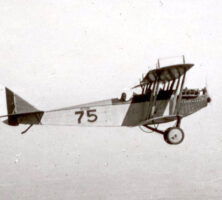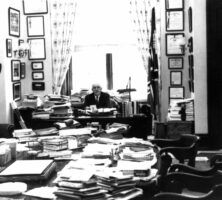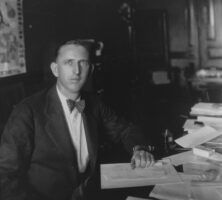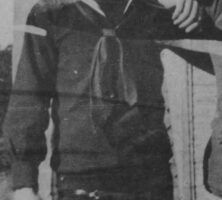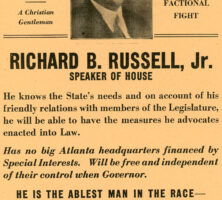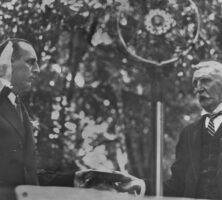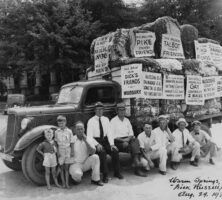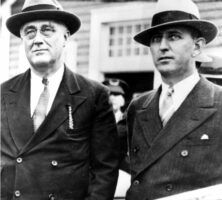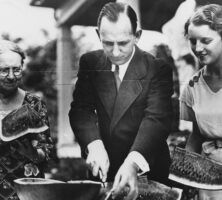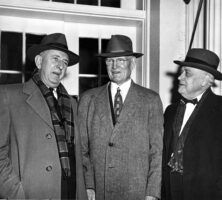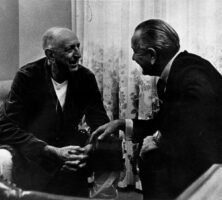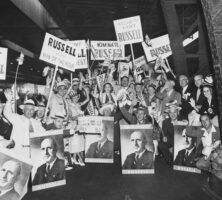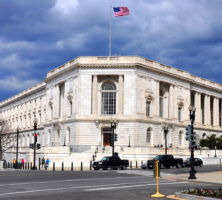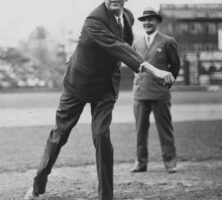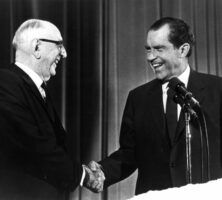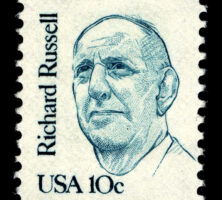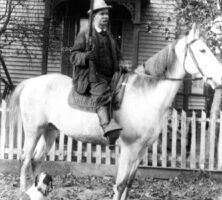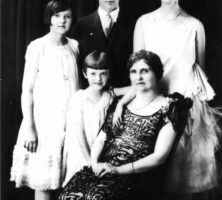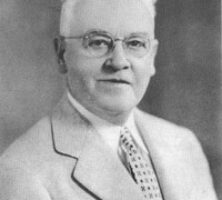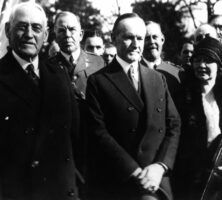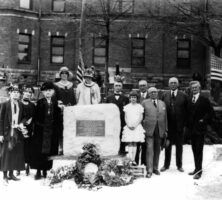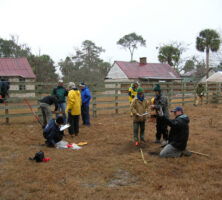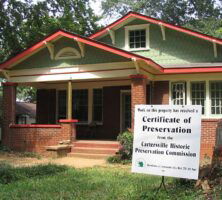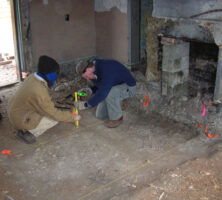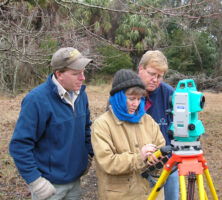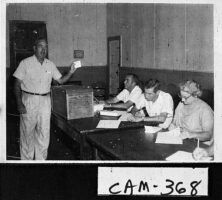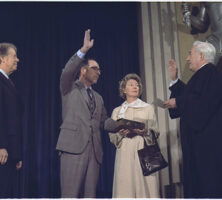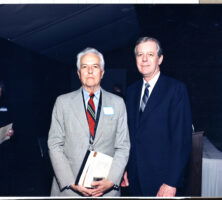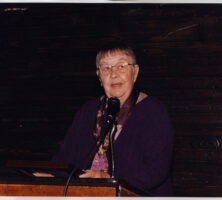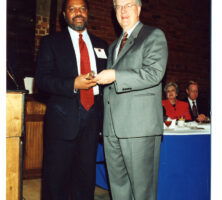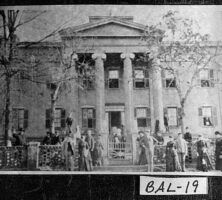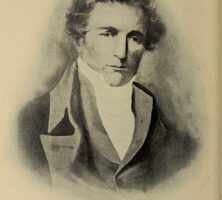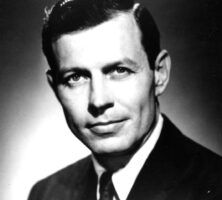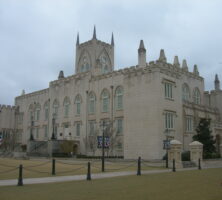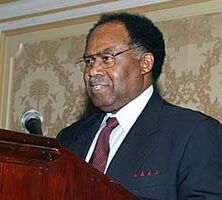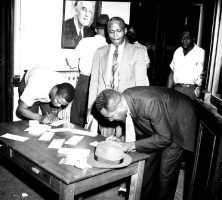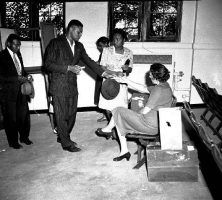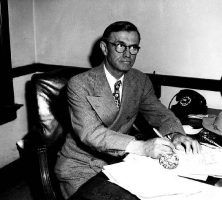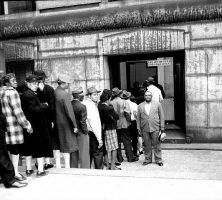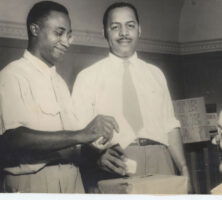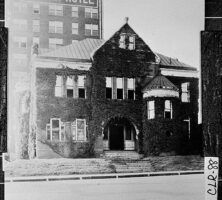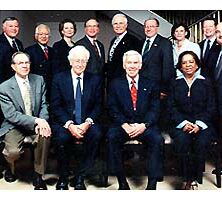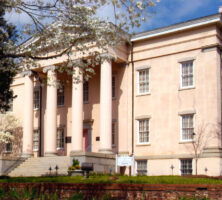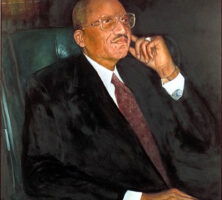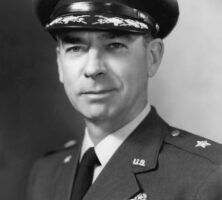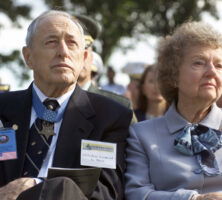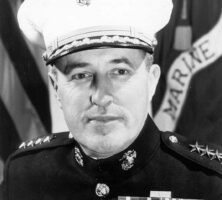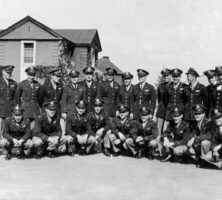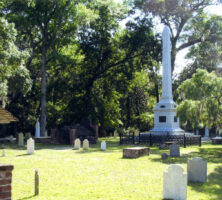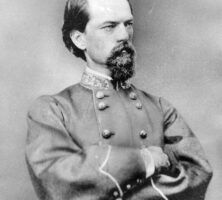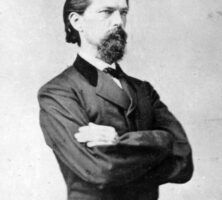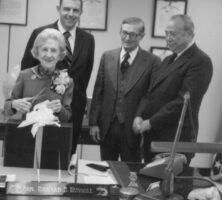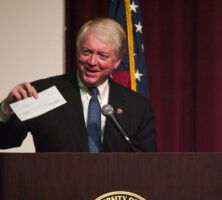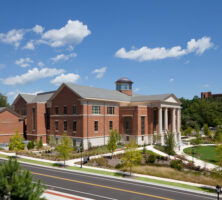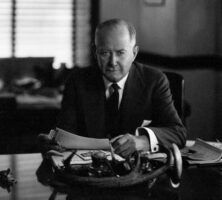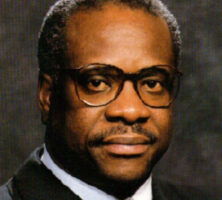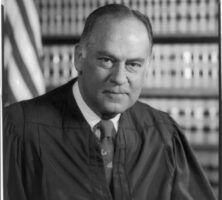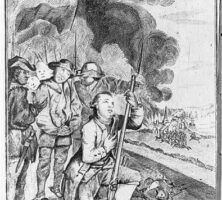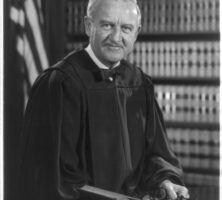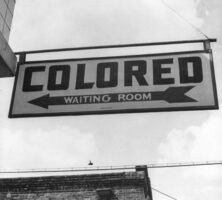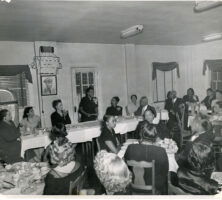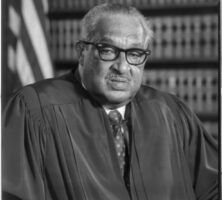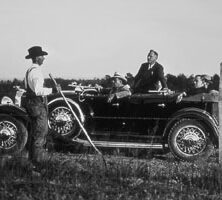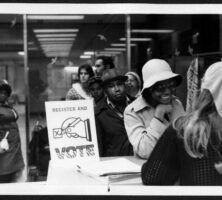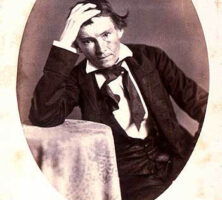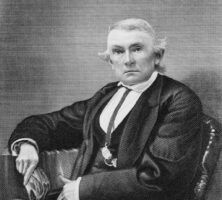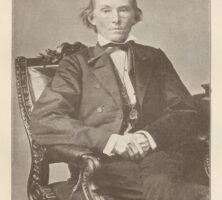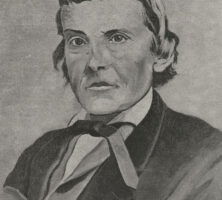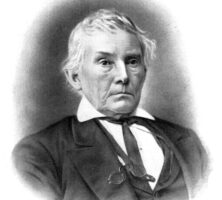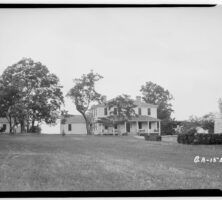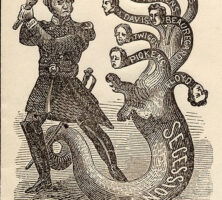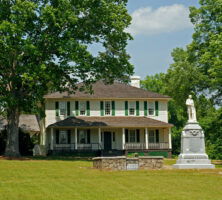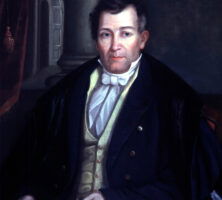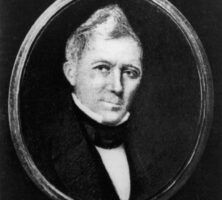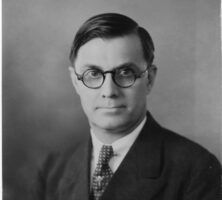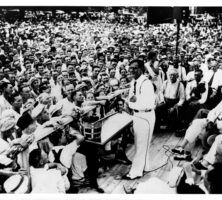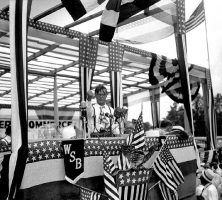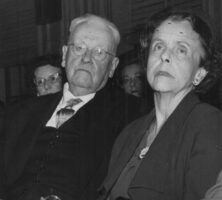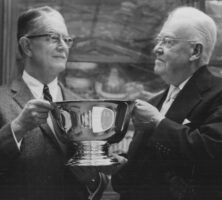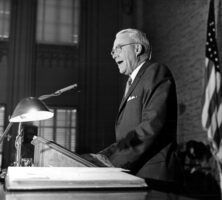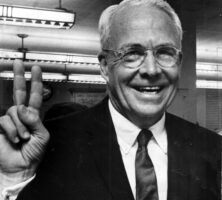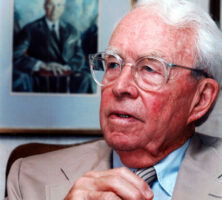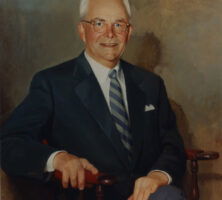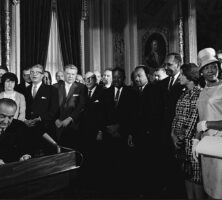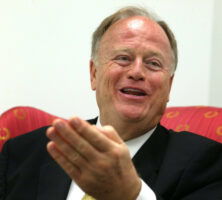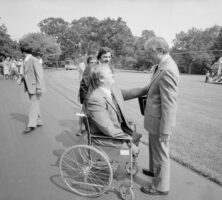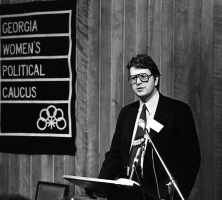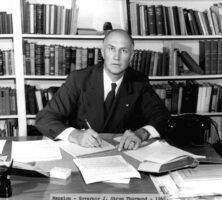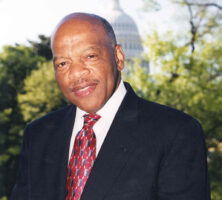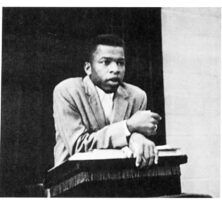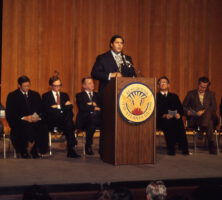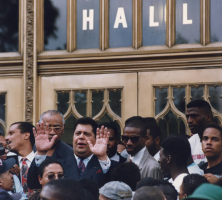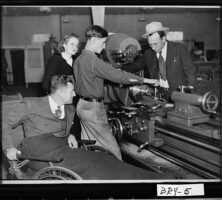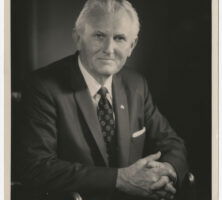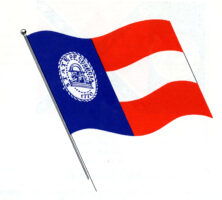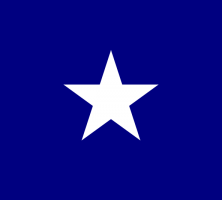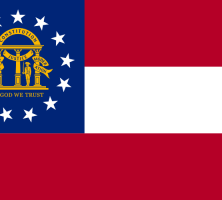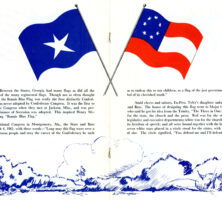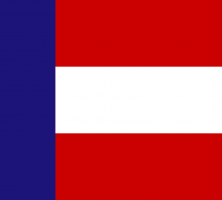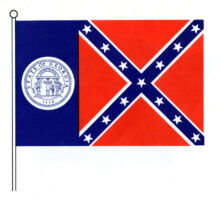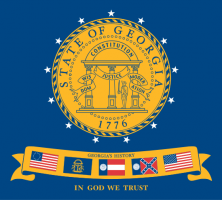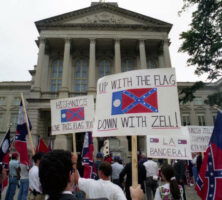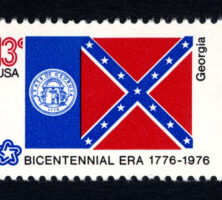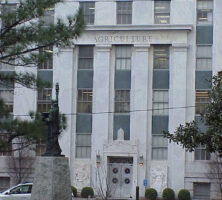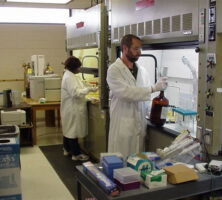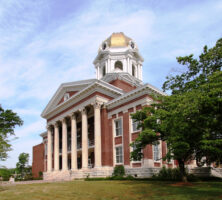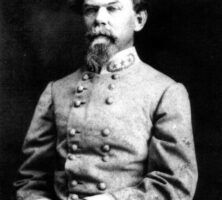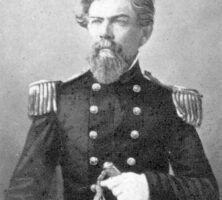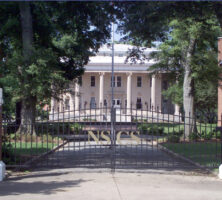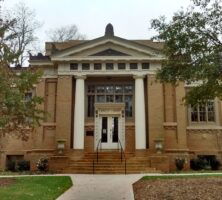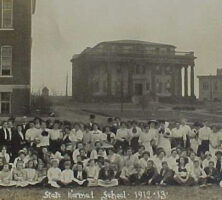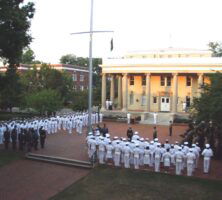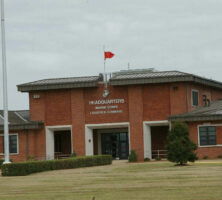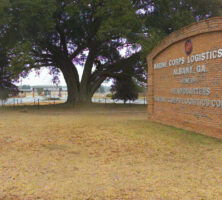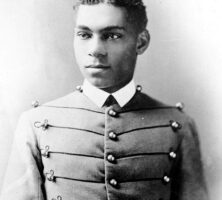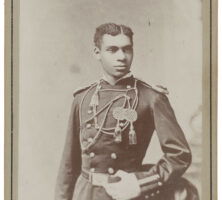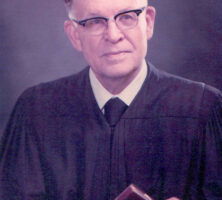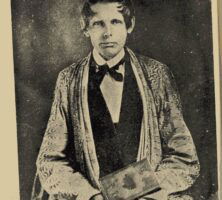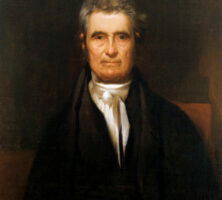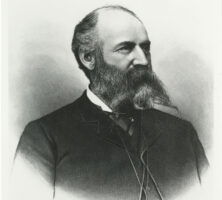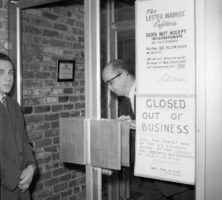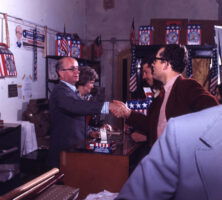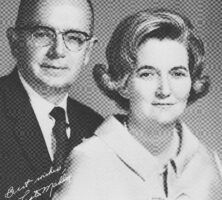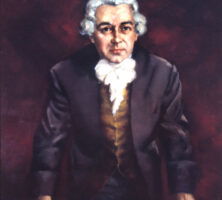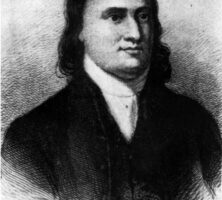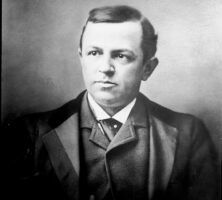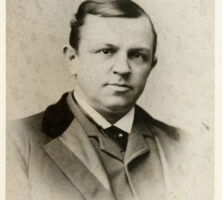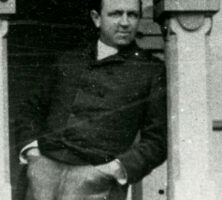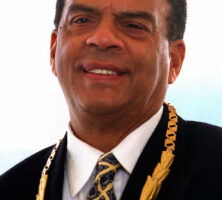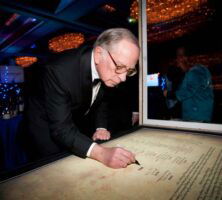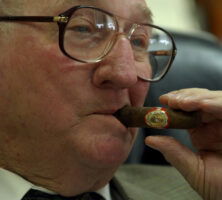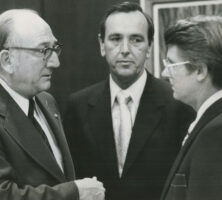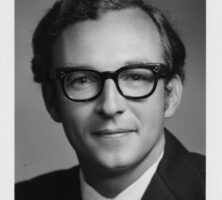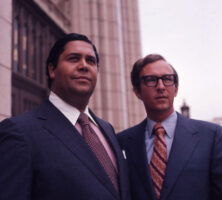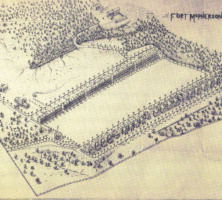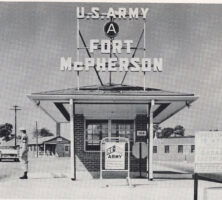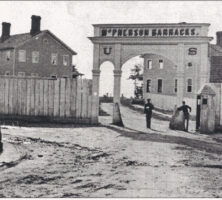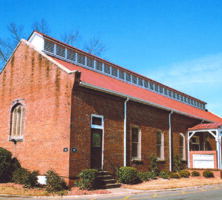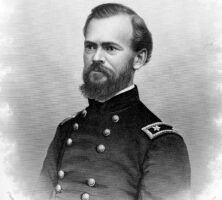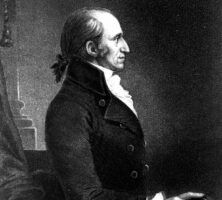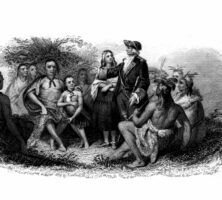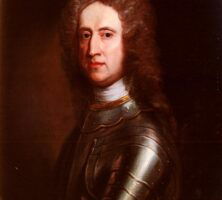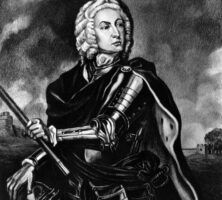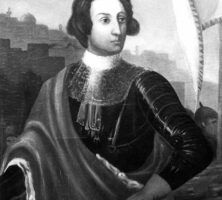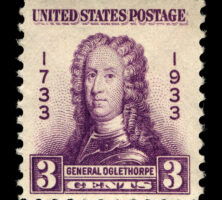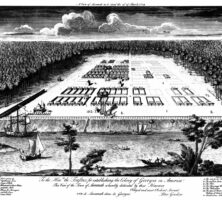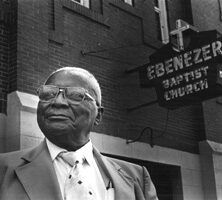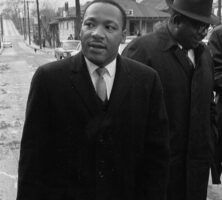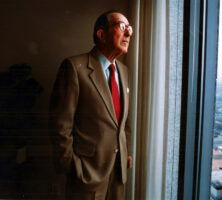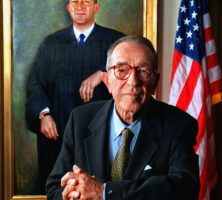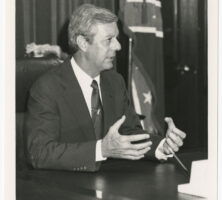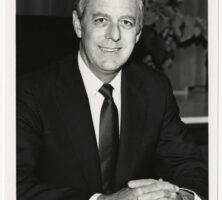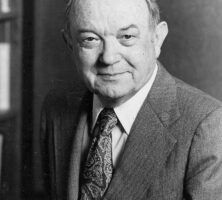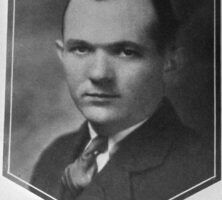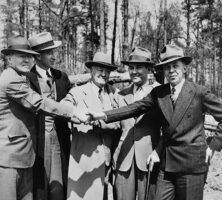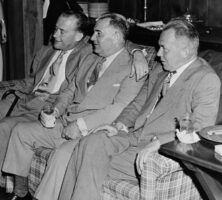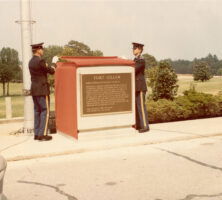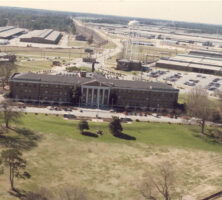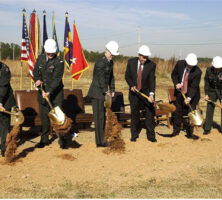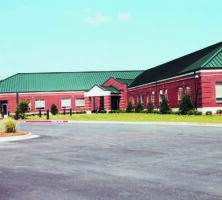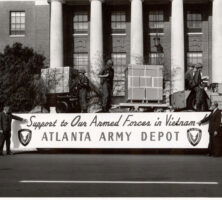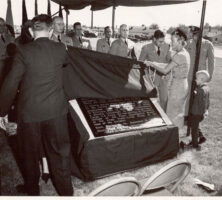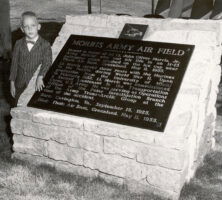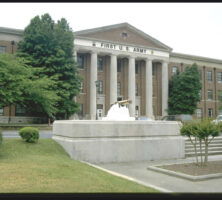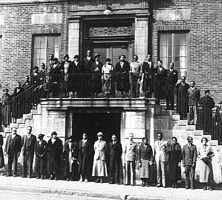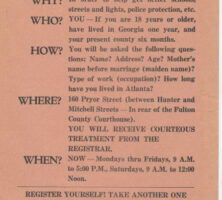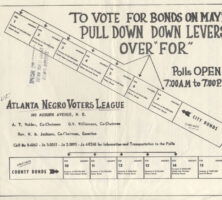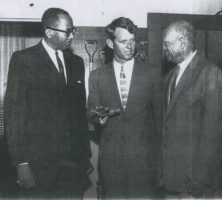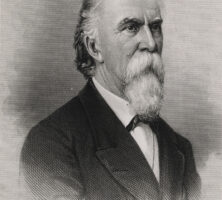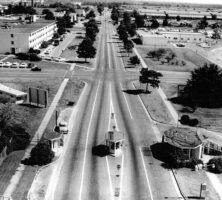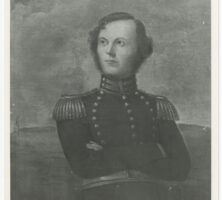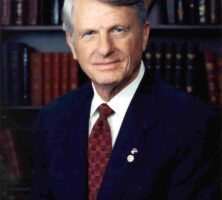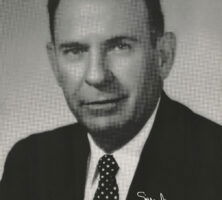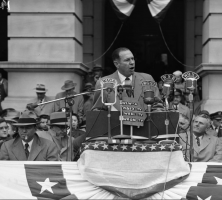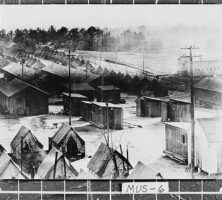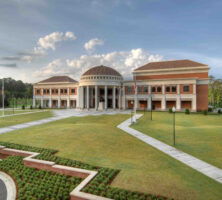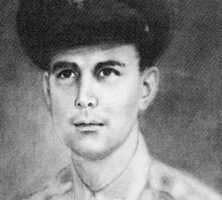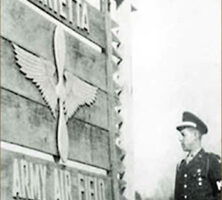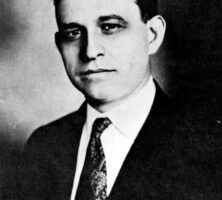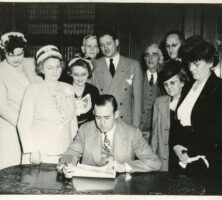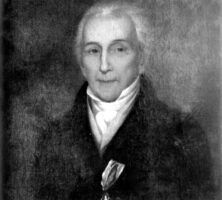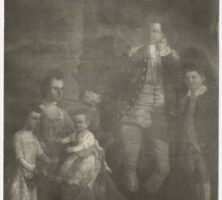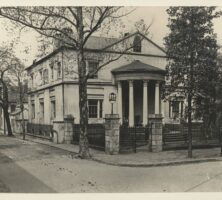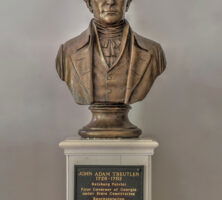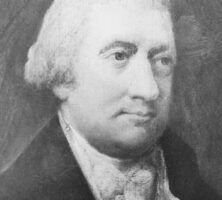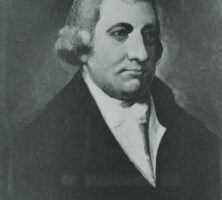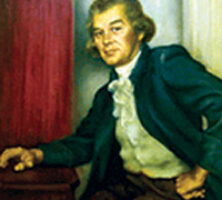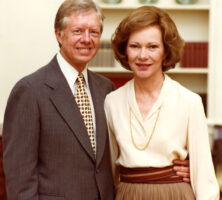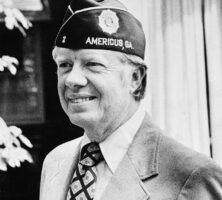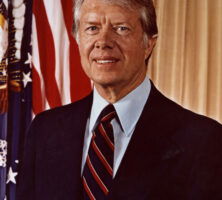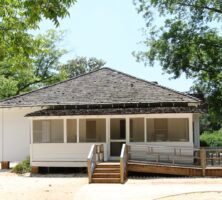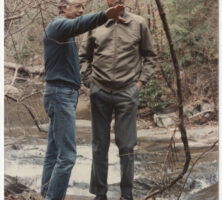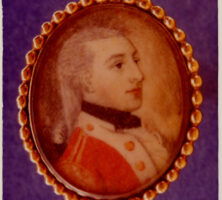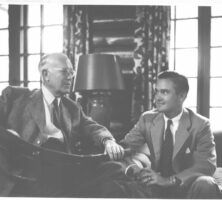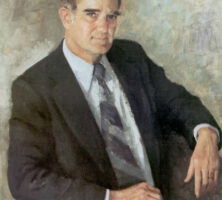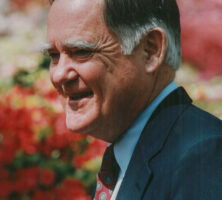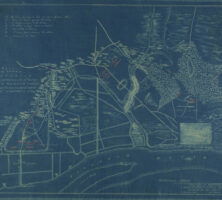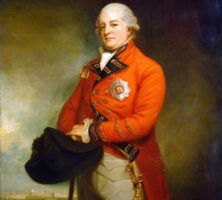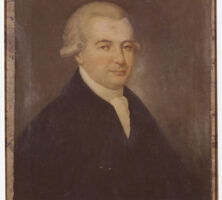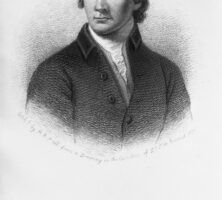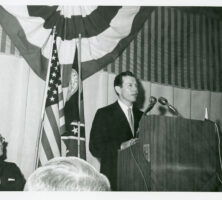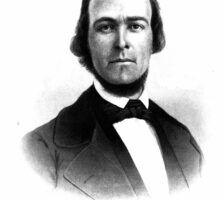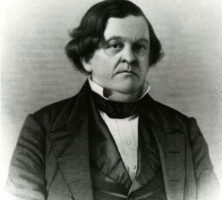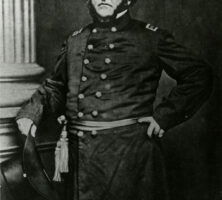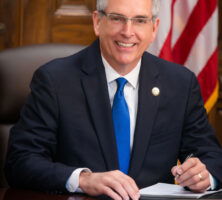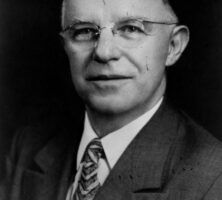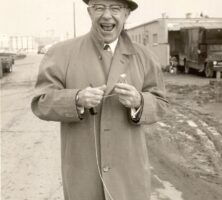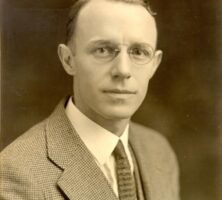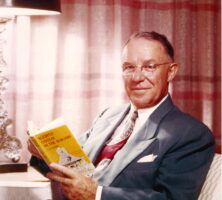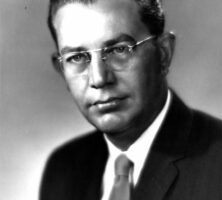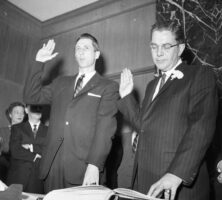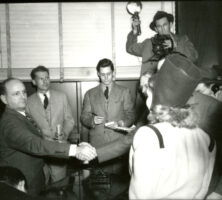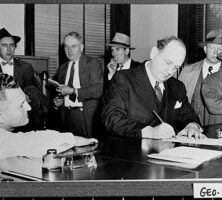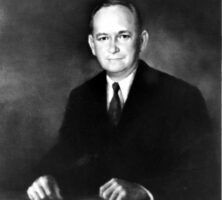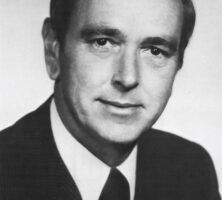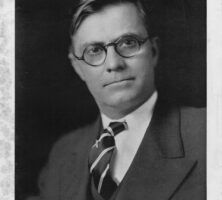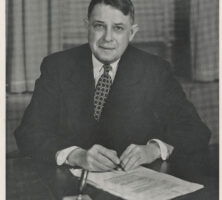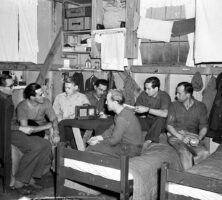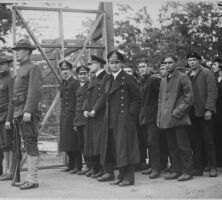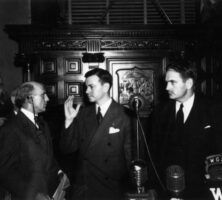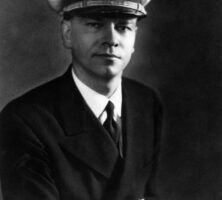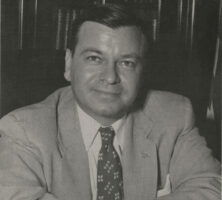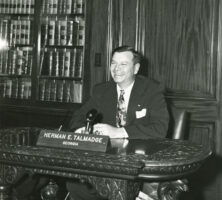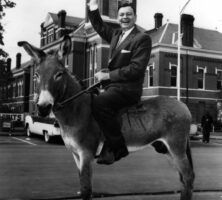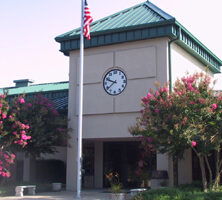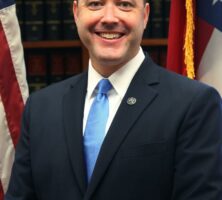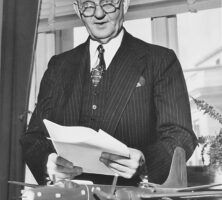The New Georgia Encyclopedia is supported by funding from A More Perfect Union, a special initiative of the National Endowment for the Humanities.
Women of the Atlanta Lesbian Feminist Alliance self-published their own monthly newsletter, Atalanta, named after a huntress from Greek mythology and meaning "equal in weight." They sent the newsletter to other women’s groups so that news of Georgia’s queer life circulated across the nation and other parts of the lesbian world, connecting feminist lesbians in Atlanta to their global sisters.
Courtesy of Atlanta History Center, Atlanta Lesbian Feminist Alliance newsletters.
The New Georgia Encyclopedia does not hold the copyright for this media resource and can neither grant nor deny permission to republish or reproduce the image online or in print. Requests for permission to publish or reproduce the resource should be submitted to the Atlanta History Center.
Perhaps the most important social benefit of the Atlanta Lesbian Feminist Alliance was its softball teams, notably the ALFA Omegas. The team competed nationally and allowed lesbians from Atlanta to build community around the country.
Courtesy of Atlanta History Center, Pamela Parker Photographs.
The New Georgia Encyclopedia does not hold the copyright for this media resource and can neither grant nor deny permission to republish or reproduce the image online or in print. Requests for permission to publish or reproduce the resource should be submitted to the Atlanta History Center.
Supporters of LGBTQ+ rights gather outside the U.S. Supreme Court Building during oral arguments for Bostock v. Clayton County (2020). By a 6-3 majority, the Court ruled that Title VII of the Civil Rights Act of 1964 protects employees against discrimination and unjust termination based on their sexual orientation.
Image from Wikimedia
The New Georgia Encyclopedia does not hold the copyright for this media resource and can neither grant nor deny permission to republish or reproduce the image online or in print. All requests for permission to publish or reproduce the resource must be submitted to the rights holder.
In 2016 Gerald Bostock sued Clayton County for workplace discrimination. His case ultimately reached the U.S. Supreme Court, which ruled that Title VII of the Civil Rights Act protects LGBTQ employees against unjust discrimination and termination.
Image from Wikimedia
The New Georgia Encyclopedia does not hold the copyright for this media resource and can neither grant nor deny permission to republish or reproduce the image online or in print. All requests for permission to publish or reproduce the resource must be submitted to the rights holder.
Michael Hardwick, defendant in the Georgia sodomy case Bowers v. Hardwick, speaking to the Atlanta Business and Professional Guild, Colony Square, Atlanta, Georgia, September 7, 1986.
Courtesy of Special Collections & Archives, Georgia State University Library, Atlanta Journal-Constitution Photographs.
The New Georgia Encyclopedia does not hold the copyright for this media resource and can neither grant nor deny permission to republish or reproduce the image online or in print. Requests for permission to publish or reproduce the resource should be submitted to Special Collections and Archives at Georgia State University.
Kathy Wilde, attorney for Michael Hardwick, speaking at a gay rights demonstration in the wake of the U.S. Supreme Court decision for Bowers v. Hardwick (Georgia sodomy law case), Richard B. Russell Federal Building, Atlanta, Georgia, July 3, 1986
Courtesy of Special Collections & Archives, Georgia State University Library, Atlanta Journal-Constitution Photographs.
The New Georgia Encyclopedia does not hold the copyright for this media resource and can neither grant nor deny permission to republish or reproduce the image online or in print. Requests for permission to publish or reproduce the resource should be submitted to Special Collections and Archives at Georgia State University.
Lewis F. Powell Jr., pictured in 1976, served as a justice on the U.S. Supreme Court from 1972 until 1987.
Courtesy of Library of Congress, Prints and Photographs Division
The New Georgia Encyclopedia does not hold the copyright for this media resource and can neither grant nor deny permission to republish or reproduce the image online or in print. All requests for permission to publish or reproduce the resource must be submitted to the rights holder.
A sleeping ward at Milledgeville State Hospital for the Insane, circa 1940. Authorities at the hospital practiced compulsory sterilization of patients throughout the 1940s and 1950s. Following an award-winning 1959 report by Atlanta Constitution Jack Nelson, the number of operations dropped dramatically before finally ceasing in 1963.
Courtesy of Special Collections & Archives, Georgia State University Library, Atlanta Journal-Constitution Photographic Archive .
The New Georgia Encyclopedia does not hold the copyright for this media resource and can neither grant nor deny permission to republish or reproduce the image online or in print. Requests for permission to publish or reproduce the resource should be submitted to Special Collections and Archives at Georgia State University.
Francis Galton was an English statistician whose theories on heredity lead him to develop the field of eugenics. During the early twentieth century, Galton's ideas gained support among scientific and medical professionals, politicians, and Progressive-era reform groups.
Image from Eveleen Myers
The New Georgia Encyclopedia does not hold the copyright for this media resource and can neither grant nor deny permission to republish or reproduce the image online or in print. All requests for permission to publish or reproduce the resource must be submitted to the rights holder.
This tinted postcard of the Georgia State Sanitarium (later Central State Hospital) depicts the grounds of the institution circa 1905. During this time the hospital was under the leadership of Theophilus O. Powell, who implemented more precise methods of diagnosis.
Courtesy of Melinda Smith Mullikin, New Georgia Encyclopedia
The New Georgia Encyclopedia does not hold the copyright for this media resource and can neither grant nor deny permission to republish or reproduce the image online or in print. All requests for permission to publish or reproduce the resource must be submitted to the rights holder.
The New Georgia Encyclopedia does not hold the copyright for this media resource and can neither grant nor deny permission to republish or reproduce the image online or in print. All requests for permission to publish or reproduce the resource must be submitted to the rights holder.
Iris Blitch, pictured here speaking in Jesup in Wayne County, broke ground for female politicians in the 1950s and 1960s. When she was first elected in 1948, she was the only female legislator in the state.
Courtesy of Atlanta Journal-Constitution.
The New Georgia Encyclopedia does not hold the copyright for this media resource and can neither grant nor deny permission to republish or reproduce the image online or in print. All requests for permission to publish or reproduce the resource must be submitted to the Atlanta Journal-Constitution.
Iris Blitch, far left, greets U.S. House Sepaker Sam Rayburn. Blitch and Edith Green of Oregon, second from left, were newly elected congresswomen in 1955. The Eighty-Fourth U.S. Congress had seventeen women.
Courtesy of the Collection of the U.S. House of Representatives
The New Georgia Encyclopedia does not hold the copyright for this media resource and can neither grant nor deny permission to republish or reproduce the image online or in print. All requests for permission to publish or reproduce the resource must be submitted to the rights holder.
Iris Blitch, pictured here circa 1955, won her first congressional election in 1954, after unseating U.S. representative William McDonald "Don" Wheeler. She served the Eighth Congressional District of Georgia from 1955 to to 1963.
Courtesy of the Collection of the U.S. House of Representatives
The New Georgia Encyclopedia does not hold the copyright for this media resource and can neither grant nor deny permission to republish or reproduce the image online or in print. All requests for permission to publish or reproduce the resource must be submitted to the rights holder.
Roswell, originally located in Cobb County, lies twenty miles north of Atlanta on the Chattahoochee River. Annexed to Fulton County in 1932, the city today is part of the Atlanta Regional Commission, a member of the Georgia Association of Regional Commissions.
Photograph by Jerry Joiner
The New Georgia Encyclopedia does not hold the copyright for this media resource and can neither grant nor deny permission to republish or reproduce the image online or in print. All requests for permission to publish or reproduce the resource must be submitted to the rights holder.
Georgia is divided into twelve regional commissions, which function as multicounty planning and development agencies.
Courtesy of Georgia Association of Regional Commissions
The New Georgia Encyclopedia does not hold the copyright for this media resource and can neither grant nor deny permission to republish or reproduce the image online or in print. All requests for permission to publish or reproduce the resource must be submitted to the rights holder.
John Archibald Campbell, a native of Wilkes County, served on the U.S. Supreme Court from 1853 until the outbreak of the Civil War in 1861.
Courtesy of Library of Congress, Prints and Photographs Division
The New Georgia Encyclopedia does not hold the copyright for this media resource and can neither grant nor deny permission to republish or reproduce the image online or in print. All requests for permission to publish or reproduce the resource must be submitted to the rights holder.
Women in Gwinnett County demonstrate in favor of the Nineteenth Amendment to the U.S. Constitution, which guaranteed women the right to vote. The amendment passed in 1920.
Courtesy of Georgia Archives, Vanishing Georgia, # gwn151b.
The New Georgia Encyclopedia does not hold the copyright for this media resource and can neither grant nor deny permission to republish or reproduce the image online or in print. Requests for permission to publish or reproduce the resource should be submitted to the Georgia Archives.
Frances Pauley attends a banquet of the Atlanta branch of the Urban League (AUL) in 1961. Pauley served on the board of the AUL and was president of the Georgia League of Women Voters during the 1950s.
The New Georgia Encyclopedia does not hold the copyright for this media resource and can neither grant nor deny permission to republish or reproduce the image online or in print. For more information about this resource, contact the Stuart A. Rose Manuscript, Archives, and Rare Book Library at Emory University.
At the end of the 1820s Augustin Smith Clayton of Athens constructed a cotton mill near his hometown, hoping to prove the protective tariff that subsidized northern industry at the expense of southerners unnecessary.
Courtesy of Hargrett Rare Book and Manuscript Library, University of Georgia Libraries, Georgia Photo File.
The New Georgia Encyclopedia does not hold the copyright for this media resource and can neither grant nor deny permission to republish or reproduce the image online or in print. Requests for permission to publish or reproduce the resource should be submitted to the Hargrett Manuscript and Rare Book Library at the University of Georgia.
The New Georgia Encyclopedia does not hold the copyright for this media resource and can neither grant nor deny permission to republish or reproduce the image online or in print. All requests for permission to publish or reproduce the resource must be submitted to the rights holder.
Published in 1885, the print Our Overworked Supreme Court depicts Supreme Court justices Woods, Blatchford, Harlan, Gray, Miller, Field, Waite, Bradley, and Matthews surrounded by paperwork for cases.
Courtesy of Library of Congress, Prints and Photographs Division
The New Georgia Encyclopedia does not hold the copyright for this media resource and can neither grant nor deny permission to republish or reproduce the image online or in print. All requests for permission to publish or reproduce the resource must be submitted to the rights holder.
William Burnham Woods, a native of Ohio, was a resident of Atlanta when he was appointed to the U.S. Supreme Court in 1881. He served on the Court until his death in 1887.
Courtesy of British Museum, London
The New Georgia Encyclopedia does not hold the copyright for this media resource and can neither grant nor deny permission to republish or reproduce the image online or in print. All requests for permission to publish or reproduce the resource must be submitted to the rights holder.
Joseph Rucker Lamar, a native of Elbert County, served as a justice on the U.S. Supreme Court from 1911 to 1915.
Courtesy of Library of Congress, Prints and Photographs Division
The New Georgia Encyclopedia does not hold the copyright for this media resource and can neither grant nor deny permission to republish or reproduce the image online or in print. All requests for permission to publish or reproduce the resource must be submitted to the rights holder.
Joseph Rucker Lamar, a native of Elbert County, served as a justice on the U.S. Supreme Court from 1911 to 1915.
Courtesy of Library of Congress, Prints and Photographs Division
The New Georgia Encyclopedia does not hold the copyright for this media resource and can neither grant nor deny permission to republish or reproduce the image online or in print. All requests for permission to publish or reproduce the resource must be submitted to the rights holder.
James Moore Wayne, pictured circa 1850, was a Savannah native and the first Georgian appointed to the U.S. Supreme Court. He served as a justice from 1835 to 1867, one of the longest tenures in the Court's history.
Courtesy of Library of Congress, Prints and Photographs Division
The New Georgia Encyclopedia does not hold the copyright for this media resource and can neither grant nor deny permission to republish or reproduce the image online or in print. All requests for permission to publish or reproduce the resource must be submitted to the rights holder.
Governor Nathan Deal, elected in 2010, delivers the State of the State address in January 2011. Deal served as governor from 2011 to 2019.
Courtesy of georgia.gov
The New Georgia Encyclopedia does not hold the copyright for this media resource and can neither grant nor deny permission to republish or reproduce the image online or in print. All requests for permission to publish or reproduce the resource must be submitted to the rights holder.
Nathan Deal (right) was sworn in as Georgia's eighty-second governor on January 10, 2011, in Atlanta. He is pictured with his predecessor, Governor Sonny Perdue (left), and Georgia secretary of state Brian Kemp. Deal served as governor from 2011 to 2019.
Courtesy of Georgia.gov
The New Georgia Encyclopedia does not hold the copyright for this media resource and can neither grant nor deny permission to republish or reproduce the image online or in print. All requests for permission to publish or reproduce the resource must be submitted to the rights holder.
Henry L. Benning was an influential advocate for secession and helped to draft Georgia's Ordinance of Secession.
Courtesy of Georgia Info, Digital Library of Georgia.
The New Georgia Encyclopedia does not hold the copyright for this media resource and can neither grant nor deny permission to republish or reproduce the image online or in print. Requests for permission to publish or reproduce the resource may need to be submitted to the Digital Library of Georgia.
The New Georgia Encyclopedia does not hold the copyright for this media resource and can neither grant nor deny permission to republish or reproduce the image online or in print. All requests for permission to publish or reproduce the resource must be submitted to the rights holder.
Fort Benning, home of the U.S. Army Infantry, comprises nearly 120,000 acres in Chattahoochee County.
Courtesy of Fort Benning
The New Georgia Encyclopedia does not hold the copyright for this media resource and can neither grant nor deny permission to republish or reproduce the image online or in print. All requests for permission to publish or reproduce the resource must be submitted to the rights holder.
The motto of the Court of Appeals of Georgia was engraved into the wall of its former courtroom in the State Judicial Building in Atlanta. Fifteen judges serve on the Court of Appeals, which was established in 1906 to ease the caseload of the Supreme Court of Georgia.
Photograph by S. Sean Barrett
The New Georgia Encyclopedia does not hold the copyright for this media resource and can neither grant nor deny permission to republish or reproduce the image online or in print. All requests for permission to publish or reproduce the resource must be submitted to the rights holder.
Hugh Peterson, pictured in 1925, was a state legislator from 1922 until 1934, during which time he was instrumental in passing the State Reorganization Act of 1931. Peterson went on to represent Georgia's First Congressional District in the U.S. Congress, serving from 1934 to 1946.
The New Georgia Encyclopedia does not hold the copyright for this media resource and can neither grant nor deny permission to republish or reproduce the image online or in print. Requests for permission to publish or reproduce the resource may need to be submitted to the Richard B. Russell Library for Political Research and Studies at the University of Georgia.
Congressman Hugh Peterson (front row, center), pictured in July 1937, and guests eat watermelons sent by J. M. Stubbs of Savannah. Peterson served in the U.S. House of Representatives from 1934 to 1946.
The New Georgia Encyclopedia does not hold the copyright for this media resource and can neither grant nor deny permission to republish or reproduce the image online or in print. Requests for permission to publish or reproduce the resource may need to be submitted to the Richard B. Russell Library for Political Research and Studies at the University of Georgia.
Three companies of the British Sixtieth Regiment of Foot were sent to the Georgia colony in 1763 by King George III to strengthen the defense of colonial garrisons against attack by the French and Spanish.
Courtesy of The Company of Military Historians
The New Georgia Encyclopedia does not hold the copyright for this media resource and can neither grant nor deny permission to republish or reproduce the image online or in print. All requests for permission to publish or reproduce the resource must be submitted to the rights holder.
The Judicial Building in Atlanta houses the Supreme Court of Georgia, as well as the Court of Appeals and the Attorney General's office.
Courtesy of the Supreme Court of Georgia
The New Georgia Encyclopedia does not hold the copyright for this media resource and can neither grant nor deny permission to republish or reproduce the image online or in print. All requests for permission to publish or reproduce the resource must be submitted to the rights holder.
Leah Ward Sears, the first woman and youngest justice to sit on the Supreme Court of Georgia, served as chief justice from 2005 to 2009.
The New Georgia Encyclopedia does not hold the copyright for this media resource and can neither grant nor deny permission to republish or reproduce the image online or in print. All requests for permission to publish or reproduce the resource must be submitted to the rights holder.
U.S. president Jimmy Carter (right) meets with Hamilton Jordan in the Oval Office of the White House in 1977. Jordan served as Carter's chief of staff from 1977 to 1980.
Courtesy of Jimmy Carter Presidential Library and Museum.
The New Georgia Encyclopedia does not hold the copyright for this media resource and can neither grant nor deny permission to republish or reproduce the image online or in print. Requests for permission to publish or reproduce the resource may need to be submitted to the Jimmy Carter Presidential Library and Museum.
Hamilton Jordan, pictured in 1977, served as a prominent advisor to Jimmy Carter during Carter's tenures as governor of Georgia and president of the United States. Jordan grew up in Albany and graduated from the University of Georgia with a degree in political science.
Courtesy of Jimmy Carter Presidential Library and Museum.
The New Georgia Encyclopedia does not hold the copyright for this media resource and can neither grant nor deny permission to republish or reproduce the image online or in print. Requests for permission to publish or reproduce the resource may need to be submitted to the Jimmy Carter Presidential Library and Museum.
Georgians Jody Powell (left) and Hamilton Jordan, known as "the gold dust twins," sucessfully managed Jimmy Carter's presidential campaign in 1976. Following the election both men, pictured in 1977, served in Carter's administration, Powell as press secretary and Jordan as chief of staff.
Courtesy of Jimmy Carter Presidential Library and Museum.
The New Georgia Encyclopedia does not hold the copyright for this media resource and can neither grant nor deny permission to republish or reproduce the image online or in print. Requests for permission to publish or reproduce the resource may need to be submitted to the Jimmy Carter Presidential Library and Museum.
The New Georgia Encyclopedia does not hold the copyright for this media resource and can neither grant nor deny permission to republish or reproduce the image online or in print. All requests for permission to publish or reproduce the resource must be submitted to the rights holder.
The central office of the Georgia Department of Labor is pictured in 2008 at the corner of Piedmont Avenue and Andrew Young International Boulevard in Atlanta. The Department of Labor, created in 1937, provides workforce and vocational rehabilitation services, in addition to overseeing workplace safety programs and gathering labor and occupational statistics in Georgia.
Courtesy of Georgia Department of Labor
The New Georgia Encyclopedia does not hold the copyright for this media resource and can neither grant nor deny permission to republish or reproduce the image online or in print. All requests for permission to publish or reproduce the resource must be submitted to the rights holder.
Mark Butler, the commissioner of the Georgia Department of Labor, was elected in 2010.
Courtesy of Georgia Department of Labor
The New Georgia Encyclopedia does not hold the copyright for this media resource and can neither grant nor deny permission to republish or reproduce the image online or in print. All requests for permission to publish or reproduce the resource must be submitted to the rights holder.
The Valdosta Career Center, pictured circa 2008, is one of fifty-three career centers administered by the Georgia Department of Labor. These career centers, which aim to assist Georgia workers through training, educational resources, and financial support, replace traditional unemployment offices in the state.
Courtesy of Georgia Department of Labor
The New Georgia Encyclopedia does not hold the copyright for this media resource and can neither grant nor deny permission to republish or reproduce the image online or in print. All requests for permission to publish or reproduce the resource must be submitted to the rights holder.
The Athens Career Center, pictured circa 2008, provides computers and other resources to job seekers in the Clarke County area. The center is administered by the Georgia Department of Labor.
Courtesy of Georgia Department of Labor
The New Georgia Encyclopedia does not hold the copyright for this media resource and can neither grant nor deny permission to republish or reproduce the image online or in print. All requests for permission to publish or reproduce the resource must be submitted to the rights holder.
Michael L. Thurmond, the commissioner of the Georgia Department of Labor, was elected in 1998 and served until 2011.
Courtesy of Dekalb County
The New Georgia Encyclopedia does not hold the copyright for this media resource and can neither grant nor deny permission to republish or reproduce the image online or in print. All requests for permission to publish or reproduce the resource must be submitted to the rights holder.
Newt Gingrich speaks to the media in Atlanta in December 2000, after the U.S. Supreme Court had decided in favor of George W. Bush in the contested presidential election of that year. Gingrich has remained politically active since his resignation from the U.S. Congress in 1999.
Courtesy of Atlanta Journal-Constitution.
The New Georgia Encyclopedia does not hold the copyright for this media resource and can neither grant nor deny permission to republish or reproduce the image online or in print. All requests for permission to publish or reproduce the resource must be submitted to the Atlanta Journal-Constitution.
The New Georgia Encyclopedia does not hold the copyright for this media resource and can neither grant nor deny permission to republish or reproduce the image online or in print. All requests for permission to publish or reproduce the resource must be submitted to the rights holder.
In 1978 Republican Newt Gingrich won his first term to the U.S. House of Representatives. He went on to represent the Sixth District of Georgia until 1999.
Courtesy of Atlanta Journal-Constitution.
The New Georgia Encyclopedia does not hold the copyright for this media resource and can neither grant nor deny permission to republish or reproduce the image online or in print. All requests for permission to publish or reproduce the resource must be submitted to the Atlanta Journal-Constitution.
During the 1730s, Scottish settler Patrick Tailfer led a group of colonists, knowns as the Malcontents, in protest of various laws and policies enforced by the Georgia Trustees. His 1740 tract, entitled A True and Historical Narrative of the Colony of Georgia, was read in influential circles but failed to make a substantial impact on the circumstances of the Malcontents.
From A True and Historical Narrative of the Colony of Georgia in America, by P. Tailfer
The New Georgia Encyclopedia does not hold the copyright for this media resource and can neither grant nor deny permission to republish or reproduce the image online or in print. All requests for permission to publish or reproduce the resource must be submitted to the rights holder.
On the final day of the 1964 legislative session, Georgia representative Denmark Groover attempted to stop the clock in the state House of Representatives during a debate on congressional redistricting.
Courtesy of Atlanta Journal-Constitution.
The New Georgia Encyclopedia does not hold the copyright for this media resource and can neither grant nor deny permission to republish or reproduce the image online or in print. All requests for permission to publish or reproduce the resource must be submitted to the Atlanta Journal-Constitution.
Representative Denmark Groover, pictured in 1984, was considered one of the shrewdest members of the General Assembly because of his prodigious memory for legislation. He was also involved in some of the state's most controversial political events, including two redesigns of the state flag.
Courtesy of Georgia Info, Digital Library of Georgia.
The New Georgia Encyclopedia does not hold the copyright for this media resource and can neither grant nor deny permission to republish or reproduce the image online or in print. Requests for permission to publish or reproduce the resource may need to be submitted to the Digital Library of Georgia.
Pictured in 1982, Tom Buck of Columbus served in the Georgia House of Representatives for thirty-eight years, one of the longest tenures of any lawmaker in the state's history.
Courtesy of Georgia Info, Digital Library of Georgia.
The New Georgia Encyclopedia does not hold the copyright for this media resource and can neither grant nor deny permission to republish or reproduce the image online or in print. Requests for permission to publish or reproduce the resource may need to be submitted to the Digital Library of Georgia.
Calvin Smyre (left) and Tom Buck were powerful and effective legislators in the state House of Representatives for their home district of Columbus. They are pictured in 1986.
Courtesy of Georgia Info, Digital Library of Georgia.
The New Georgia Encyclopedia does not hold the copyright for this media resource and can neither grant nor deny permission to republish or reproduce the image online or in print. Requests for permission to publish or reproduce the resource may need to be submitted to the Digital Library of Georgia.
State senator Culver Kidd, pictured in 1990, was a powerful legislator who sponsored a larger number of bills each session than most of his colleagues.
Courtesy of Georgia Info, Digital Library of Georgia.
The New Georgia Encyclopedia does not hold the copyright for this media resource and can neither grant nor deny permission to republish or reproduce the image online or in print. Requests for permission to publish or reproduce the resource may need to be submitted to the Digital Library of Georgia.
Culver Kidd served as a member of the Georgia General Assembly for forty-two years, representing Baldwin County in middle Georgia. His portrait was painted circa 1996 by Stan J. Strickland and hangs in the state capitol.
Courtesy of Georgia Capitol Museum, University of Georgia Libraries
The New Georgia Encyclopedia does not hold the copyright for this media resource and can neither grant nor deny permission to republish or reproduce the image online or in print. All requests for permission to publish or reproduce the resource must be submitted to the rights holder.
Georgia state senator Culver Kidd speaks in 1988 with fellow Democratic state senator David Scott in the legislative chambers. Scott was elected to the U.S. Congress in 2002.
Courtesy of Georgia Info, Digital Library of Georgia.
The New Georgia Encyclopedia does not hold the copyright for this media resource and can neither grant nor deny permission to republish or reproduce the image online or in print. Requests for permission to publish or reproduce the resource may need to be submitted to the Digital Library of Georgia.
Moody Air Force Base in Lowndes County is home to the A-10 aircraft. The A-10C Thunderbolt II pictured here is equipped with satellite-guided precision weaponry and is used for the air force's search-and-rescue missions.
Courtesy of Moody Air Force Base. Photograph by Parker Gyokeres
The New Georgia Encyclopedia does not hold the copyright for this media resource and can neither grant nor deny permission to republish or reproduce the image online or in print. All requests for permission to publish or reproduce the resource must be submitted to the rights holder.
An HH-60G Pave Hawk helicopter hovers over a field at Moody Air Force Base in Lowndes County. The helicopters are used by the air force to conduct search-and-rescue missions in hostile environments, especially to recover downed aircrew or other isolated military members during war.
Image from U.S. Air Force
The New Georgia Encyclopedia does not hold the copyright for this media resource and can neither grant nor deny permission to republish or reproduce the image online or in print. All requests for permission to publish or reproduce the resource must be submitted to the rights holder.
Airmen from the 41st Rescue Squadron and the 347th Operations Support Squadron, based at Moody Air Force Base, participate in combat survival training in the Grand Bay Wildlife Management Area, near Moody.
Courtesy of Moody Air Force Base. Photograph by Eric Schloeffel
The New Georgia Encyclopedia does not hold the copyright for this media resource and can neither grant nor deny permission to republish or reproduce the image online or in print. All requests for permission to publish or reproduce the resource must be submitted to the rights holder.
Moody Air Force Base in Valdosta is home to the 23d Wing, which includes the 347th Rescue Group. More than 4,600 military and civilian personnel are assigned to the 12,000-acre base.
Courtesy of Beryl I. Diamond
The New Georgia Encyclopedia does not hold the copyright for this media resource and can neither grant nor deny permission to republish or reproduce the image online or in print. All requests for permission to publish or reproduce the resource must be submitted to the rights holder.
Monticello native William A. Connelly served as Sergeant Major of the Army, the highest-ranking noncommissioned officer in the U.S. Army, from 1979 to 1983.
Courtesy of U.S. Army
The New Georgia Encyclopedia does not hold the copyright for this media resource and can neither grant nor deny permission to republish or reproduce the image online or in print. All requests for permission to publish or reproduce the resource must be submitted to the rights holder.
Bill Lee (left), one of the longest-serving members of the state House of Representatives, converses with Representative Calvin Smyre in 1988. A native of Clayton County, Lee served as chairman of the House Rules Committee.
Courtesy of Georgia Info, Digital Library of Georgia.
The New Georgia Encyclopedia does not hold the copyright for this media resource and can neither grant nor deny permission to republish or reproduce the image online or in print. Requests for permission to publish or reproduce the resource may need to be submitted to the Digital Library of Georgia.
State representative Bill Lee (left) is pictured with fellow representative Frank Redding in the 1990s. Lee served in the house for forty-two consecutive years, thereby earning the nickname "Dean of the House."
Courtesy of Georgia Info, Digital Library of Georgia.
The New Georgia Encyclopedia does not hold the copyright for this media resource and can neither grant nor deny permission to republish or reproduce the image online or in print. Requests for permission to publish or reproduce the resource may need to be submitted to the Digital Library of Georgia.
Calvin Smyre speaking to a colleague on the floor of the Georgia State House in 1987.
Courtesy of Atlanta History Center, Southline Press, Inc. Photographs, #VIS 158.01.269.
The New Georgia Encyclopedia does not hold the copyright for this media resource and can neither grant nor deny permission to republish or reproduce the image online or in print. Requests for permission to publish or reproduce the resource should be submitted to the Atlanta History Center.
Calvin Smyre concluded a forty-eight-year career in politics in April 2022.
Courtesy of Atlanta Journal-Constitution.
The New Georgia Encyclopedia does not hold the copyright for this media resource and can neither grant nor deny permission to republish or reproduce the image online or in print. All requests for permission to publish or reproduce the resource must be submitted to the Atlanta Journal-Constitution.
Sidney J. Marcus was elected to the state House of Representatives in 1968 and served for seven terms. He chaired the house's Health and Ecology Committee and was a member of both the Rules Committee and the Ways and Means Committee. The auditorium at the World Congress Center in Atlanta, which Marcus worked to establish, is named in his honor.
Courtesy of Richard B. Russell Library for Political Research and Studies, University of Georgia Libraries, Sidney J. Marcus Papers.
The New Georgia Encyclopedia does not hold the copyright for this media resource and can neither grant nor deny permission to republish or reproduce the image online or in print. Requests for permission to publish or reproduce the resource may need to be submitted to the Richard B. Russell Library for Political Research and Studies at the University of Georgia.
Senator George Hooks, from Americus, retired in 2012 from serving the Georgia General Assembly. During his thirty-two years in the assembly, he became known as an expert on the state's finances, as well as the unofficial historian of the senate.
Courtesy of Georgia Info, Digital Library of Georgia.
The New Georgia Encyclopedia does not hold the copyright for this media resource and can neither grant nor deny permission to republish or reproduce the image online or in print. Requests for permission to publish or reproduce the resource may need to be submitted to the Digital Library of Georgia.
The New Georgia Encyclopedia does not hold the copyright for this media resource and can neither grant nor deny permission to republish or reproduce the image online or in print. All requests for permission to publish or reproduce the resource must be submitted to the rights holder.
Dorothy Felton, pictured in 1979, was the first Republican woman to be elected to the Georgia General Assembly. She was elected to the state House of Representatives in 1974 and served until 2000.
Courtesy of Georgia Info, Digital Library of Georgia.
The New Georgia Encyclopedia does not hold the copyright for this media resource and can neither grant nor deny permission to republish or reproduce the image online or in print. Requests for permission to publish or reproduce the resource may need to be submitted to the Digital Library of Georgia.
Mike Egan (right) is pictured with George Busbee in 1974, the year Busbee was elected governor of Georgia. Egan served in the state legislature as both a representative (1966-76) and a senator (1989-2000). He also served as associate attorney general under U.S. president Jimmy Carter.
Courtesy of Georgia Info, Digital Library of Georgia.
The New Georgia Encyclopedia does not hold the copyright for this media resource and can neither grant nor deny permission to republish or reproduce the image online or in print. Requests for permission to publish or reproduce the resource may need to be submitted to the Digital Library of Georgia.
Paul Broun Sr., pictured in the 1980s, served in the state senate from 1962 until 2000. A native of Randolph County, Broun was a businessman in Athens at the time of his election to the senate, where he served as chairman of the Appropriations Committee and the University System Committee.
Courtesy of Georgia Info, Digital Library of Georgia.
The New Georgia Encyclopedia does not hold the copyright for this media resource and can neither grant nor deny permission to republish or reproduce the image online or in print. Requests for permission to publish or reproduce the resource may need to be submitted to the Digital Library of Georgia.
Paul Broun (right), a state senator for thirty-eight consecutive years, is pictured in 1986 with Georgia lieutenant governor (later governor) Zell Miller. Broun and Miller worked together in the 1990s to establish the HOPE scholarship program.
Courtesy of Georgia Info, Digital Library of Georgia.
The New Georgia Encyclopedia does not hold the copyright for this media resource and can neither grant nor deny permission to republish or reproduce the image online or in print. Requests for permission to publish or reproduce the resource may need to be submitted to the Digital Library of Georgia.
U.S. senator Walter F. George (center) is pictured in 1951 at his Dooly County office with members of the Vienna Chamber of Commerce Housing Committee. George served in the U.S. Senate from 1922 until 1957.
Courtesy of Georgia Archives, Vanishing Georgia, # clq085.
The New Georgia Encyclopedia does not hold the copyright for this media resource and can neither grant nor deny permission to republish or reproduce the image online or in print. Requests for permission to publish or reproduce the resource should be submitted to the Georgia Archives.
Up to 1937 U.S. senator Walter F. George had supported most of President Franklin D. Roosevelt's major New Deal programs, but he joined a coalition of Republicans and conservative Democrats who resisted further reforms. In 1945 George supported Roosevelt's efforts to create the United Nations charter.
Courtesy of Library of Congress, Prints and Photographs Division, National Photo Company Collection.
The New Georgia Encyclopedia does not hold the copyright for this media resource and can neither grant nor deny permission to republish or reproduce the image online or in print. All requests for permission to publish or reproduce the resource must be submitted to the rights holder.
Walter F. George (back seat, far right), one of Georgia's longest-serving members of the U.S. Senate (1922-57), drives through Warm Springs with President Franklin D. Roosevelt and First Lady Eleanor Roosevelt in 1933. U.S. senator Richard B. Russell Jr. rides in the front seat.
Courtesy of Georgia Department of Natural Resources.
The New Georgia Encyclopedia does not hold the copyright for this media resource and can neither grant nor deny permission to republish or reproduce the image online or in print. Requests for permission to publish or reproduce the resource may need to be submitted to the Georgia Department of Natural Resources.
With fifty-six years in office, Hugh Gillis of Treutlen County was the longest-serving member of the Georgia General Assembly. Gillis held powerful committee positions during his long legislative career, including president pro tempore of the senate.
Courtesy of Georgia Info, Digital Library of Georgia.
The New Georgia Encyclopedia does not hold the copyright for this media resource and can neither grant nor deny permission to republish or reproduce the image online or in print. Requests for permission to publish or reproduce the resource may need to be submitted to the Digital Library of Georgia.
A University of North Carolina sociologist, Howard W. Odum was one of the founders of the Southern Regional Council. Previously, he had been the president of the Commission on Interracial Cooperation.
Courtesy of Odum Institute for Research in Social Science, University of North Carolina at Chapel Hill
The New Georgia Encyclopedia does not hold the copyright for this media resource and can neither grant nor deny permission to republish or reproduce the image online or in print. All requests for permission to publish or reproduce the resource must be submitted to the rights holder.
Lillian Smith, pictured in 1945, refused to join the Southern Regional Council because she believed the organization should make the ending of segregation its top priority. She and Howard W. Odum held opposing views about the approach the council should take to achieve necessary reforms.
Courtesy of Georgia Archives, Vanishing Georgia, #
rab360.
The New Georgia Encyclopedia does not hold the copyright for this media resource and can neither grant nor deny permission to republish or reproduce the image online or in print. Requests for permission to publish or reproduce the resource should be submitted to the Georgia Archives.
This tree-lined drive marks the entrance to Beaulieu Plantation, the estate of William Stephens, who came to Savannah in 1737 to serve as secretary of Trustee Georgia. Beaulieu was one of the leading river plantations, and Stephens experimented with grape and cotton cultivation.
Photograph by Carol Ebel
The New Georgia Encyclopedia does not hold the copyright for this media resource and can neither grant nor deny permission to republish or reproduce the image online or in print. All requests for permission to publish or reproduce the resource must be submitted to the rights holder.
The Tuskegee Airmen (including Charles Dryden) are pictured in late 1943, during World War II. The airmen excelled as bomber escorts, and they flew more than 15,000 combat sorties. Their excellent service led U.S. president Harry S. Truman to desegregate the U.S. military.
Courtesy of Museum of Aviation
The New Georgia Encyclopedia does not hold the copyright for this media resource and can neither grant nor deny permission to republish or reproduce the image online or in print. All requests for permission to publish or reproduce the resource must be submitted to the rights holder.
One of the famed Tuskegee Airmen of World War II, Charles Dryden flew mostly P-40F Warhawks and P-51 Mustangs. A New York native, Dryden moved to Atlanta later in life.
Image from Dsdugan
The New Georgia Encyclopedia does not hold the copyright for this media resource and can neither grant nor deny permission to republish or reproduce the image online or in print. All requests for permission to publish or reproduce the resource must be submitted to the rights holder.
The North American P-51 "Mustang" first entered service in the army air force in 1943. It was one of the most advanced fighters of World War II, serving as an escort for heavy bombers and as an attack and strafing aircraft. It also served in the Korean War.
Image from Alan Wilson
The New Georgia Encyclopedia does not hold the copyright for this media resource and can neither grant nor deny permission to republish or reproduce the image online or in print. All requests for permission to publish or reproduce the resource must be submitted to the rights holder.
One face of the 1733 seal of the Georgia Trustees features two figures resting upon urns. They represent the Savannah and Altamaha rivers, which formed the northwestern and southeastern boundaries of the province. The genius of the colony is seated beside a cornucopia, with a cap of liberty on her head and a spear in one hand. The abbreviated Latin phrase Colonia Georgia Aug means "May the colony of Georgia prosper."
Courtesy of Georgia Historical Society.
The New Georgia Encyclopedia does not hold the copyright for this media resource and can neither grant nor deny permission to republish or reproduce the image online or in print. All requests for permission to publish or reproduce the resource must be submitted to Georgia Historical Society.
The F-22 fighter jet flew for the first time on September 7, 1997, from Dobbins Air Reserve Base in Marietta. At the beginning of this test flight, which lasted more than an hour, the aircraft reached an altitude of 15,000 feet in less than three minutes.
Courtesy of Atlanta Journal-Constitution.
The New Georgia Encyclopedia does not hold the copyright for this media resource and can neither grant nor deny permission to republish or reproduce the image online or in print. All requests for permission to publish or reproduce the resource must be submitted to the Atlanta Journal-Constitution.
The New Georgia Encyclopedia does not hold the copyright for this media resource and can neither grant nor deny permission to republish or reproduce the image online or in print. All requests for permission to publish or reproduce the resource must be submitted to the rights holder.
Compared with earlier models of C-130 Hercules cargo planes, Lockheed Martin's C-130J has a higher cruising altitude and can reach 28,000 feet in fourteen minutes.
Photograph by Wikimedia
The New Georgia Encyclopedia does not hold the copyright for this media resource and can neither grant nor deny permission to republish or reproduce the image online or in print. All requests for permission to publish or reproduce the resource must be submitted to the rights holder.
In the mid-1960s the Lockheed C-141 Starlifter became the first all-jet cargo plane to deploy in the U.S. Air Force. It quickly became the air force's airlift mainstay. Its wide body can accommodate a variety of missions, including personnel and equipment transport, disaster relief, and cargo supplies.
Photograph by Wikimedia
The New Georgia Encyclopedia does not hold the copyright for this media resource and can neither grant nor deny permission to republish or reproduce the image online or in print. All requests for permission to publish or reproduce the resource must be submitted to the rights holder.
One of the biggest aircraft ever made, Lockheed's C-5 Galaxy first flew in 1968. The plane has a wingspan of nearly 223 feet, is 247 feet long and 65 feet high, and can carry 135 tons of cargo.
Photograph from the U.S. Air Force
The New Georgia Encyclopedia does not hold the copyright for this media resource and can neither grant nor deny permission to republish or reproduce the image online or in print. All requests for permission to publish or reproduce the resource must be submitted to the rights holder.
The Civil War governor of Georgia, Joseph E. Brown was one of the most successful politicians in the state's history. A member of the Bourbon Triumvirate, Brown served as a U.S. senator from 1880 to 1890.
The New Georgia Encyclopedia does not hold the copyright for this media resource and can neither grant nor deny permission to republish or reproduce the image online or in print. Requests for permission to publish or reproduce the resource should be submitted to the Hargrett Manuscript and Rare Book Library at the University of Georgia.
Alfred H. Colquitt, a member of the Bourbon Triumvirate, was elected governor of Georgia in 1876. Although his tenure was marked by controversial finances and other scandals, Colquitt is credited with advocating industrialization in the state as a means of recovering from the economic hardships of the Civil War.
From The History of the State of Georgia, by I. W. Avery
The New Georgia Encyclopedia does not hold the copyright for this media resource and can neither grant nor deny permission to republish or reproduce the image online or in print. All requests for permission to publish or reproduce the resource must be submitted to the rights holder.
John B. Gordon, a renowned Confederate officer and political leader, was a member of the Farmers' Alliance in Georgia until the organization's split with the Democratic Party in 1892. A member of the Bourbon Triumvirate, Gordon served multiple terms in the U.S. Senate and, from 1886 to 1890, as governor of the state.
Courtesy of Library of Congress, Prints and Photographs Division, Brady-Handy Photograph Collection.
The New Georgia Encyclopedia does not hold the copyright for this media resource and can neither grant nor deny permission to republish or reproduce the image online or in print. All requests for permission to publish or reproduce the resource must be submitted to the rights holder.
A replica of Fort Peach Tree, which was erected on the banks of the Chattahoochee River in 1814 during the War of 1812, stands in Atlanta. The fort was used as a construction yard for the flatboats that carried shipments along the river to Fort Mitchell, in present-day Alabama.
Courtesy of Susan Barnard
The New Georgia Encyclopedia does not hold the copyright for this media resource and can neither grant nor deny permission to republish or reproduce the image online or in print. All requests for permission to publish or reproduce the resource must be submitted to the rights holder.
Students in a Camden County public school participate in class. The Georgia Department of Education oversees all public schools in the state, ensuring that federal and state guidelines are met and administering a variety of programs, including the Migrant Education Program and the Georgia Virtual School.
Courtesy John La Boone
The New Georgia Encyclopedia does not hold the copyright for this media resource and can neither grant nor deny permission to republish or reproduce the image online or in print. All requests for permission to publish or reproduce the resource must be submitted to the rights holder.
Richard Woods has served as state school superintendent since 2015.
Courtesy of Georgia Department of Education.
The New Georgia Encyclopedia does not hold the copyright for this media resource and can neither grant nor deny permission to republish or reproduce the image online or in print. Requests for permission to publish or reproduce the resource may need to be submitted to the Georgia Department of Education.
Harry Blackmun, pictured in 1976, served as a justice on the U.S. Supreme Court from 1970 until 1994.
Courtesy of Library of Congress, Prints and Photographs Division
The New Georgia Encyclopedia does not hold the copyright for this media resource and can neither grant nor deny permission to republish or reproduce the image online or in print. All requests for permission to publish or reproduce the resource must be submitted to the rights holder.
Byron White, pictured in 1976, served as a justice on the U.S. Supreme Court from 1962 until 1993.
Courtesy of Library of Congress, Prints and Photographs Division
The New Georgia Encyclopedia does not hold the copyright for this media resource and can neither grant nor deny permission to republish or reproduce the image online or in print. All requests for permission to publish or reproduce the resource must be submitted to the rights holder.
Henry McDaniel was elected governor in 1883 to replace Alexander Stephens, who died while in office. McDaniel was subsequently reelected to a full term in 1884. During his tenure, he oversaw a substantial reduction of the state's debt, the construction of the state capitol, and the establishment of the Georgia Institute of Technology.
Courtesy of Georgia Capitol Museum, University of Georgia Libraries
The New Georgia Encyclopedia does not hold the copyright for this media resource and can neither grant nor deny permission to republish or reproduce the image online or in print. All requests for permission to publish or reproduce the resource must be submitted to the rights holder.
The New Georgia Encyclopedia does not hold the copyright for this media resource and can neither grant nor deny permission to republish or reproduce the image online or in print. All requests for permission to publish or reproduce the resource must be submitted to the rights holder.
David B. Mitchell served three terms as governor of Georgia early in the nineteenth century. Before his election to the governor's office, he served as mayor as Savannah. Mitchell resigned in 1817 from his third gubernatorial term to accept the post of U.S. Agent to the Creek Indians.
Courtesy of Georgia Capitol Museum, University of Georgia Libraries
The New Georgia Encyclopedia does not hold the copyright for this media resource and can neither grant nor deny permission to republish or reproduce the image online or in print. All requests for permission to publish or reproduce the resource must be submitted to the rights holder.
E. D. Rivers, credited with bringing a "Little New Deal" to the state, served two terms as Georgia's governor, from 1937 until 1941. During his first term, Rivers instituted numerous reforms in education, the penal system, and public health. His second term was plagued by accusations of corruption and an inability to finance the measures enacted during his first term.
Courtesy of Georgia Capitol Museum, University of Georgia Libraries
The New Georgia Encyclopedia does not hold the copyright for this media resource and can neither grant nor deny permission to republish or reproduce the image online or in print. All requests for permission to publish or reproduce the resource must be submitted to the rights holder.
E. D. Rivers speaks in 1939, during his second gubernatorial term, at a gathering in Union County, located in the north Georgia mountains. During his first term, Rivers secured federal funding to support public housing and rural electrification in the state.
Courtesy of Georgia Archives, Vanishing Georgia, #uni005.
The New Georgia Encyclopedia does not hold the copyright for this media resource and can neither grant nor deny permission to republish or reproduce the image online or in print. Requests for permission to publish or reproduce the resource should be submitted to the Georgia Archives.
The front side of a promotional card outlining E. D. Rivers's 1938 gubernatorial platform. Rivers was reelected in 1938, but by the end of his second term, his administration was awash in charges of corruption.
Courtesy of Richard B. Russell Library for Political Research and Studies, University of Georgia Libraries, Georgia Ephemera Collection.
The New Georgia Encyclopedia does not hold the copyright for this media resource and can neither grant nor deny permission to republish or reproduce the image online or in print. Requests for permission to publish or reproduce the resource may need to be submitted to the Richard B. Russell Library for Political Research and Studies at the University of Georgia.
The back side of a promotional card outlining E. D. Rivers's 1938 gubernatorial platform.
Courtesy of Richard B. Russell Library for Political Research and Studies, University of Georgia Libraries, Georgia Ephemera Collection.
The New Georgia Encyclopedia does not hold the copyright for this media resource and can neither grant nor deny permission to republish or reproduce the image online or in print. Requests for permission to publish or reproduce the resource may need to be submitted to the Richard B. Russell Library for Political Research and Studies at the University of Georgia.
James Johnson served as the provisional governor of Georgia, appointed by U.S. president Andrew Johnson, for most of 1865. A native of North Carolina, Johnson lived much of his life in Columbus, Georgia, where he established a law practice.
Courtesy of Georgia Capitol Museum, University of Georgia Libraries
The New Georgia Encyclopedia does not hold the copyright for this media resource and can neither grant nor deny permission to republish or reproduce the image online or in print. All requests for permission to publish or reproduce the resource must be submitted to the rights holder.
George R. Gilmer served two terms as the governor of Georgia, first from 1829 to 1831, and again from 1837 to 1839. Relations with the Cherokees following the discovery of gold in north Georgia dominated his first term, while skirmishes with Seminoles in south Georgia occupied much of his second. Gilmer County, in the north Georgia mountains, is named in his honor.
Courtesy of Georgia Capitol Museum, University of Georgia Libraries
The New Georgia Encyclopedia does not hold the copyright for this media resource and can neither grant nor deny permission to republish or reproduce the image online or in print. All requests for permission to publish or reproduce the resource must be submitted to the rights holder.
Georgia governor George R. Gilmer's childhood home originally stood in the Goose Pond community of Oglethorpe County. The house is now located at the Calloway Plantation in Wilkes County.
Photograph by Carol Ebel
The New Georgia Encyclopedia does not hold the copyright for this media resource and can neither grant nor deny permission to republish or reproduce the image online or in print. All requests for permission to publish or reproduce the resource must be submitted to the rights holder.
Jared Irwin served two terms as the governor of Georgia, first from 1796 to 1798, and again from 1807 to 1809. During his first term, Irwin signed the Rescinding Act, which nullified the Yazoo Act of 1795, in which the state illegally sold lands in Georgia's western territory. A colonel during the Revolutionary War, Irwin also served as brigadier general in the state militia and several terms as a state legislator.
Courtesy of Georgia Capitol Museum, University of Georgia Libraries
The New Georgia Encyclopedia does not hold the copyright for this media resource and can neither grant nor deny permission to republish or reproduce the image online or in print. All requests for permission to publish or reproduce the resource must be submitted to the rights holder.
Thomas Ruger, a Union officer, was appointed military provisional governor of Georgia in 1868, during Reconstruction. During his six-month tenure, Ruger instituted the state's convict lease system.
Courtesy of Georgia Capitol Museum, University of Georgia Libraries
The New Georgia Encyclopedia does not hold the copyright for this media resource and can neither grant nor deny permission to republish or reproduce the image online or in print. All requests for permission to publish or reproduce the resource must be submitted to the rights holder.
Freedmen, pictured in September 1867, registered to vote during Congressional Reconstruction in drives conducted by the U.S. military. Between 1867 and 1872, sixty-nine African Americans from Georgia served either as delegates to the 1867 constitutional convention or as members of the state legislature.
From Harper's Weekly
The New Georgia Encyclopedia does not hold the copyright for this media resource and can neither grant nor deny permission to republish or reproduce the image online or in print. All requests for permission to publish or reproduce the resource must be submitted to the rights holder.
U.S. president Andrew Johnson signs documents at the White House in 1865 to pardon members of the Confederacy. In October 1865 Georgia delegates held a convention in which they satisfied Johnson's requirements for readmission to the Union. Johnson's policies, however, were later overturned by Congress.
From Harper's Weekly
The New Georgia Encyclopedia does not hold the copyright for this media resource and can neither grant nor deny permission to republish or reproduce the image online or in print. All requests for permission to publish or reproduce the resource must be submitted to the rights holder.
Thomas Nast's depiction of a tearful Andrew Johnson, published in 1866 as part of a political cartoon entitled Tearful Convention, foreshadows the even greater frustration that the president would feel over Congress's resistance to his Reconstruction policies, including the ease with which southern states were readmitted into the Union.
From Harper's Weekly
The New Georgia Encyclopedia does not hold the copyright for this media resource and can neither grant nor deny permission to republish or reproduce the image online or in print. All requests for permission to publish or reproduce the resource must be submitted to the rights holder.
Charles McDonald, a lawyer and businessman, was elected governor of Georgia in 1839 and served until 1843. As governor, McDonald worked to improve the state's precarious financial situation, brought about by the panic of 1837.
From The History of the State of Georgia, by I. W. Avery
The New Georgia Encyclopedia does not hold the copyright for this media resource and can neither grant nor deny permission to republish or reproduce the image online or in print. All requests for permission to publish or reproduce the resource must be submitted to the rights holder.
The state capitol in Milledgeville, pictured circa 1850, housed the General Assembly from 1807 until 1868 and was the site of the state's secession convention in 1861. Known today as the "Old Capitol Building," the structure currently houses Georgia Military College and the Antebellum Capitol Museum.
The New Georgia Encyclopedia does not hold the copyright for this media resource and can neither grant nor deny permission to republish or reproduce the image online or in print. All requests for permission to publish or reproduce the resource must be submitted to the rights holder.
On January 21, 1861, the ordinance of secession was publicly signed in a ceremony by Georgia politicians. Two days earlier, delegates to a convention in Milledgeville voted 208 to 89 for the state to secede from the Union.
The New Georgia Encyclopedia does not hold the copyright for this media resource and can neither grant nor deny permission to republish or reproduce the image online or in print. Requests for permission to publish or reproduce the resource should be submitted to the Hargrett Manuscript and Rare Book Library at the University of Georgia.
Thomas Hardwick, pictured circa 1912, became governor of Georgia in 1921. A native of Thomasville, Hardwick also served in the state legislature and in both houses of the U.S. Congress during his political career.
Courtesy of Library of Congress, Prints and Photographs Division
The New Georgia Encyclopedia does not hold the copyright for this media resource and can neither grant nor deny permission to republish or reproduce the image online or in print. All requests for permission to publish or reproduce the resource must be submitted to the rights holder.
The New Georgia Encyclopedia does not hold the copyright for this media resource and can neither grant nor deny permission to republish or reproduce the image online or in print. All requests for permission to publish or reproduce the resource must be submitted to the rights holder.
James M. Smith, a Confederate veteran and native of Twiggs County, served as the governor of Georgia from 1872 to 1877. Smith's election marked the end of Reconstruction in the state.
Courtesy of Georgia Capitol Museum, University of Georgia Libraries
The New Georgia Encyclopedia does not hold the copyright for this media resource and can neither grant nor deny permission to republish or reproduce the image online or in print. All requests for permission to publish or reproduce the resource must be submitted to the rights holder.
J. J. Brown (seated left), Georgia's eighth commissioner of agriculture, poses at John Harris's fish camp on the Chattahoochee River with Governor Hugh M. Dorsey (seated right), circa 1918.
Courtesy of Watson-Brown Foundation, Inc.
The New Georgia Encyclopedia does not hold the copyright for this media resource and can neither grant nor deny permission to republish or reproduce the image online or in print. All requests for permission to publish or reproduce the resource must be submitted to the rights holder.
The New Georgia Encyclopedia does not hold the copyright for this media resource and can neither grant nor deny permission to republish or reproduce the image online or in print. All requests for permission to publish or reproduce the resource must be submitted to the rights holder.
J. J. Brown won five consecutive terms as Georgia's commissioner of agriculture, serving from 1917 to 1927. During his tenure, Brown created a state Bureau of Markets and established the Market Bulletin, a free weekly periodical for Georgia farmers still in circulation today as the Farmers and Consumers Market Bulletin.
Courtesy of Watson-Brown Foundation, Inc.
The New Georgia Encyclopedia does not hold the copyright for this media resource and can neither grant nor deny permission to republish or reproduce the image online or in print. All requests for permission to publish or reproduce the resource must be submitted to the rights holder.
Henry Alexander's lithograph Infantry: Continental Army, 1779-1783 depicts the uniforms and weapons used by the Continental Army during the Revolutionary War.
Courtesy of Library of Congress, Prints and Photographs Division
The New Georgia Encyclopedia does not hold the copyright for this media resource and can neither grant nor deny permission to republish or reproduce the image online or in print. All requests for permission to publish or reproduce the resource must be submitted to the rights holder.
Clifford Walker, a native of Monroe, was elected as the state's sixty-first governor in 1923. He served two consecutive terms, during which time his ties to the Ku Klux Klan were uncovered by journalist Julian Harris, son of writer Joel Chandler Harris.
Courtesy of Library of Congress, Prints and Photographs Division, Harris & Ewing Collection.
The New Georgia Encyclopedia does not hold the copyright for this media resource and can neither grant nor deny permission to republish or reproduce the image online or in print. All requests for permission to publish or reproduce the resource must be submitted to the rights holder.
Clifford Walker, the governor of Georgia from 1923 to 1927, was born in Monroe and lived there for much of his life. Walker also began his political career in Monroe, where he was elected mayor in 1902.
Courtesy of Georgia Archives, Vanishing Georgia, #
wlt004.
The New Georgia Encyclopedia does not hold the copyright for this media resource and can neither grant nor deny permission to republish or reproduce the image online or in print. Requests for permission to publish or reproduce the resource should be submitted to the Georgia Archives.
Clifford Walker, the sixty-first governor of Georgia, achieved little legislatively during his tenure and is best remembered for his ties to the Ku Klux Klan.
Courtesy of Georgia Capitol Museum, University of Georgia Libraries, Capitol Art Collection (Capitol Museum Collection), #1992.23.0058.
The New Georgia Encyclopedia does not hold the copyright for this media resource and can neither grant nor deny permission to republish or reproduce the image online or in print. All requests for permission to publish or reproduce the resource must be submitted to the rights holder.
James Jackson, a U.S. senator from Georgia, destroys records connected with the Yazoo land fraud in 1796, after the passage of the Yazoo Rescinding Act. Josiah Tattnall Sr., a state representative, helped Jackson secure the votes necessary in the legislature to pass the act.
From A History of Georgia for Use in Schools, by L. B. Evans
The New Georgia Encyclopedia does not hold the copyright for this media resource and can neither grant nor deny permission to republish or reproduce the image online or in print. All requests for permission to publish or reproduce the resource must be submitted to the rights holder.
William Schley served as the governor of Georgia from 1835 to 1837. Before his gubernatorial term, Schley was elected judge of the Superior Court of the Middle District in Georgia and U.S. representative from the state.
From A History of Georgia for Use in Schools, by L. B. Evans
The New Georgia Encyclopedia does not hold the copyright for this media resource and can neither grant nor deny permission to republish or reproduce the image online or in print. All requests for permission to publish or reproduce the resource must be submitted to the rights holder.
Joseph M. Terrell, a native of Meriwether County, was known as Georgia's "education governor." He served two consecutive terms, from 1902 to 1907, during which time he passed legislation creating eleven district agricultural and mechanical schools. Terrell also served as the state attorney general and as a U.S. senator during his political career.
The New Georgia Encyclopedia does not hold the copyright for this media resource and can neither grant nor deny permission to republish or reproduce the image online or in print. All requests for permission to publish or reproduce the resource must be submitted to the rights holder.
Peter Early, governor of Georgia from 1813 to 1815, also served as a U.S. congressman, state superior court judge, and state senator during his political career. A trustee of the University of Georgia, Early served as the school's interim president in 1817.
From A History of Georgia for Use in Schools, by L. B. Evans
The New Georgia Encyclopedia does not hold the copyright for this media resource and can neither grant nor deny permission to republish or reproduce the image online or in print. All requests for permission to publish or reproduce the resource must be submitted to the rights holder.
George W. Towns served as the governor of Georgia from 1847 to 1851. Earlier in his career, Towns served as both a state legislator and a U.S. congressman. Although he entered politics as a Unionist, Towns was known as an ardent states' rights secessionist during his governorship.
The New Georgia Encyclopedia does not hold the copyright for this media resource and can neither grant nor deny permission to republish or reproduce the image online or in print. All requests for permission to publish or reproduce the resource must be submitted to the rights holder.
As the governor of Georgia from 1894 to 1898, Democrat William Y. Atkinson condemned lynching, reformed the convict lease system, and decreased the state's debt. The portrait of Atkinson, painted by James Pope Field, hangs in the state capitol in Atlanta.
Courtesy of Georgia Capitol Museum, University of Georgia Libraries
The New Georgia Encyclopedia does not hold the copyright for this media resource and can neither grant nor deny permission to republish or reproduce the image online or in print. All requests for permission to publish or reproduce the resource must be submitted to the rights holder.
Students on the campus of Georgia Normal and Industrial College (later Georgia College and State University) in Milledgeville walk past Atkinson Hall, circa 1900. The first college for women in the state, the school was named for Georgia governor William Y. Atkinson, who was instrumental in its founding.
Courtesy of Georgia Archives, Vanishing Georgia, # bal098.
The New Georgia Encyclopedia does not hold the copyright for this media resource and can neither grant nor deny permission to republish or reproduce the image online or in print. Requests for permission to publish or reproduce the resource should be submitted to the Georgia Archives.
George Cooke's Tallulah Falls (1841) features elements typical of the Hudson River School of landscape painting, particularly in its depiction of the picturesque and sublime. Tallulah Falls, located in the northeast Georgia mountains, comprises four waterfalls, three of which Cooke captures in his painting. Oil on canvas (35 3/4" x 28 3/4").
Courtesy of Georgia Museum of Art, University of Georgia; gift of Mrs. William Lorenzo Moss. GMOA 1959.646
The New Georgia Encyclopedia does not hold the copyright for this media resource and can neither grant nor deny permission to republish or reproduce the image online or in print. All requests for permission to publish or reproduce the resource must be submitted to the rights holder.
Allen D. Candler served as governor of Georgia from 1898 to 1902 and was a resident of Banks County. Candler County, created in southeast Georgia in 1914, was named for him.
Courtesy of Hargrett Rare Book and Manuscript Library, University of Georgia Libraries, Georgia Photo File.
The New Georgia Encyclopedia does not hold the copyright for this media resource and can neither grant nor deny permission to republish or reproduce the image online or in print. Requests for permission to publish or reproduce the resource should be submitted to the Hargrett Manuscript and Rare Book Library at the University of Georgia.
Nathaniel E. Harris served as the governor of Georgia from 1915 to 1917. His primary focus was on the improvement of public services and social welfare. A strong advocate for public education, Harris also instituted compulsory education and reformed teacher pay during his tenure.
Courtesy of Georgia Captiol Museum, Office of Secretary of State
The New Georgia Encyclopedia does not hold the copyright for this media resource and can neither grant nor deny permission to republish or reproduce the image online or in print. All requests for permission to publish or reproduce the resource must be submitted to the rights holder.
John Forsyth served as a U.S. congressman and senator and as the minister to Spain before becoming the governor of Georgia in 1827. In 1833 U.S. president Andrew Jackson named Forsyth secretary of state, making him the only Georgian to hold the office until Dean Rusk in 1961.
Courtesy of Library of Congress, Prints and Photographs Division
The New Georgia Encyclopedia does not hold the copyright for this media resource and can neither grant nor deny permission to republish or reproduce the image online or in print. All requests for permission to publish or reproduce the resource must be submitted to the rights holder.
John Milledge, a veteran of the Revolutionary War, served as the state attorney general and in the state legislature before being elected governor of Georgia in 1802. Milledgeville, which served as the state capital for much of the nineteenth century, was named in his honor.
Courtesy of Georgia Capitol Museum, University of Georgia Libraries
The New Georgia Encyclopedia does not hold the copyright for this media resource and can neither grant nor deny permission to republish or reproduce the image online or in print. All requests for permission to publish or reproduce the resource must be submitted to the rights holder.
Alfred H. Colquitt joined the Confederate army as a captain in 1861 and rose to the rank of major general by the end of the Civil War. Although his service during the 1863 battle at Chancellorsville, Virginia, was considered questionable, Colquitt redeemed himself the following year at the Battle of Olustee in Florida.
Reprinted by permission of Alabama Department of Archives and History
The New Georgia Encyclopedia does not hold the copyright for this media resource and can neither grant nor deny permission to republish or reproduce the image online or in print. All requests for permission to publish or reproduce the resource must be submitted to the rights holder.
Alfred H. Colquitt, a veteran officer of the Civil War, was a native of Walton County. Before the war, Colquitt served in the U.S. Congress, and in 1876 he was elected governor of Georgia. In 1883 he returned to Congress as a senator.
Portrait of Brigadier-General Alfred Holt Colquitt, Southern Illustrated News, 1863. Image from Wikimedia.
The New Georgia Encyclopedia does not hold the copyright for this media resource and can neither grant nor deny permission to republish or reproduce the image online or in print. All requests for permission to publish or reproduce the resource must be submitted to the rights holder.
The annual "RiverBlast" celebration is held in early March to commemorate the anniversary of the National Civil War Naval Museum at Port Columbus.
Courtesy of National Civil War Naval Museum at Port Columbus
The New Georgia Encyclopedia does not hold the copyright for this media resource and can neither grant nor deny permission to republish or reproduce the image online or in print. All requests for permission to publish or reproduce the resource must be submitted to the rights holder.
The National Civil War Naval Museum at Port Columbus opened its doors in 2001. Located on the Chattahoochee River in Columbus, the museum features Civil War ships and maritime artifacts within its 40,000 square feet.
Courtesy of National Civil War Naval Museum at Port Columbus
The New Georgia Encyclopedia does not hold the copyright for this media resource and can neither grant nor deny permission to republish or reproduce the image online or in print. All requests for permission to publish or reproduce the resource must be submitted to the rights holder.
In 1865 the Union army set fire to the unfinished CSS Jackson and set it adrift in the Chattahoochee River, where it burned for two weeks. The ship was raised in 1961 and is housed today at the National Civil War Naval Museum at Port Columbus.
Courtesy of National Civil War Naval Museum at Port Columbus
The New Georgia Encyclopedia does not hold the copyright for this media resource and can neither grant nor deny permission to republish or reproduce the image online or in print. All requests for permission to publish or reproduce the resource must be submitted to the rights holder.
A Confederate Brooke Rifle is fired regularly outside of the National Civil War Museum at Port Columbus. The gun was built in 1865 at the Confederate Navy Works in Selma, Alabama, and was brought to the Confederate Navy Shipyard in Columbus for use on the CSS Jackson.
Courtesy of National Civil War Naval Museum at Port Columbus
The New Georgia Encyclopedia does not hold the copyright for this media resource and can neither grant nor deny permission to republish or reproduce the image online or in print. All requests for permission to publish or reproduce the resource must be submitted to the rights holder.
Reenactors portraying marines and soldiers are pictured on the replica of the USS during RiverBlast 2010 at the National Civil War Naval Museum at Port Columbus.
Courtesy of National Civil War Naval Museum at Port Columbus
The New Georgia Encyclopedia does not hold the copyright for this media resource and can neither grant nor deny permission to republish or reproduce the image online or in print. All requests for permission to publish or reproduce the resource must be submitted to the rights holder.
James Oglethorpe founded the colony of Georgia in 1733 and built Fort Frederica, which became the center of colonial frontier defense, on St. Simons Island in 1736. Oglethorpe also recruited men from along the colonial milita to form the Rangers, a full-time military force.
Courtesy of Georgia Historical Society, Georgia Historical Society collection of portraits, #GHS 1361-PH-25-08-4841.
The New Georgia Encyclopedia does not hold the copyright for this media resource and can neither grant nor deny permission to republish or reproduce the image online or in print. All requests for permission to publish or reproduce the resource must be submitted to Georgia Historical Society.
The New Georgia Encyclopedia does not hold the copyright for this media resource and can neither grant nor deny permission to republish or reproduce the image online or in print. All requests for permission to publish or reproduce the resource must be submitted to the rights holder.
James Wright replaced Henry Ellis as royal governor of Georgia in 1760 and proved to be an efficient and popular administrator. During his tenure in office (1760-76) Georgia enjoyed a period of remarkable growth.
Courtesy of Hargrett Rare Book and Manuscript Library, University of Georgia Libraries, Georgia Photo File.
The New Georgia Encyclopedia does not hold the copyright for this media resource and can neither grant nor deny permission to republish or reproduce the image online or in print. Requests for permission to publish or reproduce the resource should be submitted to the Hargrett Manuscript and Rare Book Library at the University of Georgia.
Sarah Gibbons was born into one of the wealthiest families in the Georgia colony. In 1774 she married Edward Telfair, a prominent planter and merchant in Savannah, and the couple had seven children who survived infancy. Portrait by unknown artist, oil on board (8 1/4" x 7"), date unknown.
Courtesy of Telfair Museums.
The New Georgia Encyclopedia does not hold the copyright for this media resource and can neither grant nor deny permission to republish or reproduce the image online or in print. All requests for permission to publish or reproduce the resource must be submitted to Telfair Museums.
Charles Jones Jenkins accepts a scroll bearing the governor's seal and the motto In Arduis Fidelis (Steadfast in Adversity) in this portrait by Poindexter Page Carter. In 1872 the state presented the seal and motto to the former governor in appreciation for his resistance to the dictates of the federal government during Reconstruction.
Courtesy of Georgia Capitol Museum, University of Georgia Libraries
The New Georgia Encyclopedia does not hold the copyright for this media resource and can neither grant nor deny permission to republish or reproduce the image online or in print. All requests for permission to publish or reproduce the resource must be submitted to the rights holder.
The Georgia Platform established Georgia's conditional acceptance of the Compromise of 1850. Much of the document followed a draft written by Charles Jones Jenkins, who later served as Georgia's governor from 1865 to 1868.
The New Georgia Encyclopedia does not hold the copyright for this media resource and can neither grant nor deny permission to republish or reproduce the image online or in print. Requests for permission to publish or reproduce the resource should be submitted to the Hargrett Manuscript and Rare Book Library at the University of Georgia.
Joseph M. Brown (hatless man in back of carriage) and others return to Atlanta from a racetrack in Eatonton, circa 1907. Brown served on the Georgia State Railroad Commission from 1904 until 1907 and was elected to his first term as governor in 1909.
Courtesy of Georgia Archives, Vanishing Georgia, #
put146.
The New Georgia Encyclopedia does not hold the copyright for this media resource and can neither grant nor deny permission to republish or reproduce the image online or in print. Requests for permission to publish or reproduce the resource should be submitted to the Georgia Archives.
Railroad commissioner and author Joseph M. Brown served two terms as governor, in 1909-11 and in 1912-13. He was the son of Georgia's Civil War governor, Joseph E. Brown.
Courtesy of Library of Congress, Prints and Photographs Division
The New Georgia Encyclopedia does not hold the copyright for this media resource and can neither grant nor deny permission to republish or reproduce the image online or in print. All requests for permission to publish or reproduce the resource must be submitted to the rights holder.
The frontispiece to Joseph M. Brown's Astyanax (1907), illustrated by William Lincoln Hudson, depicts the novel's warrior hero, Astyanax, telling a little girl that "sunbeams are hard to catch." Brown, a governor of Georgia, also wrote The Mountain Campaigns in Georgia (1886), a Civil War military history.
From Astyanax, by J. M. Brown
The New Georgia Encyclopedia does not hold the copyright for this media resource and can neither grant nor deny permission to republish or reproduce the image online or in print. All requests for permission to publish or reproduce the resource must be submitted to the rights holder.
George Troup served two terms, from 1823 to 1827, as the governor of Georgia. During his tenure, Troup removed the majority of Creek Indians from the state and opened their lands to white settlement.
Courtesy of Hargrett Rare Book and Manuscript Library, University of Georgia Libraries, Georgia Photo File.
The New Georgia Encyclopedia does not hold the copyright for this media resource and can neither grant nor deny permission to republish or reproduce the image online or in print. Requests for permission to publish or reproduce the resource should be submitted to the Hargrett Manuscript and Rare Book Library at the University of Georgia.
The New Georgia Encyclopedia does not hold the copyright for this media resource and can neither grant nor deny permission to republish or reproduce the image online or in print. All requests for permission to publish or reproduce the resource must be submitted to the rights holder.
John Clark, a Revolutionary War veteran, was the governor of Georgia from 1819 to 1823. During the war, Clark served under the command of his father, Elijah Clarke, at the battles of Kettle Creek and Musgrove Mill.
Courtesy of Georgia Capitol Museum, University of Georgia Libraries
The New Georgia Encyclopedia does not hold the copyright for this media resource and can neither grant nor deny permission to republish or reproduce the image online or in print. All requests for permission to publish or reproduce the resource must be submitted to the rights holder.
The New Georgia Encyclopedia does not hold the copyright for this media resource and can neither grant nor deny permission to republish or reproduce the image online or in print. All requests for permission to publish or reproduce the resource must be submitted to the rights holder.
A C-141A Starlifter flies over the Rocky Mountains in 1972. The first C-141A, a troop transport and cargo carrier for the U.S. Air Force, was completed in 1963. The aircraft was designed and built by Lockheed-Georgia in Marietta.
Courtesy of Robins Air Force Base
The New Georgia Encyclopedia does not hold the copyright for this media resource and can neither grant nor deny permission to republish or reproduce the image online or in print. All requests for permission to publish or reproduce the resource must be submitted to the rights holder.
The C-141 Starlifter is a versatile jet aircraft known as the "workhorse" of the U.S. Air Force. Initially introduced in 1963 by Lockheed-Georgia, the aircraft has been updated twice since that time and is used for more than thirty types of transport missions.
Photograph from U.S. Air Force
The New Georgia Encyclopedia does not hold the copyright for this media resource and can neither grant nor deny permission to republish or reproduce the image online or in print. All requests for permission to publish or reproduce the resource must be submitted to the rights holder.
The New Georgia Encyclopedia does not hold the copyright for this media resource and can neither grant nor deny permission to republish or reproduce the image online or in print. All requests for permission to publish or reproduce the resource must be submitted to the rights holder.
The C-141B, a transport aircraft designed in the 1970s at Dobbins Air Force Base in Marietta. Adapted from the earlier C-141A model, the C-141B features a universal air-fueling receptacle that allows for longer nonstop flights.
Image from Rob Schleiffert
The New Georgia Encyclopedia does not hold the copyright for this media resource and can neither grant nor deny permission to republish or reproduce the image online or in print. All requests for permission to publish or reproduce the resource must be submitted to the rights holder.
The C-141C model aircraft was designed during the late 1990s to improve upon the earlier C-141 Starlifter models. Its many technological advancements include a digital autopilot and the All Weather Flight Control System.
Courtesy of Robins Air Force Base
The New Georgia Encyclopedia does not hold the copyright for this media resource and can neither grant nor deny permission to republish or reproduce the image online or in print. All requests for permission to publish or reproduce the resource must be submitted to the rights holder.
Thomas R. R. Cobb was the primary author of the Code of the State of Georgia, which went into effect in 1863, a year after Cobb was killed in combat during the Civil War. Much of this code remains in force today.
Courtesy of Library of Congress, Prints and Photographs Division
The New Georgia Encyclopedia does not hold the copyright for this media resource and can neither grant nor deny permission to republish or reproduce the image online or in print. All requests for permission to publish or reproduce the resource must be submitted to the rights holder.
A small area of concentrated vegetable production, mostly cabbage, pumpkins, tomatoes, and sweet corn, exists north of Atlanta. A cabbage farm in Fannin County is pictured.
Courtesy of Georgia Department of Economic Development.
The New Georgia Encyclopedia does not hold the copyright for this media resource and can neither grant nor deny permission to republish or reproduce the image online or in print. Requests for permission to publish or reproduce the resource may need to be submitted to the Georgia Department of Economic Development.
Presiding over the 2005 legislative session of the Georgia General Assembly, Speaker of the House Glenn Richardson prepares to adjourn the meeting with a strike of his gavel. The Assembly is made up of two chambers—the senate and the house of representatives—and is one of the largest state legislatures in the nation.
Courtesy of Atlanta Journal-Constitution.
The New Georgia Encyclopedia does not hold the copyright for this media resource and can neither grant nor deny permission to republish or reproduce the image online or in print. All requests for permission to publish or reproduce the resource must be submitted to the Atlanta Journal-Constitution.
During his sixteen years as lieutenant governor, Zell Miller sparred regularly with Tom Murphy, the longitime Speaker of the state house.
Courtesy of Atlanta History Center.
The New Georgia Encyclopedia does not hold the copyright for this media resource and can neither grant nor deny permission to republish or reproduce the image online or in print. Requests for permission to publish or reproduce the resource should be submitted to the Atlanta History Center.
The New Georgia Encyclopedia does not hold the copyright for this media resource and can neither grant nor deny permission to republish or reproduce the image online or in print. All requests for permission to publish or reproduce the resource must be submitted to the rights holder.
Zell Miller is officially sworn in as Georgia's eighth Lieutenant Governor in 1975. He served for four consecutive four-year terms.
The New Georgia Encyclopedia does not hold the copyright for this media resource and can neither grant nor deny permission to republish or reproduce the image online or in print. Requests for permission to publish or reproduce the resource should be submitted to Special Collections and Archives at Georgia State University.
Zell Miller, pictured here during his tenure as lieutentant governor, was elected to that office in 1975 and held it for sixteen years. Miller began his political career in 1959, when he became mayor of Young Harris, his hometown. By the 1970s, Miller had served as a state senator for two terms and as the executive secretary to Governor Lester Maddox.
Image from Georgia Secretary of State
The New Georgia Encyclopedia does not hold the copyright for this media resource and can neither grant nor deny permission to republish or reproduce the image online or in print. All requests for permission to publish or reproduce the resource must be submitted to the rights holder.
The New Georgia Encyclopedia does not hold the copyright for this media resource and can neither grant nor deny permission to republish or reproduce the image online or in print. All requests for permission to publish or reproduce the resource must be submitted to the rights holder.
F-18 fighter jets wait on the flight line of the Naval Air Station at Dobbins Air Reserve Base in Marietta. The Hornets first arrived at the air station in the early 1990s, with Fighter Attack Squadron 203.
Courtesy of Atlanta Journal-Constitution.
The New Georgia Encyclopedia does not hold the copyright for this media resource and can neither grant nor deny permission to republish or reproduce the image online or in print. All requests for permission to publish or reproduce the resource must be submitted to the Atlanta Journal-Constitution.
In 1955 Congress appropriated more than $4 million to build a facility in Marietta that would allow for longer runways than those at Naval Air Station Atlanta in Chamblee. Construction was completed in 1959. Pictured, from left, are Eddie Richebacker, James V. Carmichael, L. M. "Rip" Blair, and George McMillan.
Courtesy of Georgia Archives, Vanishing Georgia, #
cob500.
The New Georgia Encyclopedia does not hold the copyright for this media resource and can neither grant nor deny permission to republish or reproduce the image online or in print. Requests for permission to publish or reproduce the resource should be submitted to the Georgia Archives.
Pilots Donald Bryan (left) and K. W. Noyes paint crosses on their Republic P-47 Thunderbolt on February 24, 1944. The crosses represent victories in battle by the pilots, who served as escorts for bombers in Germany during World War II.
Courtesy of 352nd Fighter Group Association, and Sam Sox Jr. Archivist
The New Georgia Encyclopedia does not hold the copyright for this media resource and can neither grant nor deny permission to republish or reproduce the image online or in print. All requests for permission to publish or reproduce the resource must be submitted to the rights holder.
Donald Bryan was a captain in the Eighth Army Air Force (or "Mighty Eighth") when this photograph was taken on November 2, 1944, in Bodney, England. On this day Bryan downed five enemy aircraft, for which he was awarded the Distinguished Service Cross.
Courtesy of 352nd Fighter Group Association, and Sam Sox Jr. Archivist
The New Georgia Encyclopedia does not hold the copyright for this media resource and can neither grant nor deny permission to republish or reproduce the image online or in print. All requests for permission to publish or reproduce the resource must be submitted to the rights holder.
A replica of the P-51 flown by Donald Bryan during World War II is displayed at the Mighty Eighth Air Force Museum near Savannah. The P-51 was a technologically advanced plane used to escort bombers on missions over German territory.
Courtesy of Mighty Eighth Air Force Museum
The New Georgia Encyclopedia does not hold the copyright for this media resource and can neither grant nor deny permission to republish or reproduce the image online or in print. All requests for permission to publish or reproduce the resource must be submitted to the rights holder.
The cemetery at Midway Church in Liberty County was established soon after the first church building was completed in 1756. Georgia's Cemetery and Burial Ground Policy Act of 1991 protects such cemeteries, which are defined as an irreplaceable part of the state's cultural heritage.
Courtesy of Georgia Historical Society.
The New Georgia Encyclopedia does not hold the copyright for this media resource and can neither grant nor deny permission to republish or reproduce the image online or in print. All requests for permission to publish or reproduce the resource must be submitted to Georgia Historical Society.
The historic Couey House in Summerville, built during the 1840s, was one of the first pioneer homes in Chattooga County. Moved about seven miles from its original location to accomodate the widening of U.S. Highway 27 in 1995, the house is today owned and preserved by the Georgia Department of Transportation.
Photograph by Shelia J. Cothran, City of Summerville
The New Georgia Encyclopedia does not hold the copyright for this media resource and can neither grant nor deny permission to republish or reproduce the image online or in print. All requests for permission to publish or reproduce the resource must be submitted to the rights holder.
In 1804 the prominent Cherokee leader James Vann built his home in Murray County. The original home has been restored and is known today as the Chief Vann House Historic Site.
Image from Thomson200
The New Georgia Encyclopedia does not hold the copyright for this media resource and can neither grant nor deny permission to republish or reproduce the image online or in print. All requests for permission to publish or reproduce the resource must be submitted to the rights holder.
Herschel Johnson, a nineteenth-century Georgia politician, is pictured in an 1860 Currier and Ives portrait. That same year, Johnson was the vice-presidential running mate for Democratic candidate Stephen Douglas, who lost the election to Abraham Lincoln.
Courtesy of Library of Congress, Prints and Photographs Division
The New Georgia Encyclopedia does not hold the copyright for this media resource and can neither grant nor deny permission to republish or reproduce the image online or in print. All requests for permission to publish or reproduce the resource must be submitted to the rights holder.
Republican candidate Abraham Lincoln, with running mate Hannibal Hamlin, steams toward a wagon named "Democratic Platform" that is trapped on the tracks between two teams of candidates. Stephen Douglas and Hershel Johnson pull toward the left, while John Breckinridge and Joseph Lane pull toward the right.
Courtesy of Library of Congress, Prints and Photographs Division
The New Georgia Encyclopedia does not hold the copyright for this media resource and can neither grant nor deny permission to republish or reproduce the image online or in print. All requests for permission to publish or reproduce the resource must be submitted to the rights holder.
Governor Hoke Smith is perhaps the figure most associated with Progressive era reform in the state. During his governorship reforms were seen in education and railroad regulation; the convict lease system was abolished; and a major public health project, a state sanatorium for tuberculosis patients, was undertaken.
The New Georgia Encyclopedia does not hold the copyright for this media resource and can neither grant nor deny permission to republish or reproduce the image online or in print. Requests for permission to publish or reproduce the resource should be submitted to the Hargrett Manuscript and Rare Book Library at the University of Georgia.
Residents of Fitzgerald in Ben Hill County gather for a political rally for Hoke Smith, owner of the Atlanta Journal, during the gubernatorial race of 1906. Smith, the Democratic candidate, won the election over Clark Howell, his rival publisher at the Atlanta Constitution.
Courtesy of Georgia Archives, Vanishing Georgia, #
ben121.
The New Georgia Encyclopedia does not hold the copyright for this media resource and can neither grant nor deny permission to republish or reproduce the image online or in print. Requests for permission to publish or reproduce the resource should be submitted to the Georgia Archives.
Hoke Smith poses for a portrait in 1912, the year after his second term as Georgia's governor had ended. Smith served as governor first from 1907 to 1909 and then again in 1911, until he was selected to fill the empty U.S. Senate seat of Joseph M. Terrell. He remained in this seat until 1921.
Courtesy of Library of Congress, Prints and Photographs Division
The New Georgia Encyclopedia does not hold the copyright for this media resource and can neither grant nor deny permission to republish or reproduce the image online or in print. All requests for permission to publish or reproduce the resource must be submitted to the rights holder.
George W. Crawford was the first and only Whig to be elected governor of Georgia. He served two terms, from 1843 to 1847. A native of Columbia County, Crawford also served as a state representative and as Georgia's attorney general.
From The History of the State of Georgia, by I. W. Avery
The New Georgia Encyclopedia does not hold the copyright for this media resource and can neither grant nor deny permission to republish or reproduce the image online or in print. All requests for permission to publish or reproduce the resource must be submitted to the rights holder.
In 1849 George W. Crawford, a former governor of Georgia, joined U.S. president Zachary Taylor's cabinet as secretary of war. From left, Reverdy Johnson, William M. Meredith, William B. Preston, Zachary Taylor, Crawford, Jacob Collamer, Thomas Ewing, and John M. Clayton.
Courtesy of Library of Congress, Prints and Photographs Division
The New Georgia Encyclopedia does not hold the copyright for this media resource and can neither grant nor deny permission to republish or reproduce the image online or in print. All requests for permission to publish or reproduce the resource must be submitted to the rights holder.
The Department of Transportation established the Scenic Byways program to protect or enhance the character and appeal of designated roads. The Monticello Crossroads in Jasper County is one of seven such corridors in the state.
Courtesy of Georgia Department of Economic Development.
The New Georgia Encyclopedia does not hold the copyright for this media resource and can neither grant nor deny permission to republish or reproduce the image online or in print. Requests for permission to publish or reproduce the resource may need to be submitted to the Georgia Department of Economic Development.
During his tenure as governor, from 1890 to 1894, William J. Northen limited the workday for railroad employees to thirteen hours and granted the Georgia Railroad Commission power to regulate telegraph companies. He also advanced agricultural inspection and education.
Image from Wikimedia Commons
The New Georgia Encyclopedia does not hold the copyright for this media resource and can neither grant nor deny permission to republish or reproduce the image online or in print. All requests for permission to publish or reproduce the resource must be submitted to the rights holder.
William J. Northen began teaching at Mount Zion Academy in Hancock County soon after his graduation from Mercer University in about 1853. Over time, he rose to assistant principal and finally became headmaster of the school, a post he held until his health forced him into retirement in 1874.
Courtesy of Hargrett Rare Book and Manuscript Library, University of Georgia Libraries, Georgia Photo File.
The New Georgia Encyclopedia does not hold the copyright for this media resource and can neither grant nor deny permission to republish or reproduce the image online or in print. Requests for permission to publish or reproduce the resource should be submitted to the Hargrett Manuscript and Rare Book Library at the University of Georgia.
Atlanta has served as the capital city of Georgia since 1868. The current gold-domed capitol building, completed in 1889, houses the General Assembly in downtown Atlanta.
Courtesy of Georgia Info, Digital Library of Georgia.
The New Georgia Encyclopedia does not hold the copyright for this media resource and can neither grant nor deny permission to republish or reproduce the image online or in print. Requests for permission to publish or reproduce the resource may need to be submitted to the Digital Library of Georgia.
Although the precise locations of state legislature meetings in Savannah are not known, this building may have served as one meeting place for the assembly. From 1777 to 1784, Savannah served as the state capital on a rotating basis with Augusta.
The New Georgia Encyclopedia does not hold the copyright for this media resource and can neither grant nor deny permission to republish or reproduce the image online or in print. All requests for permission to publish or reproduce the resource must be submitted to the rights holder.
The burning of the Yazoo Act, which resulted in the Yazoo land fraud of 1795, took place on the grounds of the capitol building in Louisville. Louisville served as the state capital from 1796 until 1806, when the legislature moved to Milledgeville.
The New Georgia Encyclopedia does not hold the copyright for this media resource and can neither grant nor deny permission to republish or reproduce the image online or in print. All requests for permission to publish or reproduce the resource must be submitted to the rights holder.
The old Atlanta City Hall, shown here in 1864, served as the first state capitol building in the city during the last half of 1868. Today the current capitol building stands on the site of the old city hall, on a hill in downtown Atlanta.
Courtesy of Library of Congress, Prints and Photographs Division
The New Georgia Encyclopedia does not hold the copyright for this media resource and can neither grant nor deny permission to republish or reproduce the image online or in print. All requests for permission to publish or reproduce the resource must be submitted to the rights holder.
The Kimball Opera House housed the state legislature in Atlanta from 1869 until 1889. Constructed by brothers Edwin N. Kimball and H. I. Kimball, the building was purchased by the state in 1870.
The New Georgia Encyclopedia does not hold the copyright for this media resource and can neither grant nor deny permission to republish or reproduce the image online or in print. Requests for permission to publish or reproduce the resource should be submitted to Special Collections and Archives at Georgia State University.
Originally christened the "Goddess of Liberty," the statue atop the capitol dome in Atanta is now referred to as "Miss Freedom." The statue, made of copper sheets over a hollow frame, stands at just over 26 feet and weighs 1,600 pounds.
Courtesy of Georgia Info, Digital Library of Georgia.
The New Georgia Encyclopedia does not hold the copyright for this media resource and can neither grant nor deny permission to republish or reproduce the image online or in print. Requests for permission to publish or reproduce the resource may need to be submitted to the Digital Library of Georgia.
Built in 1854, this two-story building served briefly as the home to three governments when it housed the General Assembly, Atlanta City Hall, and Fulton County Courthouse beginning in July 1868. In January 1869, the legislature moved to the Kimball Opera House, where it remained until 1889.
The New Georgia Encyclopedia does not hold the copyright for this media resource and can neither grant nor deny permission to republish or reproduce the image online or in print. All requests for permission to publish or reproduce the resource must be submitted to the rights holder.
The state capitol building, completed in 1889, features a cornerstone, interior floor and steps, and many walls made of Georgia marble. Marble mined in the state was also used to construct 60 percent of the monuments and the U.S. Capitol in Washington, D.C.
Courtesy of Explore Georgia, Photograph by Ralph Daniel.
The New Georgia Encyclopedia does not hold the copyright for this media resource and can neither grant nor deny permission to republish or reproduce the image online or in print. Requests for permission to publish or reproduce the resource may need to be submitted to Explore Georgia.
Between 6,000 and 10,000 people gathered in Atlanta on September 2, 1885, to watch the setting of the marble cornerstone for the new state capitol. Final construction on the building took place in March 1889, and the capitol was dedicated a few months later on the Fourth of July.
The New Georgia Encyclopedia does not hold the copyright for this media resource and can neither grant nor deny permission to republish or reproduce the image online or in print. All requests for permission to publish or reproduce the resource must be submitted to the rights holder.
The state capitol of Georgia, built in Atlanta in 1889, is pictured before the application of gold to the dome in 1959.
Courtesy of Georgia Archives, Vanishing Georgia, #
ful0092.
The New Georgia Encyclopedia does not hold the copyright for this media resource and can neither grant nor deny permission to republish or reproduce the image online or in print. Requests for permission to publish or reproduce the resource should be submitted to the Georgia Archives.
Georgia's gold-domed state capitol, built on a hill in downtown Atlanta, was completed in 1889. At approximately 272 feet from the ground floor, the building was the tallest in the city at the time of its construction and today is the third tallest capitol in the South.
Photograph by Jim Everson, DVM
The New Georgia Encyclopedia does not hold the copyright for this media resource and can neither grant nor deny permission to republish or reproduce the image online or in print. All requests for permission to publish or reproduce the resource must be submitted to the rights holder.
Residents of Dahlonega and Lumpkin County, the site of Georgia's gold rush in 1829, donated twenty ounces of gold in 1958 to cover the state capitol dome in Atlanta. The dome was regilded about twenty years later and today is maintained on an ongoing basis.
Courtesy of Explore Georgia, Photograph by Ralph Daniel.
The New Georgia Encyclopedia does not hold the copyright for this media resource and can neither grant nor deny permission to republish or reproduce the image online or in print. Requests for permission to publish or reproduce the resource may need to be submitted to Explore Georgia.
The New Georgia Encyclopedia does not hold the copyright for this media resource and can neither grant nor deny permission to republish or reproduce the image online or in print. All requests for permission to publish or reproduce the resource must be submitted to the rights holder.
In 1974 a master plan for the state capitol complex in downtown Atlanta was completed. Although Twin Towers Office Building was built in the early 1980s, no other construction on the complex has yet taken place.
Courtesy of Georgia Info, Digital Library of Georgia.
The New Georgia Encyclopedia does not hold the copyright for this media resource and can neither grant nor deny permission to republish or reproduce the image online or in print. Requests for permission to publish or reproduce the resource may need to be submitted to the Digital Library of Georgia.
Souther Field's concrete runways are visible in the upper left of this photograph. In the foreground is South Georgia Technical College, which now occupies the grassy field where Charles Lindbergh conducted his solo takeoff and landing as well as his many practice flights. Souther Field Road (formerly Souther Road) is visible at the bottom right and borders the college.
Courtesy of Jerry Stovall, South Georgia Technical College
The New Georgia Encyclopedia does not hold the copyright for this media resource and can neither grant nor deny permission to republish or reproduce the image online or in print. All requests for permission to publish or reproduce the resource must be submitted to the rights holder.
This postcard depicts the Wright brothers' Military Flyer, first flown in 1909. The development of this plane marks the beginning of U.S. military aviation. In World War I, the demands of battle dictated many uses for flying machines, including reconnaissance, bomb deployment, and the pursuit and attack of other planes.
The New Georgia Encyclopedia does not hold the copyright for this media resource and can neither grant nor deny permission to republish or reproduce the image online or in print. All requests for permission to publish or reproduce the resource must be submitted to the rights holder.
The Standard biplane was used for training by the U.S. Army. The first plane to take off and land at Souther Field, in 1917, was a Standard.
Image from U.S. Air Force
The New Georgia Encyclopedia does not hold the copyright for this media resource and can neither grant nor deny permission to republish or reproduce the image online or in print. All requests for permission to publish or reproduce the resource must be submitted to the rights holder.
Carrier pigeons and a pigeon house at Souther Field, in Sumter County, in 1918. Souther Field was constructed as a military flight-training facility, and the pigeons were used to transmit messages before the development of sophisticated communications systems.
Courtesy of Georgia Archives, Vanishing Georgia, #
sum041.
The New Georgia Encyclopedia does not hold the copyright for this media resource and can neither grant nor deny permission to republish or reproduce the image online or in print. Requests for permission to publish or reproduce the resource should be submitted to the Georgia Archives.
Pictured in 1918, a wounded soldier awaits transport in a hospital airplane at Souther Field in Sumter County. Souther Field, a military aviation training facility, is today known as Jimmy Carter Regional Airport.
Courtesy of Georgia Archives, Vanishing Georgia, #
sum034.
The New Georgia Encyclopedia does not hold the copyright for this media resource and can neither grant nor deny permission to republish or reproduce the image online or in print. Requests for permission to publish or reproduce the resource should be submitted to the Georgia Archives.
A JN-4 Jenny flies vertically as a "wing walker" jumps from the plane. The walker is wearing a parachute, which he will wait to deploy until he is very near the ground. Such aerial stunts, referred to as "barnstorming," were performed by famous pilot Charles Lindbergh when he was first learning to fly in 1922.
Image by George Johnson, Aviation Section, U.S. Army Signal Corps
The New Georgia Encyclopedia does not hold the copyright for this media resource and can neither grant nor deny permission to republish or reproduce the image online or in print. All requests for permission to publish or reproduce the resource must be submitted to the rights holder.
The Boeing Stearman PT-17 was the primary flight-training airplane of World War II. Built similarly to those flown at Souther Field, this PT-17 was photographed in Texas during World War II. At the controls sits an aviation cadet.
Courtesy of Scott Hedgland
The New Georgia Encyclopedia does not hold the copyright for this media resource and can neither grant nor deny permission to republish or reproduce the image online or in print. All requests for permission to publish or reproduce the resource must be submitted to the rights holder.
A U.S. senator from Georgia for thirty-eight years, Richard B. Russell Jr. became one of the most influential senators of his time. From 1935 until the passage of the Civil Rights Act in 1964, Russell used his clout as leader of the Southern Bloc in the Senate to prevent the passage of national civil rights legislation.
Courtesy of Richard B. Russell Library for Political Research and Studies, University of Georgia Libraries, Richard B. Russell Jr. Collection.
The New Georgia Encyclopedia does not hold the copyright for this media resource and can neither grant nor deny permission to republish or reproduce the image online or in print. Requests for permission to publish or reproduce the resource may need to be submitted to the Richard B. Russell Library for Political Research and Studies at the University of Georgia.
Richard B. Russell Jr. became one of the youngest members of the Georgia House of Representatives upon his election in 1920. By the time of this 1928 photograph, he was serving as Speaker of the House. Russell would later take office in 1931 as Georgia's youngest governor, and he entered national politics as a U.S. senator in 1933.
Courtesy of Richard B. Russell Library for Political Research and Studies, University of Georgia Libraries, Richard B. Russell Jr. Collection.
The New Georgia Encyclopedia does not hold the copyright for this media resource and can neither grant nor deny permission to republish or reproduce the image online or in print. Requests for permission to publish or reproduce the resource may need to be submitted to the Richard B. Russell Library for Political Research and Studies at the University of Georgia.
In 1918, following his graduation from the University of Georgia law school, Richard B. Russell Jr. enlisted in the U.S. Naval Reserve Forces. Russell began practicing law the following year, and in 1920 began his political career as a state representative.
Courtesy of Richard B. Russell Library for Political Research and Studies, University of Georgia Libraries, Richard B. Russell Jr. Collection.
The New Georgia Encyclopedia does not hold the copyright for this media resource and can neither grant nor deny permission to republish or reproduce the image online or in print. Requests for permission to publish or reproduce the resource may need to be submitted to the Richard B. Russell Library for Political Research and Studies at the University of Georgia.
Richard B. Russell Jr. announced his candidacy for governor in April 1930 and took the oath of office in June 1931. Russell ran a strong grassroots campaign to win the election over several more experienced candidates.
Courtesy of Richard B. Russell Library for Political Research and Studies, University of Georgia Libraries, Richard B. Russell Jr. Collection.
The New Georgia Encyclopedia does not hold the copyright for this media resource and can neither grant nor deny permission to republish or reproduce the image online or in print. Requests for permission to publish or reproduce the resource may need to be submitted to the Richard B. Russell Library for Political Research and Studies at the University of Georgia.
Richard B. Russell Jr. was sworn in as the youngest governor of Georgia by his father, Richard B. Russell Sr., in June 1931. During his eighteen-month tenure, Russell reduced the size of state government, balanced the state budget, and organized the University System of Georgia.
Courtesy of Richard B. Russell Library for Political Research and Studies, University of Georgia Libraries, Richard B. Russell Jr. Collection.
The New Georgia Encyclopedia does not hold the copyright for this media resource and can neither grant nor deny permission to republish or reproduce the image online or in print. Requests for permission to publish or reproduce the resource may need to be submitted to the Richard B. Russell Library for Political Research and Studies at the University of Georgia.
Volunteers gather beside a campaign wagon used during Richard B. Russell Jr.'s 1936 campaign against Georgia governor Eugene Talmadge for a seat in the U.S. Senate. This campaign was one of only two contested elections for Russell during his tenure as a U.S. senator, from 1933 until his death in 1971.
Courtesy of Richard B. Russell Library for Political Research and Studies, University of Georgia Libraries, Richard B. Russell Jr. Collection.
The New Georgia Encyclopedia does not hold the copyright for this media resource and can neither grant nor deny permission to republish or reproduce the image online or in print. Requests for permission to publish or reproduce the resource may need to be submitted to the Richard B. Russell Library for Political Research and Studies at the University of Georgia.
Richard B. Russell Jr. (right) campaigns in Warm Springs for U.S. presidential candidate Franklin D. Roosevelt in 1932. Russell, upon his election to the U.S. Senate in 1933, helped to ensure passage of Roosevelt's New Deal programs throughout the 1930s.
The New Georgia Encyclopedia does not hold the copyright for this media resource and can neither grant nor deny permission to republish or reproduce the image online or in print. Requests for permission to publish or reproduce the resource may need to be submitted to the Richard B. Russell Library for Political Research and Studies at the University of Georgia.
Richard B. Russell Jr. participates in a 1933 festival with his mother (left) and sister (right). During this year Russell was elected to the U.S. Senate and appointed to the Naval Affairs Committee, the first of many powerful committee appointments during his long tenure as senator.
The New Georgia Encyclopedia does not hold the copyright for this media resource and can neither grant nor deny permission to republish or reproduce the image online or in print. Requests for permission to publish or reproduce the resource may need to be submitted to the Richard B. Russell Library for Political Research and Studies at the University of Georgia.
Richard B. Russell Jr. (left), who served from 1933 to 1971 as a U.S. senator from Georgia, stands with fellow senators Carl Hayden of Arizona (center) and Alexander Wiley of Wisconsin (right) in 1955.
Photograph by Abbie Rowe, National Park Service. Courtesy of Dwight D. Eisenhower Presidential Library, National Archives and Records Administration
The New Georgia Encyclopedia does not hold the copyright for this media resource and can neither grant nor deny permission to republish or reproduce the image online or in print. All requests for permission to publish or reproduce the resource must be submitted to the rights holder.
U.S. senator Richard B. Russell Jr. (left) converses with U.S. president Lyndon B. Johnson in 1968. Russell, an early supporter of and mentor to Johnson, criticized the Johnson administration's escalation of the war in Vietnam during the 1960s.
Courtesy of Richard B. Russell Library for Political Research and Studies, University of Georgia Libraries, Richard B. Russell Jr. Collection.
The New Georgia Encyclopedia does not hold the copyright for this media resource and can neither grant nor deny permission to republish or reproduce the image online or in print. Requests for permission to publish or reproduce the resource may need to be submitted to the Richard B. Russell Library for Political Research and Studies at the University of Georgia.
Supporters campaign at the 1952 Democratic National Convention for the presidential nomination of Richard B. Russell Jr., a U.S. senator from Georgia. Russell won the Florida primary after announcing his candidacy but lost the party's nomination to Adlai Stevenson during the convention.
Courtesy of Richard B. Russell Library for Political Research and Studies, University of Georgia Libraries, Richard B. Russell Jr. Collection.
The New Georgia Encyclopedia does not hold the copyright for this media resource and can neither grant nor deny permission to republish or reproduce the image online or in print. Requests for permission to publish or reproduce the resource may need to be submitted to the Richard B. Russell Library for Political Research and Studies at the University of Georgia.
A graduate of the law school at the University of Georgia, U.S. senator Richard B. Russell Jr. visits the school's football team at Sanford Stadium in 1969.
Courtesy of Richard B. Russell Library for Political Research and Studies, University of Georgia Libraries, Richard B. Russell Jr. Collection.
The New Georgia Encyclopedia does not hold the copyright for this media resource and can neither grant nor deny permission to republish or reproduce the image online or in print. Requests for permission to publish or reproduce the resource may need to be submitted to the Richard B. Russell Library for Political Research and Studies at the University of Georgia.
Richard B. Russell Jr. of Georgia, for whom this building was renamed in 1972, became a prominent and respected senator during his thirty-eight-year tenure in the U.S. Senate. Completed in 1908, this oldest of the Senate office buildings is designed in the Beaux-Arts style and is constructed with marble, limestone, and granite.
Photograph by Larry Lamsa
The New Georgia Encyclopedia does not hold the copyright for this media resource and can neither grant nor deny permission to republish or reproduce the image online or in print. All requests for permission to publish or reproduce the resource must be submitted to the rights holder.
Richard B. Russell Jr. throws the first pitch at an Atlanta Crackers game in 1931, the same year in which he took the oath of office as Georgia's youngest governor.
Courtesy of Richard B. Russell Library for Political Research and Studies, University of Georgia Libraries, Richard B. Russell Jr. Collection.
The New Georgia Encyclopedia does not hold the copyright for this media resource and can neither grant nor deny permission to republish or reproduce the image online or in print. Requests for permission to publish or reproduce the resource may need to be submitted to the Richard B. Russell Library for Political Research and Studies at the University of Georgia.
Richard B. Russell Jr., a U.S. senator from Georgia, greets U.S. president Richard Nixon.
Courtesy of Richard B. Russell Library for Political Research and Studies, University of Georgia Libraries, Richard B. Russell Jr. Collection.
The New Georgia Encyclopedia does not hold the copyright for this media resource and can neither grant nor deny permission to republish or reproduce the image online or in print. Requests for permission to publish or reproduce the resource may need to be submitted to the Richard B. Russell Library for Political Research and Studies at the University of Georgia.
Produced by the University of Georgia College of Education and General Mills, The School That Learned to Eat (1948) is a short film chronicling a community's efforts to improve the school lunch program at East Griffin Elementary School in Spalding County.
The New Georgia Encyclopedia does not hold the copyright for this media resource and can neither grant nor deny permission to republish or reproduce the image online or in print. Requests for permission to publish or reproduce the resource may need to be submitted to the Richard B. Russell Library for Political Research and Studies at the University of Georgia.
Issued in 1984, this 10 cent postage stamp honors Richard B. Russell, the youngest governor in Georgia's history.
Courtesy of Smithsonian National Postal Museum
The New Georgia Encyclopedia does not hold the copyright for this media resource and can neither grant nor deny permission to republish or reproduce the image online or in print. All requests for permission to publish or reproduce the resource must be submitted to the rights holder.
Sea Island hosted the 2004 G8 Summit. From left, Bertie Ahern of the European Union, Romano Prodi of the European Commission, Tony Blair of the United Kingdom, Jacques Chirac of France, Paul Martin of Canada, Gerhard Shroeder of Germany, Vladimir Putin of Russia, Junichiro Koizumi of Japan, George W. Bush of the United States, and Silvio Berlusconi of Italy.
Courtesy of Atlanta Journal-Constitution.
The New Georgia Encyclopedia does not hold the copyright for this media resource and can neither grant nor deny permission to republish or reproduce the image online or in print. All requests for permission to publish or reproduce the resource must be submitted to the Atlanta Journal-Constitution.
Crowds of demonstrators, in hopes of drawing global attention to a variety of social and economic issues, gathered in Brunswick during the 2004 G8 Summit in Sea Island. Although protests at previous summits have turned violent, protestors did not disrupt the proceedings in Sea Island.
Photograph by Staci Atkins
The New Georgia Encyclopedia does not hold the copyright for this media resource and can neither grant nor deny permission to republish or reproduce the image online or in print. All requests for permission to publish or reproduce the resource must be submitted to the rights holder.
The New Georgia Encyclopedia does not hold the copyright for this media resource and can neither grant nor deny permission to republish or reproduce the image online or in print. All requests for permission to publish or reproduce the resource must be submitted to the rights holder.
A police officer in Brunswick stands at the ready during the G8 Summit in June 2004 on Sea Island. Security in the area around Sea Island was heightened as world leaders gathered for the annual meeting. Although some protestors were arrested, security problems did not disrupt the summit.
Photograph by Staci Atkins
The New Georgia Encyclopedia does not hold the copyright for this media resource and can neither grant nor deny permission to republish or reproduce the image online or in print. All requests for permission to publish or reproduce the resource must be submitted to the rights holder.
Fort Gordon, located southwest of Augusta, opened in December 1941, after the Japanese bombing of Pearl Harbor in Hawaii during World War II. The installation was named in honor of Confederate general John B. Gordon.
Courtesy of U.S. Army Signal Corps Museum
The New Georgia Encyclopedia does not hold the copyright for this media resource and can neither grant nor deny permission to republish or reproduce the image online or in print. All requests for permission to publish or reproduce the resource must be submitted to the rights holder.
The New Georgia Encyclopedia does not hold the copyright for this media resource and can neither grant nor deny permission to republish or reproduce the image online or in print. All requests for permission to publish or reproduce the resource must be submitted to the rights holder.
The New Georgia Encyclopedia does not hold the copyright for this media resource and can neither grant nor deny permission to republish or reproduce the image online or in print. All requests for permission to publish or reproduce the resource must be submitted to the rights holder.
The New Georgia Encyclopedia does not hold the copyright for this media resource and can neither grant nor deny permission to republish or reproduce the image online or in print. All requests for permission to publish or reproduce the resource must be submitted to the rights holder.
The New Georgia Encyclopedia does not hold the copyright for this media resource and can neither grant nor deny permission to republish or reproduce the image online or in print. All requests for permission to publish or reproduce the resource must be submitted to the rights holder.
The New Georgia Encyclopedia does not hold the copyright for this media resource and can neither grant nor deny permission to republish or reproduce the image online or in print. All requests for permission to publish or reproduce the resource must be submitted to the rights holder.
Georgia Governor from 1927 to 1931, Lamertine Hardman pictured on a horse holding a rifle. Hardman was one of the wealthiest men in Georgia at the turn of the twentieth century and strove to make governmental processes more efficient
The New Georgia Encyclopedia does not hold the copyright for this media resource and can neither grant nor deny permission to republish or reproduce the image online or in print. Requests for permission to publish or reproduce the resource may need to be submitted to the Richard B. Russell Library for Political Research and Studies at the University of Georgia.
Emma Wiley Griffin, a Valdosta native, married Georgia state representative and future governor Lamartine Hardman in 1907. The couple had four children, three daughters and one son, who are pictured here with their mother in this undated photograph.
Courtesy of Richard B. Russell Library for Political Research and Studies, University of Georgia Libraries, Lamartine G. Hardman Collection.
The New Georgia Encyclopedia does not hold the copyright for this media resource and can neither grant nor deny permission to republish or reproduce the image online or in print. Requests for permission to publish or reproduce the resource may need to be submitted to the Richard B. Russell Library for Political Research and Studies at the University of Georgia.
Atlanta businessman and booster Ivan Allen Sr. cofounded the office supply firm later known as the Ivan Allen Company. He also served a brief stint in 1917 as president of the Atlanta Chamber of Commerce and headed a commission on goverment efficiency for Governor Lamartine Hardman during the early 1930s.
The New Georgia Encyclopedia does not hold the copyright for this media resource and can neither grant nor deny permission to republish or reproduce the image online or in print. All requests for permission to publish or reproduce the resource must be submitted to the rights holder.
Georgia Govenor Lamartine Hardman with President Calvin Coolidge.
The New Georgia Encyclopedia does not hold the copyright for this media resource and can neither grant nor deny permission to republish or reproduce the image online or in print. Requests for permission to publish or reproduce the resource may need to be submitted to the Richard B. Russell Library for Political Research and Studies at the University of Georgia.
Larmartine Hardman (second from right) pictured with the daughter of Crawford Long (to the left of the stone marker) at a tribute to Long in 1922. Long was a Georgian physician who is credited with the discovery of anethesia in 1879.
The New Georgia Encyclopedia does not hold the copyright for this media resource and can neither grant nor deny permission to republish or reproduce the image online or in print. Requests for permission to publish or reproduce the resource may need to be submitted to the Richard B. Russell Library for Political Research and Studies at the University of Georgia.
Volunteers excavate near slave quarters on Ossabaw Island, a mostly uninhabited barrier island that is ideal for archaeological digs because of its pristine condition. Ossabaw Island became the property of the state of Georgia in 1978.
The New Georgia Encyclopedia does not hold the copyright for this media resource and can neither grant nor deny permission to republish or reproduce the image online or in print. Requests for permission to publish or reproduce the resource may need to be submitted to the Georgia Department of Community Affairs, Historic Preservation Division.
The Cartersville Historic Preservation Commission was created to ensure that alterations of designated historic properties in the city maintain the character of both the building and its surrounding neighborhood.
Photograph by Jennifer Martin Lewis
The New Georgia Encyclopedia does not hold the copyright for this media resource and can neither grant nor deny permission to republish or reproduce the image online or in print. All requests for permission to publish or reproduce the resource must be submitted to the rights holder.
Excavations of old homes frequently uncover archaeological deposits under the floors and in the yard areas. Members of local government historic preservation commissions work to locate and catalog these deposits.
The New Georgia Encyclopedia does not hold the copyright for this media resource and can neither grant nor deny permission to republish or reproduce the image online or in print. Requests for permission to publish or reproduce the resource may need to be submitted to the Georgia Department of Community Affairs, Historic Preservation Division.
Careful measurement and record keeping is critical to archaeological investigation. Historic preservation commission members use a theodolite (surveyor's scope) to measure land gradient.
The New Georgia Encyclopedia does not hold the copyright for this media resource and can neither grant nor deny permission to republish or reproduce the image online or in print. Requests for permission to publish or reproduce the resource may need to be submitted to the Georgia Department of Community Affairs, Historic Preservation Division.
Election day in Kingsland, Camden County, in the early 1960s, before the advent of voting booths. Georgia's elections were governed by the county unit system, which gave more weight to rural votes than to urban votes, until 1962. Even though they were home to a minority of Georgians, rural counties usually decided the winners of statewide elections.
Courtesy of Georgia Archives, Vanishing Georgia, #
cam368.
The New Georgia Encyclopedia does not hold the copyright for this media resource and can neither grant nor deny permission to republish or reproduce the image online or in print. Requests for permission to publish or reproduce the resource should be submitted to the Georgia Archives.
Griffin Bell, left, with hand raised, is sworn in as U.S. attorney general under President Jimmy Carter (far left) in January 1977. In 1962 Bell headed a judicial panel that ruled Georgia's county unit system of voting to be in violation of the "one man, one vote" principle. His decision forced the change of a system that had been in place since 1917 and had given disproportionate voting power to rural counties.
Photograph from the National Archives and Records Administration
The New Georgia Encyclopedia does not hold the copyright for this media resource and can neither grant nor deny permission to republish or reproduce the image online or in print. All requests for permission to publish or reproduce the resource must be submitted to the rights holder.
The New Georgia Encyclopedia does not hold the copyright for this media resource and can neither grant nor deny permission to republish or reproduce the image online or in print. All requests for permission to publish or reproduce the resource must be submitted to the rights holder.
Governor Joe Frank Harris (right) with historian Phinizy Spalding, who received a Governor's Award in the Humanities in 1990.
Courtesy of Georgia Humanities.
The New Georgia Encyclopedia does not hold the copyright for this media resource and can neither grant nor deny permission to republish or reproduce the image online or in print. All requests for permission to publish or reproduce the resource must be submitted to Georgia Humanities.
Poet Laureate Bettie Sellers delivers a lecture entitled "Westward from Bald Mountain: Valleys for Writers" at the 1998 awards luncheon for the Governor's Awards in the Humanities. Sellers won a Governor's Award in 1987 and served as the state's poet laureate from 1997 to 2000.
Courtesy of Georgia Humanities.
The New Georgia Encyclopedia does not hold the copyright for this media resource and can neither grant nor deny permission to republish or reproduce the image online or in print. All requests for permission to publish or reproduce the resource must be submitted to Georgia Humanities.
Governor Roy Barnes (right) with Joseph Jordan, accepting the Governor's Award on behalf of the Auburn Avenue Research Library in 2001.
Courtesy of Georgia Humanities.
The New Georgia Encyclopedia does not hold the copyright for this media resource and can neither grant nor deny permission to republish or reproduce the image online or in print. All requests for permission to publish or reproduce the resource must be submitted to Georgia Humanities.
A small crowd is gathered outside the Governor's Mansion in Milledgeville around 1880. The open brick fence is noteworthy. The state's governors resided here from 1838 to 1868.
Courtesy of Georgia Archives, Vanishing Georgia, #bal019.
The New Georgia Encyclopedia does not hold the copyright for this media resource and can neither grant nor deny permission to republish or reproduce the image online or in print. Requests for permission to publish or reproduce the resource should be submitted to the Georgia Archives.
John Treutlen was a leader in Georgia during the American Revolution and helped to write Georgia's first constitution. In 1777 he became Georgia's first elected governor.
Image from Internet Archive Book Images
The New Georgia Encyclopedia does not hold the copyright for this media resource and can neither grant nor deny permission to republish or reproduce the image online or in print. All requests for permission to publish or reproduce the resource must be submitted to the rights holder.
Carl Sanders is best remembered as Georgia's first New South governor, a Democrat who provided progressive leadership for the state from 1963 to 1967.
Courtesy of Hargrett Rare Book and Manuscript Library, University of Georgia Libraries, Georgia Photo File.
The New Georgia Encyclopedia does not hold the copyright for this media resource and can neither grant nor deny permission to republish or reproduce the image online or in print. Requests for permission to publish or reproduce the resource should be submitted to the Hargrett Manuscript and Rare Book Library at the University of Georgia.
George Busbee began his political career in 1956 by winning a seat in the Georgia legislature. Intending to serve only two years, he wound up serving eighteen years in the Georgia House of Representatives and eight years as governor before retiring from politics in 1983.
Courtesy of Atlanta History Center.
The New Georgia Encyclopedia does not hold the copyright for this media resource and can neither grant nor deny permission to republish or reproduce the image online or in print. Requests for permission to publish or reproduce the resource should be submitted to the Atlanta History Center.
Brian Kemp, a native of Athens, was sworn in as the eighty-third governor of Georgia on January 14, 2019.
Photograph from Georgia.gov
The New Georgia Encyclopedia does not hold the copyright for this media resource and can neither grant nor deny permission to republish or reproduce the image online or in print. All requests for permission to publish or reproduce the resource must be submitted to the rights holder.
Georgia's state capitol, home of the Georgia General Assembly, was designated a National Historic Landmark in 1973. Since 1993 the nineteenth-century structure has been undergoing a total restoration, from the dome and pinnacle to the marble floors and interior lighting.
Courtesy of Georgia Department of Economic Development.
The New Georgia Encyclopedia does not hold the copyright for this media resource and can neither grant nor deny permission to republish or reproduce the image online or in print. Requests for permission to publish or reproduce the resource may need to be submitted to the Georgia Department of Economic Development.
In December 1804 Milledgeville was declared by the legislature to be the new capital of Georgia. The pointed arched windows and battlements marked Milledgeville's capitol building as America's first public building in the Gothic revival style.
Photograph by Jimmy Emerson, DVM
The New Georgia Encyclopedia does not hold the copyright for this media resource and can neither grant nor deny permission to republish or reproduce the image online or in print. All requests for permission to publish or reproduce the resource must be submitted to the rights holder.
The New Georgia Encyclopedia does not hold the copyright for this media resource and can neither grant nor deny permission to republish or reproduce the image online or in print. All requests for permission to publish or reproduce the resource must be submitted to the rights holder.
The New Georgia Encyclopedia does not hold the copyright for this media resource and can neither grant nor deny permission to republish or reproduce the image online or in print. All requests for permission to publish or reproduce the resource must be submitted to the rights holder.
Robert Benham, the first African American chief justice of the Supreme Court of Georgia, delivers the keynote address at the 2004 Georgia Excellence in Public Service Awards.
Courtesy of Georgia Info, Digital Library of Georgia.
The New Georgia Encyclopedia does not hold the copyright for this media resource and can neither grant nor deny permission to republish or reproduce the image online or in print. Requests for permission to publish or reproduce the resource may need to be submitted to the Digital Library of Georgia.
Two African American men fill in their ballots at Forest Avenue School during a 1946 election. During that same year, the Atlanta Urban League registered 14,368 Black voters within a two-month period.
Courtesy of Special Collections & Archives, Georgia State University Library, Lane Brothers Commercial Photographers Photographic Collection.
The New Georgia Encyclopedia does not hold the copyright for this media resource and can neither grant nor deny permission to republish or reproduce the image online or in print. Requests for permission to publish or reproduce the resource should be submitted to Special Collections and Archives at Georgia State University.
Black voters in Georgia present their ballots to an election worker on June 3, 1946. The political mobilization effort of African Americans in the state has continued, through the efforts of many organizations, from the 1930s to the present.
Courtesy of Special Collections & Archives, Georgia State University Library, Lane Brothers Commercial Photographers Photographic Collection.
The New Georgia Encyclopedia does not hold the copyright for this media resource and can neither grant nor deny permission to republish or reproduce the image online or in print. Requests for permission to publish or reproduce the resource should be submitted to Special Collections and Archives at Georgia State University.
Despite Governor Eugene Talmadge's determination to block equality at the polls for the state's Black citizens, a federal court declared the white primary in Georgia unconstitutional in King v. Chapman (1946).
Courtesy of Special Collections & Archives, Georgia State University Library, Lane Brothers Commercial Photographers Photographic Collection.
The New Georgia Encyclopedia does not hold the copyright for this media resource and can neither grant nor deny permission to republish or reproduce the image online or in print. Requests for permission to publish or reproduce the resource should be submitted to Special Collections and Archives at Georgia State University.
African American voters in Georgia wait to enter a polling facility in 1946. Since the passage of the Voting Rights Act of 1965, many Black officials have been elected to office on both the state and federal levels.
Courtesy of Special Collections & Archives, Georgia State University Library, Lane Brothers Commercial Photographers Photographic Collection.
The New Georgia Encyclopedia does not hold the copyright for this media resource and can neither grant nor deny permission to republish or reproduce the image online or in print. Requests for permission to publish or reproduce the resource should be submitted to Special Collections and Archives at Georgia State University.
The New Georgia Encyclopedia does not hold the copyright for this media resource and can neither grant nor deny permission to republish or reproduce the image online or in print. All requests for permission to publish or reproduce the resource must be submitted to the rights holder.
As chair of the Atlanta All-Citizens Registration Committee in 1946, Clarence A. Bacote (right) increased the number of Black registered voters in Atlanta from 6,976 to 21,244.
The New Georgia Encyclopedia does not hold the copyright for this media resource and can neither grant nor deny permission to republish or reproduce the image online or in print. All requests for permission to publish or reproduce the resource must be submitted to the Atlanta University Center Robert W. Woodruff Library and Archives Research Center.
Lumpkin Law School in Athens, pictured circa 1920, was located at the corner of Broad and Lumpkin streets. Known today as the University of Georgia School of Law, the school was founded in 1859. The building, no longer standing, was also known as the Elks Home and the Athenian Club.
Courtesy of Georgia Archives, Vanishing Georgia, #
clr088.
The New Georgia Encyclopedia does not hold the copyright for this media resource and can neither grant nor deny permission to republish or reproduce the image online or in print. Requests for permission to publish or reproduce the resource should be submitted to the Georgia Archives.
Members of the board for the Nuclear Threat Initiative include, back row, left to right: Fujia Yang, Eugene E. Habiger, Hisashi Owada, Susan Eisenhower, Sam Nunn, Ted Turner, Andrei Kokoshin, Jessica Mathews, Charles B. Curtis, Prince El Hassan bin Talal. Front row, left to right: William Perry, Rolf Ekeus, Richard G. Lugar, Nafis Sadik.
Courtesy of Nuclear Threat Initiative
The New Georgia Encyclopedia does not hold the copyright for this media resource and can neither grant nor deny permission to republish or reproduce the image online or in print. All requests for permission to publish or reproduce the resource must be submitted to the rights holder.
An employee of Cox Communications, a subsidiary of Cox Enterprises, installs telecommunications wire. The nation's third-largest cable company in 2006, Cox Communications offers multiservice broadband communications to 6.7 million customers around the nation.
Courtesy of Cox Communications
The New Georgia Encyclopedia does not hold the copyright for this media resource and can neither grant nor deny permission to republish or reproduce the image online or in print. All requests for permission to publish or reproduce the resource must be submitted to the rights holder.
The Old Governor's Mansion is located in Milledgeville, the state's capital from 1807 to 1868. Construction on the mansion began in 1836 and was completed in 1838 or 1839. It is considered one of the finest examples of Greek revival style in the nation.
Courtesy of Georgia College and State University
The New Georgia Encyclopedia does not hold the copyright for this media resource and can neither grant nor deny permission to republish or reproduce the image online or in print. All requests for permission to publish or reproduce the resource must be submitted to the rights holder.
The twin towers of Richard Aeck's Floyd Building (1975-80) are examples of Modernist architecture in downtown Atlanta.
Photograph by Nick NeSmith/WABE
The New Georgia Encyclopedia does not hold the copyright for this media resource and can neither grant nor deny permission to republish or reproduce the image online or in print. All requests for permission to publish or reproduce the resource must be submitted to the rights holder.
Leroy Johnson desegregated the Georgia General Assembly when he won his seat in 1962 and went on to become one of Georgia's most powerful state senators. During his tenure, Johnson revised the literacy test for voting rights, making voting more accessible to all citizens of Georgia.
Courtesy of Georgia Capitol Museum, University of Georgia Libraries
The New Georgia Encyclopedia does not hold the copyright for this media resource and can neither grant nor deny permission to republish or reproduce the image online or in print. All requests for permission to publish or reproduce the resource must be submitted to the rights holder.
Workers at the Lockheed Martin plant in Marietta, pictured in 2003, paint a Lockheed C-130J. In 2000 the Intellectual Capital Partnership Program (or ICAPP), a program of the University System of Georgia, partnered with the plant to train eighty new Lockheed employees at Southern Polytechnic State University (later Kennesaw State University).
Courtesy of Atlanta Journal-Constitution.
The New Georgia Encyclopedia does not hold the copyright for this media resource and can neither grant nor deny permission to republish or reproduce the image online or in print. All requests for permission to publish or reproduce the resource must be submitted to the Atlanta Journal-Constitution.
The story of General Robert Scott (right), a famed member of the American Volunteer Group, or the "Flying Tigers," is part of an exhibition on World War II at the Museum of Aviation in Warner Robins. Scott was involved extensively in the museum's development and served as a museum docent from the mid-1980s until his death in 2006.
Courtesy of the Museum of Aviation
The New Georgia Encyclopedia does not hold the copyright for this media resource and can neither grant nor deny permission to republish or reproduce the image online or in print. All requests for permission to publish or reproduce the resource must be submitted to the rights holder.
Robert Scott, a World War II flying ace, published God Is My Co-Pilot, a best-selling memoir of his experiences, in 1943.
Image from U.S. Air Force
The New Georgia Encyclopedia does not hold the copyright for this media resource and can neither grant nor deny permission to republish or reproduce the image online or in print. All requests for permission to publish or reproduce the resource must be submitted to the rights holder.
As a lieutenant colonel during the Korean War, Raymond Davis and his battalion saved the lives of thousands of fellow marines surrounded by Chinese soldiers at the Chosin Reservoir. Davis returned to combat during the Vietnam War as a major general.
Image from U.S. Navy
The New Georgia Encyclopedia does not hold the copyright for this media resource and can neither grant nor deny permission to republish or reproduce the image online or in print. All requests for permission to publish or reproduce the resource must be submitted to the rights holder.
Raymond G. Davis, who served in the Marine Corps during World War II and the Korean and Vietnam wars, was decorated many times during his military career. Among his numerous awards are the Congressional Medal of Honor, the Navy Cross, and the Purple Heart.
Image from Korean War Medal of Honor recipients
The New Georgia Encyclopedia does not hold the copyright for this media resource and can neither grant nor deny permission to republish or reproduce the image online or in print. All requests for permission to publish or reproduce the resource must be submitted to the rights holder.
By August 1942 the Mighty Eighth Air Force was flying missions in the Boeing B-17 Flying Fortress.
Courtesy of Family of Lt. Patrick A. Walls
The New Georgia Encyclopedia does not hold the copyright for this media resource and can neither grant nor deny permission to republish or reproduce the image online or in print. All requests for permission to publish or reproduce the resource must be submitted to the rights holder.
The personnel of the 84th Fighter Squadron, a unit of the Eighth Air Force, posing in Duxford in the summer of 1944.
Image from United States Army Air Forces
The New Georgia Encyclopedia does not hold the copyright for this media resource and can neither grant nor deny permission to republish or reproduce the image online or in print. All requests for permission to publish or reproduce the resource must be submitted to the rights holder.
The New Georgia Encyclopedia does not hold the copyright for this media resource and can neither grant nor deny permission to republish or reproduce the image online or in print. All requests for permission to publish or reproduce the resource must be submitted to the rights holder.
An early model B-17, such as the "Knock Out Dropper," was a challenge to pilot because the contol column and rudder pedals required great strength to operate and because the cabins lacked heat and pressurization.
Image from United States Army Air Forces
The New Georgia Encyclopedia does not hold the copyright for this media resource and can neither grant nor deny permission to republish or reproduce the image online or in print. All requests for permission to publish or reproduce the resource must be submitted to the rights holder.
The New Georgia Encyclopedia does not hold the copyright for this media resource and can neither grant nor deny permission to republish or reproduce the image online or in print. All requests for permission to publish or reproduce the resource must be submitted to the rights holder.
The P-47 Thunderbolt was a superior World War II fighter, evolving through several modifications. It was ideally suited to both escort and ground attack roles. The plane's bulbous appearance gave it the nickname "the Jug."
Image from Airwolfhound
The New Georgia Encyclopedia does not hold the copyright for this media resource and can neither grant nor deny permission to republish or reproduce the image online or in print. All requests for permission to publish or reproduce the resource must be submitted to the rights holder.
The New Georgia Encyclopedia does not hold the copyright for this media resource and can neither grant nor deny permission to republish or reproduce the image online or in print. All requests for permission to publish or reproduce the resource must be submitted to the rights holder.
The Midway Congregational Church Cemetery was listed on the National Register of Historic Places in 1973. Among those buried here are James Screven and Daniel Stewart, two American generals of the Revolutionary War. A large monument in the center of the cemetery was dedicated in 1915 to these two men.
Courtesy of Winston E. Walker III
The New Georgia Encyclopedia does not hold the copyright for this media resource and can neither grant nor deny permission to republish or reproduce the image online or in print. All requests for permission to publish or reproduce the resource must be submitted to the rights holder.
John B. Gordon rose to prominence during the Civil War, entering as a captain and emerging as a major general. He later served as a U.S. senator and as the governor of Georgia.
Photograph by Wikimedia
The New Georgia Encyclopedia does not hold the copyright for this media resource and can neither grant nor deny permission to republish or reproduce the image online or in print. All requests for permission to publish or reproduce the resource must be submitted to the rights holder.
General John B. Gordon, for whom Gordon State College is named, was a Confederate officer during the Civil War and later served as governor of Georgia and as a U.S. senator.
Courtesy of Georgia Historical Society, Georgia Historical Society collection of photographs, #GHS 1361PH-24-09-4694.
The New Georgia Encyclopedia does not hold the copyright for this media resource and can neither grant nor deny permission to republish or reproduce the image online or in print. All requests for permission to publish or reproduce the resource must be submitted to Georgia Historical Society.
Senator Henry M. Jackson speaks at the Russell Library dedication on June 24, 1974. Other platform guests include Governor Jimmy Carter, Senator John C. Stennis, Senator Herman E. Talmadge, former Secretary of State Dean Rusk, and Senator Russell's siblings.
The New Georgia Encyclopedia does not hold the copyright for this media resource and can neither grant nor deny permission to republish or reproduce the image online or in print. Requests for permission to publish or reproduce the resource may need to be submitted to the Richard B. Russell Library for Political Research and Studies at the University of Georgia.
Mrs. S. Gordon Greene Sr., sister of Senator Russell, officially opens the Russell Library on January 8, 1977. University President Fred C. Davison, Russell Professor in History Gilbert C. Fite, and Russell Foundation Chair Phil Landrum observe.
The New Georgia Encyclopedia does not hold the copyright for this media resource and can neither grant nor deny permission to republish or reproduce the image online or in print. Requests for permission to publish or reproduce the resource may need to be submitted to the Richard B. Russell Library for Political Research and Studies at the University of Georgia.
Michael F. Adams, president of the University of Georgia, holds a $3 million check presented by the Russell Foundation on October 20, 2003. The gift will help to build a new facility that will house the university's three special collections libraries.
Courtesy of University of Georgia Photographic Services
The New Georgia Encyclopedia does not hold the copyright for this media resource and can neither grant nor deny permission to republish or reproduce the image online or in print. All requests for permission to publish or reproduce the resource must be submitted to the rights holder.
Richard B. Russell Jr. Special Collection Libraries building at the University of Georgia.
The New Georgia Encyclopedia does not hold the copyright for this media resource and can neither grant nor deny permission to republish or reproduce the image online or in print. Requests for permission to publish or reproduce the resource may need to be submitted to the Richard B. Russell Library for Political Research and Studies at the University of Georgia.
John Slaton served two terms as governor of Georgia. He is perhaps best known today for his decision to commute the death sentence of Leo Frank in 1915.
The New Georgia Encyclopedia does not hold the copyright for this media resource and can neither grant nor deny permission to republish or reproduce the image online or in print. Requests for permission to publish or reproduce the resource should be submitted to the Hargrett Manuscript and Rare Book Library at the University of Georgia.
In 1991 Clarence Thomas was sworn in as an associate justice of the U.S. Supreme Court. He is the Supreme Court's sole African American member and only the second African American to serve on the court.
The New Georgia Encyclopedia does not hold the copyright for this media resource and can neither grant nor deny permission to republish or reproduce the image online or in print. All requests for permission to publish or reproduce the resource must be submitted to the rights holder.
Anita Hill, a University of Oklahoma law professor, testified in 1991 that U.S. Supreme Court nominee Clarence Thomas had made improper sexual advances to her while she was an employee at the Equal Employment Opportunity Commission.
Courtesy of Library of Congress, Prints & Photographs Division, CQ Roll Call Photograph Collection, #LC-RC15-1988-1, frame 18.
The New Georgia Encyclopedia does not hold the copyright for this media resource and can neither grant nor deny permission to republish or reproduce the image online or in print. All requests for permission to publish or reproduce the resource must be submitted to the rights holder.
Potter Stewart, pictured in 1976, served as a justice on the U.S. Supreme Court from 1959 until 1981.
Courtesy of Library of Congress, Prints and Photographs Division
The New Georgia Encyclopedia does not hold the copyright for this media resource and can neither grant nor deny permission to republish or reproduce the image online or in print. All requests for permission to publish or reproduce the resource must be submitted to the rights holder.
This etching by John Norman, made around 1776, depicts the death of Joseph Warren at the Battle of Bunker Hill during the Revolutionary War. Both Warren County and its seat, Warrenton, in east central Georgia are named in his honor.
Courtesy of Library of Congress, Prints and Photographs Division
The New Georgia Encyclopedia does not hold the copyright for this media resource and can neither grant nor deny permission to republish or reproduce the image online or in print. All requests for permission to publish or reproduce the resource must be submitted to the rights holder.
Rome, the seat of Floyd County, is situated along the Coosa River at the confluence of the Etowah and Oostanaula rivers. Founded in 1834, Rome was rated the Southeast's most liveable small city in 1997.
Courtesy of Explore Georgia.
The New Georgia Encyclopedia does not hold the copyright for this media resource and can neither grant nor deny permission to republish or reproduce the image online or in print. Requests for permission to publish or reproduce the resource may need to be submitted to Explore Georgia.
John Paul Stevens, pictured in 1976, served as a justice on the U.S. Supreme Court from 1975 until 2010.
Courtesy of Library of Congress, Prints and Photographs Division
The New Georgia Encyclopedia does not hold the copyright for this media resource and can neither grant nor deny permission to republish or reproduce the image online or in print. All requests for permission to publish or reproduce the resource must be submitted to the rights holder.
A sign, pictured in 1943, indicates separate facilities for Black customers at a bus station in Rome. Segregation of Blacks and whites became a common occurence in the South with the rise of Jim Crow laws in the 1890s.
Photograph by Wikimedia
The New Georgia Encyclopedia does not hold the copyright for this media resource and can neither grant nor deny permission to republish or reproduce the image online or in print. All requests for permission to publish or reproduce the resource must be submitted to the rights holder.
Jeanes Supervisors gather at the Georgia Jeanes Teachers Annual Dinner in Atlanta, circa 1945. At the head table, from left to right, Kara Jackson (standing), Mella West, Mr. Hooper. Seated at the next table to the right are Mrs. and Dr. Benjamin Mays.
Courtesy of Atlanta University Center, Robert W. Woodruff Library Archives, Southern Education Foundation Records..
The New Georgia Encyclopedia does not hold the copyright for this media resource and can neither grant nor deny permission to republish or reproduce the image online or in print. All requests for permission to publish or reproduce the resource must be submitted to the Atlanta University Center Robert W. Woodruff Library and Archives Research Center.
Thurgood Marshall, pictured in 1976, served as a justice on the U.S. Supreme Court from 1967 until 1991.
Courtesy of Library of Congress, Prints and Photographs Division
The New Georgia Encyclopedia does not hold the copyright for this media resource and can neither grant nor deny permission to republish or reproduce the image online or in print. All requests for permission to publish or reproduce the resource must be submitted to the rights holder.
During his visits to Warm Springs, U.S. president Franklin D. Roosevelt, pictured in 1932, enjoyed traveling the countryside and getting to know the concerns of members of the community.
Courtesy of Georgia Department of Natural Resources.
The New Georgia Encyclopedia does not hold the copyright for this media resource and can neither grant nor deny permission to republish or reproduce the image online or in print. Requests for permission to publish or reproduce the resource may need to be submitted to the Georgia Department of Natural Resources.
Voters in Fulton County line up at the polls in the early 1970s.
Courtesy of Atlanta University Center, Robert W. Woodruff Library Archives, Voter Education Project Organizational Records.
The New Georgia Encyclopedia does not hold the copyright for this media resource and can neither grant nor deny permission to republish or reproduce the image online or in print. All requests for permission to publish or reproduce the resource must be submitted to the Atlanta University Center Robert W. Woodruff Library and Archives Research Center.
A lifelong politician, Alexander Stephens is perhaps best remembered as the vice president of the Confederacy during the Civil War.
Courtesy of National Portrait Gallery, Smithsonian Institute
The New Georgia Encyclopedia does not hold the copyright for this media resource and can neither grant nor deny permission to republish or reproduce the image online or in print. All requests for permission to publish or reproduce the resource must be submitted to the rights holder.
Alexander Stephens was selected in 1866 by the Georgia legislature to represent the state, along with Herschel Johnson, in the U.S. Senate. Because he had served as vice president of the Confederacy, however, the Senate did not allow Stephens to take his seat.
The New Georgia Encyclopedia does not hold the copyright for this media resource and can neither grant nor deny permission to republish or reproduce the image online or in print. All requests for permission to publish or reproduce the resource must be submitted to the rights holder.
Alexander Stephens, a native of Taliaferro County, was a prominent member of the Whig Party during the sectional crisis that arose in the wake of the Mexican War (1846-48). He later joined the ranks of the Democratic party and served as vice president of the Confederacy during the Civil War (1861-65).
The New Georgia Encyclopedia does not hold the copyright for this media resource and can neither grant nor deny permission to republish or reproduce the image online or in print. All requests for permission to publish or reproduce the resource must be submitted to the rights holder.
Alexander Stephens, the Confederate vice president and a Georgia native, was a master at managing relations with journalists, and he used his stable of press supporters, including the Augusta Chronicle and Sentinel and the Southern Confederacy of Atlanta, to spread his peace doctrine.
Courtesy of Hargrett Rare Book and Manuscript Library, University of Georgia Libraries, Georgia Photo File.
The New Georgia Encyclopedia does not hold the copyright for this media resource and can neither grant nor deny permission to republish or reproduce the image online or in print. Requests for permission to publish or reproduce the resource should be submitted to the Hargrett Manuscript and Rare Book Library at the University of Georgia.
Alexander Stephens. After the Civil War Stephens was elected to the U.S. Senate, but that body refused to seat the former vice president of the Confederacy. He then was elected to the Georgia House of Representatives and finally as governor, an office he held for only a few months before he died.
Image from Clement Anselm Evans
The New Georgia Encyclopedia does not hold the copyright for this media resource and can neither grant nor deny permission to republish or reproduce the image online or in print. All requests for permission to publish or reproduce the resource must be submitted to the rights holder.
Liberty Hall in Taliaferro County, home of Alexander H. Stephens, is pictured in 1936.
Courtesy of Library of Congress, Prints and Photographs Division, Historic American Buildings Survey, #HABS GA,133-CRAWV,1--2.
The New Georgia Encyclopedia does not hold the copyright for this media resource and can neither grant nor deny permission to republish or reproduce the image online or in print. All requests for permission to publish or reproduce the resource must be submitted to the rights holder.
In this political cartoon, a Union officer (unidentified) swings a club labeled "Union" in defense against a many-headed serpent labeled "Secession." The serpent's heads are: Floyd, Pickens, Beauregard, Twiggs, Davis, Stephens, and Toombs, all leaders of the Southern secession movement and the resulting Confederacy.
Courtesy of Civil War Treasures, New York Historical Society
The New Georgia Encyclopedia does not hold the copyright for this media resource and can neither grant nor deny permission to republish or reproduce the image online or in print. All requests for permission to publish or reproduce the resource must be submitted to the rights holder.
The A. H. Stephens Historic Park, in Crawfordville, is part of the Georgia state park system. The park includes Alexander Stephens's restored home, Liberty Hall, as well a museum containing Civil War artifacts.
Courtesy of Georgia Department of Natural Resources, Photograph from Georgia State Parks.
The New Georgia Encyclopedia does not hold the copyright for this media resource and can neither grant nor deny permission to republish or reproduce the image online or in print. Requests for permission to publish or reproduce the resource may need to be submitted to the Georgia Department of Natural Resources.
Wilson Lumpkin served as governor of Georgia from 1831 to 1835. During his long political career, Lumpkin was also elected to office in the U.S. House and Senate and held the position of U.S. commissioner to the Cherokee Indians. Painting by J. T. Moore.
Courtesy of Georgia Capitol Tours
The New Georgia Encyclopedia does not hold the copyright for this media resource and can neither grant nor deny permission to republish or reproduce the image online or in print. All requests for permission to publish or reproduce the resource must be submitted to the rights holder.
Before embarking on his political career, Wilson Lumpkin also worked as a farmer and as a teacher. Upon his death in 1870, Lumpkin's daughter deeded his farm in Athens to the University of Georgia.
From The Removal of the Cherokee Indians from Georgia, by Wilson Lumpkin
The New Georgia Encyclopedia does not hold the copyright for this media resource and can neither grant nor deny permission to republish or reproduce the image online or in print. All requests for permission to publish or reproduce the resource must be submitted to the rights holder.
After achieving great success as a businessman and politician, Fuqua has demonstrated significant generosity as a philanthropist.
Courtesy of Atlanta Journal-Constitution.
The New Georgia Encyclopedia does not hold the copyright for this media resource and can neither grant nor deny permission to republish or reproduce the image online or in print. All requests for permission to publish or reproduce the resource must be submitted to the Atlanta Journal-Constitution.
The Fuqua Orchid Center at the Atlanta Botanical Garden, next to Piedmont Park, is named for the philanthropist J. B. Fuqua.
Image from Brett Weinstein
The New Georgia Encyclopedia does not hold the copyright for this media resource and can neither grant nor deny permission to republish or reproduce the image online or in print. All requests for permission to publish or reproduce the resource must be submitted to the rights holder.
In Governor Eugene Talmadge, Franklin D. Roosevelt's New Deal found one of its most vigorous opponents. In Talmadge's first two terms as governor (1933-37), Georgia state government subverted many of the early New Deal programs.
Courtesy of Atlanta History Center.
The New Georgia Encyclopedia does not hold the copyright for this media resource and can neither grant nor deny permission to republish or reproduce the image online or in print. Requests for permission to publish or reproduce the resource should be submitted to the Atlanta History Center.
Eugene Talmadge served as governor of Georgia from 1933 to 1937 and again from 1941 to 1943. His personality and actions polarized voters into Talmadge and anti-Talmadge factions in the state's one-party politics of that era. His death in 1946 touched off the unprecedented "three governors controversy."
Courtesy of Hargrett Rare Book and Manuscript Library, University of Georgia Libraries, Georgia Photo File.
The New Georgia Encyclopedia does not hold the copyright for this media resource and can neither grant nor deny permission to republish or reproduce the image online or in print. Requests for permission to publish or reproduce the resource should be submitted to the Hargrett Manuscript and Rare Book Library at the University of Georgia.
Talmadge's impassioned rhetoric and animated delivery on the campaign trail endeared him to rural and small-town Georgia voters and accounted for much of his political success.
Courtesy of Hargrett Rare Book and Manuscript Library, University of Georgia Libraries, Telamon Cuyler Collection.
The New Georgia Encyclopedia does not hold the copyright for this media resource and can neither grant nor deny permission to republish or reproduce the image online or in print. Requests for permission to publish or reproduce the resource should be submitted to the Hargrett Manuscript and Rare Book Library at the University of Georgia.
Talmadge ran for governor for a fourth term in 1946, promising to restore the white primary and to keep Blacks in their place in Jim Crow Georgia. Talmadge, who had very strong support in rural areas, won the gubernatorial nomination by obtaining a majority of the county unit votes.
The New Georgia Encyclopedia does not hold the copyright for this media resource and can neither grant nor deny permission to republish or reproduce the image online or in print. Requests for permission to publish or reproduce the resource should be submitted to Special Collections and Archives at Georgia State University.
Ivan Allen Sr. and his wife, Irene, in 1962. They had one son, Ivan Allen Jr., who served as the mayor of Atlanta.
Courtesy of Atlanta Journal-Constitution.
The New Georgia Encyclopedia does not hold the copyright for this media resource and can neither grant nor deny permission to republish or reproduce the image online or in print. All requests for permission to publish or reproduce the resource must be submitted to the Atlanta Journal-Constitution.
Ivan Allen Sr. (right), honorary member of the Georgia chapter of the American Institute of Architects, shows C. A. Smith, chairman of the chapter's awards committee, the trophy he has donated, December 1957.
Courtesy of Atlanta Journal-Constitution.
The New Georgia Encyclopedia does not hold the copyright for this media resource and can neither grant nor deny permission to republish or reproduce the image online or in print. All requests for permission to publish or reproduce the resource must be submitted to the Atlanta Journal-Constitution.
Atlanta mayor Ivan Allen Jr. speaks at City Hall on January 3, 1968. During Allen's tenure as mayor, Atlanta ranked in the top ten in the nation in downtown construction, with more than 55 new buildings and 22,000 new jobs a year; also the $13 million Memorial Arts Center and the $9 million Atlanta Civic Center were built.
Courtesy of Atlanta Journal-Constitution.
The New Georgia Encyclopedia does not hold the copyright for this media resource and can neither grant nor deny permission to republish or reproduce the image online or in print. All requests for permission to publish or reproduce the resource must be submitted to the Atlanta Journal-Constitution.
Ivan Allen Jr. served as mayor of Atlanta from 1962 to 1970. He is credited with leading the city through an era of significant physical and economic growth and with maintaining calm during the civil rights movement. In 1965 he persuaded the Braves to move to Atlanta from Milwaukee, Wisconsin.
Courtesy of Atlanta Journal-Constitution.
The New Georgia Encyclopedia does not hold the copyright for this media resource and can neither grant nor deny permission to republish or reproduce the image online or in print. All requests for permission to publish or reproduce the resource must be submitted to the Atlanta Journal-Constitution.
In 1981 Allen received the Martin Luther King Jr. Nonviolent Peace Prize, presented by Coretta Scott King. A year after his death in 2003 the city of Atlanta honored their former mayor by naming a street after him.
Courtesy of Atlanta Journal-Constitution.
The New Georgia Encyclopedia does not hold the copyright for this media resource and can neither grant nor deny permission to republish or reproduce the image online or in print. All requests for permission to publish or reproduce the resource must be submitted to the Atlanta Journal-Constitution.
An Atlanta native, Ivan Allen Jr. served as mayor of the city from 1962 to 1970. The son of Ivan Allen Sr., a businessman active in Atlanta's civic affairs, Allen Jr. was also deeply involved in community service long before his election as mayor.
Oil portrait by Thomas V. Nash, Roswell
The New Georgia Encyclopedia does not hold the copyright for this media resource and can neither grant nor deny permission to republish or reproduce the image online or in print. All requests for permission to publish or reproduce the resource must be submitted to the rights holder.
U.S. president Lyndon B. Johnson signs the Voting Rights Act into law on August 6, 1965, as a crowd, including Martin Luther King, looks on. The law prohibited racial discrimination in voting procedures. Today Georgia voters must be eighteen years of age and legal residents of a state county.
Photograph by Wikimedia
The New Georgia Encyclopedia does not hold the copyright for this media resource and can neither grant nor deny permission to republish or reproduce the image online or in print. All requests for permission to publish or reproduce the resource must be submitted to the rights holder.
Former Georgia senator Max Cleland campaigned and raised funds for Democrats around the nation, gave motivational speeches, and served as an advocate for people with disabilities.
Courtesy of Atlanta Journal-Constitution.
The New Georgia Encyclopedia does not hold the copyright for this media resource and can neither grant nor deny permission to republish or reproduce the image online or in print. All requests for permission to publish or reproduce the resource must be submitted to the Atlanta Journal-Constitution.
During his long political career Cleland served in the legislative and executive branches of government, at both state and federal levels. He won his first election of four terms as secretary of state for Georgia in 1982. His six years in the U.S. Senate began in 1996.
Most government records are in the public domain. Please consult the National Archives and Records Administration for more information.
Republican Saxby Chambliss (left) and U.S. senator Max Cleland (right), a Democrat, appeared at a debate on November 3, 2002. Two days later Chambliss defeated Cleland in the election for the U.S. Senate seat.
Courtesy of Atlanta Journal-Constitution.
The New Georgia Encyclopedia does not hold the copyright for this media resource and can neither grant nor deny permission to republish or reproduce the image online or in print. All requests for permission to publish or reproduce the resource must be submitted to the Atlanta Journal-Constitution.
In 1968, during the Vietnam War, Max Cleland (far right) was injured in an accident, in which he lost both his legs and his right hand. He was awarded the Silver Star and the Soldier's Medal.
Courtesy of Atlanta Journal-Constitution.
The New Georgia Encyclopedia does not hold the copyright for this media resource and can neither grant nor deny permission to republish or reproduce the image online or in print. All requests for permission to publish or reproduce the resource must be submitted to the Atlanta Journal-Constitution.
A "Reflections on Georgia Politics" interview with Max Cleland, Georgia's U.S. Senator between 1997 and 2003.
Courtesy of Richard B. Russell Library for Political Research and Studies, University of Georgia Libraries, Reflections on Georgia Politics Oral History Collection, #ROGP 079.
The New Georgia Encyclopedia does not hold the copyright for this media resource and can neither grant nor deny permission to republish or reproduce the image online or in print. Requests for permission to publish or reproduce the resource may need to be submitted to the Richard B. Russell Library for Political Research and Studies at the University of Georgia.
The New Georgia Encyclopedia does not hold the copyright for this media resource and can neither grant nor deny permission to republish or reproduce the image online or in print. All requests for permission to publish or reproduce the resource must be submitted to the rights holder.
Roy Barnes served eight terms as a Georgia state senator (1974-1990). After his second term he was named chair of the Senate Judiciary Committee and also served as floor leader for Governor Joe Frank Harris.
Courtesy of Special Collections & Archives, Georgia State University Library, Atlanta Journal-Constitution Photographic Archive.
The New Georgia Encyclopedia does not hold the copyright for this media resource and can neither grant nor deny permission to republish or reproduce the image online or in print. Requests for permission to publish or reproduce the resource should be submitted to Special Collections and Archives at Georgia State University.
The New Georgia Encyclopedia does not hold the copyright for this media resource and can neither grant nor deny permission to republish or reproduce the image online or in print. All requests for permission to publish or reproduce the resource must be submitted to the rights holder.
The New Georgia Encyclopedia does not hold the copyright for this media resource and can neither grant nor deny permission to republish or reproduce the image online or in print. All requests for permission to publish or reproduce the resource must be submitted to the rights holder.
South Carolina governor Strom Thurmond speaks at the Democratic National Convention in Philadelphia in July 1948. Thurmond would head the Dixiecrat ticket opposing the Democrats shortly after the convention ended.
Courtesy of the Strom Thurmond Institute of Government and Public Affairs, Clemson University
The New Georgia Encyclopedia does not hold the copyright for this media resource and can neither grant nor deny permission to republish or reproduce the image online or in print. All requests for permission to publish or reproduce the resource must be submitted to the rights holder.
South Carolina governor Strom Thurmond in his office in 1948. Thurmond ran for U.S. president on the Dixiecrat ticket in 1948.
Courtesy of the Strom Thurmond Institute of Government and Public Affairs, Clemson University
The New Georgia Encyclopedia does not hold the copyright for this media resource and can neither grant nor deny permission to republish or reproduce the image online or in print. All requests for permission to publish or reproduce the resource must be submitted to the rights holder.
A preeminent leader of the modern American civil rights movement, John Lewis led the Student Nonviolent Coordinating Committee in the mid-1960s. He has been a U.S. congressman since 1987.
Courtesy of United States House of Representatives
The New Georgia Encyclopedia does not hold the copyright for this media resource and can neither grant nor deny permission to republish or reproduce the image online or in print. All requests for permission to publish or reproduce the resource must be submitted to the rights holder.
John Lewis got his first taste of politics as president of the student body at American Baptist Theological Seminary in 1961.
Courtesy of The Lamp, American Baptist Theological Seminary
The New Georgia Encyclopedia does not hold the copyright for this media resource and can neither grant nor deny permission to republish or reproduce the image online or in print. All requests for permission to publish or reproduce the resource must be submitted to the rights holder.
SNCC leader John Lewis is arrested in Nashville, Tennessee, in April 1964. The next year, Lewis was arrested again during the march from Selma to Montgomery, Alabama, on the Edmund Pettus Bridge. Many marchers were beaten and arrested during the event, which came to be known as "Bloody Sunday."
Courtesy of John Lewis
The New Georgia Encyclopedia does not hold the copyright for this media resource and can neither grant nor deny permission to republish or reproduce the image online or in print. All requests for permission to publish or reproduce the resource must be submitted to the rights holder.
On March 7, 1965, John Lewis led around 600 civil rights activists across the Edmund Pettus Bridge toward Montgomery, Alabama. The marchers were beaten by Alabama state troopers in an incident that came to be known as "Bloody Sunday." More than twenty years later, Lewis was elected to the U.S. Congress as a representative from Georgia.
Courtesy of U.S. Department of State, GPA Photo Archive
The New Georgia Encyclopedia does not hold the copyright for this media resource and can neither grant nor deny permission to republish or reproduce the image online or in print. All requests for permission to publish or reproduce the resource must be submitted to the rights holder.
Elected mayor of Atlanta in 1973, Maynard Jackson was the first African American to serve as mayor of a major southern city. Jackson served eight years and then returned for a third term in 1990. During his tenure, Jackson increased the amount of city business given to minority-owned firms and added a new terminal to the Atlanta airport, later renamed Hartsfield-Jackson International Airport in his honor.
Courtesy of Atlanta Journal-Constitution.
The New Georgia Encyclopedia does not hold the copyright for this media resource and can neither grant nor deny permission to republish or reproduce the image online or in print. All requests for permission to publish or reproduce the resource must be submitted to the Atlanta Journal-Constitution.
The New Georgia Encyclopedia does not hold the copyright for this media resource and can neither grant nor deny permission to republish or reproduce the image online or in print. All requests for permission to publish or reproduce the resource must be submitted to the rights holder.
From July 1979 through May 1981 the Atlanta child murders took place. With leads in the case dwindling and no arrest in sight, Atlanta mayor Maynard Jackson imposed a 7:00 p.m. curfew on the city's children and offered a $10,000 reward (pictured) for information about the perpetrator of the crimes.
Courtesy of Atlanta Journal-Constitution.
The New Georgia Encyclopedia does not hold the copyright for this media resource and can neither grant nor deny permission to republish or reproduce the image online or in print. All requests for permission to publish or reproduce the resource must be submitted to the Atlanta Journal-Constitution.
Atlanta mayor Maynard Jackson appealed for calm on the steps of City Hall after mass violence and vandalism erupted in downtown Atlanta in response to the Rodney King verdict on April 30, 1992. Jackson was shouted down several times before the crowd finally moved off toward Peachtree Street.
Courtesy of Atlanta Journal-Constitution.
The New Georgia Encyclopedia does not hold the copyright for this media resource and can neither grant nor deny permission to republish or reproduce the image online or in print. All requests for permission to publish or reproduce the resource must be submitted to the Atlanta Journal-Constitution.
Ben Fortson (left) oversees the inspection of machinery that automotive pioneer Henry Ford had installed in Bryan County in 1941. Fortson was serving in the state senate at this time.
Courtesy of Georgia Archives, Vanishing Georgia, #
bry005.
The New Georgia Encyclopedia does not hold the copyright for this media resource and can neither grant nor deny permission to republish or reproduce the image online or in print. Requests for permission to publish or reproduce the resource should be submitted to the Georgia Archives.
The New Georgia Encyclopedia does not hold the copyright for this media resource and can neither grant nor deny permission to republish or reproduce the image online or in print. All requests for permission to publish or reproduce the resource must be submitted to the rights holder.
Ben Fortson served as Georgia's secretary of state for thirty-three years. Despite being confined to a wheelchair after a car accident at the age of twenty-four, Fortson was an energetic and much-loved public servant. He remained in office until his death in 1979.
The New Georgia Encyclopedia does not hold the copyright for this media resource and can neither grant nor deny permission to republish or reproduce the image online or in print. Requests for permission to publish or reproduce the resource should be submitted to the Hargrett Manuscript and Rare Book Library at the University of Georgia.
In the 1920s the entire state seal began appearing in place of the coat of arms on the state flag. It is not known who authorized the substitution, or when.
The New Georgia Encyclopedia does not hold the copyright for this media resource and can neither grant nor deny permission to republish or reproduce the image online or in print. All requests for permission to publish or reproduce the resource must be submitted to the rights holder.
The "Bonnie Blue Flag" features a white star centered on a blue background. The flag was flown at the time of Georgia's secession from the United States in 1861, on the eve of the Civil War.
Photograph from Wikimedia
The New Georgia Encyclopedia does not hold the copyright for this media resource and can neither grant nor deny permission to republish or reproduce the image online or in print. All requests for permission to publish or reproduce the resource must be submitted to the rights holder.
The current Georgia state flag was the state's third in twenty-seven months. The new flag features the state coat of arms, surrounded by thirteen stars, which represent the original American colonies.
Photograph from Wikimedia
The New Georgia Encyclopedia does not hold the copyright for this media resource and can neither grant nor deny permission to republish or reproduce the image online or in print. All requests for permission to publish or reproduce the resource must be submitted to the rights holder.
The New Georgia Encyclopedia does not hold the copyright for this media resource and can neither grant nor deny permission to republish or reproduce the image online or in print. All requests for permission to publish or reproduce the resource must be submitted to the rights holder.
The first national flag of the Confederacy, the "Stars and Bars" was adopted on March 4, 1861, at the first Provisional Congress in Montgomery, Alabama.
The New Georgia Encyclopedia does not hold the copyright for this media resource and can neither grant nor deny permission to republish or reproduce the image online or in print. All requests for permission to publish or reproduce the resource must be submitted to the rights holder.
The 1879 state flag, considered the first official state flag, was based on the first national flag of the Confederacy (the "Stars and Bars"). The blue canton of the Stars and Bars extended the full width of the state flag, and even though the stars were removed, the derivation of the flag was obvious.
Image from Wikimedia
The New Georgia Encyclopedia does not hold the copyright for this media resource and can neither grant nor deny permission to republish or reproduce the image online or in print. All requests for permission to publish or reproduce the resource must be submitted to the rights holder.
Georgia's General Assembly ratified the addition of the Confederate Battle Flag to the state flag in 1956 as a backlash to the Brown v. Board of Education decisions, which federally imposed integration of public schools.
The New Georgia Encyclopedia does not hold the copyright for this media resource and can neither grant nor deny permission to republish or reproduce the image online or in print. All requests for permission to publish or reproduce the resource must be submitted to the rights holder.
It was found that at a distance the Stars and Bars too closely resembled the U.S. flag, and so, in September 1861, a new design was presented: blue bars with white stars forming the St. Andrew's cross on a red field. This became the Battle Flag of the Confederacy.
The New Georgia Encyclopedia does not hold the copyright for this media resource and can neither grant nor deny permission to republish or reproduce the image online or in print. All requests for permission to publish or reproduce the resource must be submitted to the rights holder.
The controversial "Barnes flag" was passed in private by the state house and senate and approved by Governor Roy Barnes in January 2001. The flag violated many canons of flag design and was rated the worst-designed state flag or provincial flag in North America.
Photograph from Wikimedia
The New Georgia Encyclopedia does not hold the copyright for this media resource and can neither grant nor deny permission to republish or reproduce the image online or in print. All requests for permission to publish or reproduce the resource must be submitted to the rights holder.
Supporters of the 1956 Georgia state flag marched on the state capitol on June 28, 1992, protesting proposed changes to the flag.
Courtesy of Special Collections & Archives, Georgia State University Library, Atlanta Journal-Constitution Photographic Archive.
The New Georgia Encyclopedia does not hold the copyright for this media resource and can neither grant nor deny permission to republish or reproduce the image online or in print. Requests for permission to publish or reproduce the resource should be submitted to Special Collections and Archives at Georgia State University.
The New Georgia Encyclopedia does not hold the copyright for this media resource and can neither grant nor deny permission to republish or reproduce the image online or in print. All requests for permission to publish or reproduce the resource must be submitted to the rights holder.
The New Georgia Encyclopedia does not hold the copyright for this media resource and can neither grant nor deny permission to republish or reproduce the image online or in print. All requests for permission to publish or reproduce the resource must be submitted to the rights holder.
The New Georgia Encyclopedia does not hold the copyright for this media resource and can neither grant nor deny permission to republish or reproduce the image online or in print. All requests for permission to publish or reproduce the resource must be submitted to the rights holder.
The New Georgia Encyclopedia does not hold the copyright for this media resource and can neither grant nor deny permission to republish or reproduce the image online or in print. All requests for permission to publish or reproduce the resource must be submitted to the rights holder.
The U.S. Postal Service commemorated the nation's 1976 bicentennial anniversary with a stamp for every state flag. At the time, Georgia was still using the now-controversial 1956 state flag, featuring the Stars and Bars of the Confederate battle flag.
Courtesy of Smithsonian National Postal Museum
The New Georgia Encyclopedia does not hold the copyright for this media resource and can neither grant nor deny permission to republish or reproduce the image online or in print. All requests for permission to publish or reproduce the resource must be submitted to the rights holder.
One of the largest markets in the world, the Atlanta State Farmers Market covers 150 acres and offers consumers the opportunity to buy directly from farm producers. The market opened in Forest Park in 1959 and features a nursery with indoor and outdoor plants, restaurant, gift shop, and welcome center.
Courtesy of Georgia Department of Agriculture
The New Georgia Encyclopedia does not hold the copyright for this media resource and can neither grant nor deny permission to republish or reproduce the image online or in print. All requests for permission to publish or reproduce the resource must be submitted to the rights holder.
Front facade of the Georgia Department of Agriculture building on Martin Luther King Jr. Drive in downtown Atlanta. The department is the state's oldest independent executive agency.
Courtesy of Georgia Department of Agriculture
The New Georgia Encyclopedia does not hold the copyright for this media resource and can neither grant nor deny permission to republish or reproduce the image online or in print. All requests for permission to publish or reproduce the resource must be submitted to the rights holder.
The Feed and Fertilizer Laboratories and the Pesticide Formulation, Soil Termiticide, Treated Wood, Use/Misuse, and Groundwater Laboratories of the Georgia Department of Agriculture are located in Tifton. The Food Microbiology and Dairy Laboratories and the Food Chemistry and Pesticide Residue Laboratories are in Atlanta.
Courtesy of Georgia Department of Agriculture
The New Georgia Encyclopedia does not hold the copyright for this media resource and can neither grant nor deny permission to republish or reproduce the image online or in print. All requests for permission to publish or reproduce the resource must be submitted to the rights holder.
Peanuts were selected as the official state crop by the General Assembly in 1995. Nearly 50 percent of the total U.S. peanut crop is harvested in Georgia, which leads the nation in peanut exports.
Courtesy of Explore Georgia, Photograph by Ralph Daniel.
The New Georgia Encyclopedia does not hold the copyright for this media resource and can neither grant nor deny permission to republish or reproduce the image online or in print. Requests for permission to publish or reproduce the resource may need to be submitted to Explore Georgia.
Christmas trees in Bainbridge are chipped into mulch in January 2009 as part of the statewide "Bring One for the Chipper" tree recycling program. The chipping was a joint effort by the City of Bainbridge and Keep Decatur County Beautiful.
Courtesy of Bainbridgega.com
The New Georgia Encyclopedia does not hold the copyright for this media resource and can neither grant nor deny permission to republish or reproduce the image online or in print. All requests for permission to publish or reproduce the resource must be submitted to the rights holder.
Residents of Ellaville gather downtown for a springtime celebration. The Schley County Courthouse is visible in the background.
Courtesy of The Tri-County Journal
The New Georgia Encyclopedia does not hold the copyright for this media resource and can neither grant nor deny permission to republish or reproduce the image online or in print. All requests for permission to publish or reproduce the resource must be submitted to the rights holder.
A film crew shoots a commercial for Georgia tourism at Stone Mountain in 2006. Commercial production increased dramatically in the state during the first years of the twenty-first century, with such major corporations as Coca-Cola, Delta, Ford Motor Company, and General Electric choosing to film in Georgia.
Courtesy of Georgia Department of Economic Development.
The New Georgia Encyclopedia does not hold the copyright for this media resource and can neither grant nor deny permission to republish or reproduce the image online or in print. Requests for permission to publish or reproduce the resource may need to be submitted to the Georgia Department of Economic Development.
Located in northwest Georgia, forty-four miles north of Atlanta and seventy-nine miles south of Chattanooga, Tennessee, on Interstate 75, Cartersville is the seat of Bartow County.
Image from OZinOH
The New Georgia Encyclopedia does not hold the copyright for this media resource and can neither grant nor deny permission to republish or reproduce the image online or in print. All requests for permission to publish or reproduce the resource must be submitted to the rights holder.
The New Georgia Encyclopedia does not hold the copyright for this media resource and can neither grant nor deny permission to republish or reproduce the image online or in print. All requests for permission to publish or reproduce the resource must be submitted to the rights holder.
Savannah is the oldest city in Georgia. For most of its life, it has been the largest port in the region. In 2015 Savannah was the fourth busiest container port in the country. While the port has trafficked in cotton, enslaved people, and naval stores, today it primarily handles forest and solid wood products, steel, automobiles, and farm equipment.
Courtesy of Georgia Department of Economic Development.
The New Georgia Encyclopedia does not hold the copyright for this media resource and can neither grant nor deny permission to republish or reproduce the image online or in print. Requests for permission to publish or reproduce the resource may need to be submitted to the Georgia Department of Economic Development.
Confederate lieutenant general William J. Hardee fought in major battles in Kentucky, Tennessee, and Georgia throughout the Civil War. His army eventually surrendered after one last charge near Bentonville, South Carolina, in March 1865.
Courtesy of National Archives and Records Administration
The New Georgia Encyclopedia does not hold the copyright for this media resource and can neither grant nor deny permission to republish or reproduce the image online or in print. All requests for permission to publish or reproduce the resource must be submitted to the rights holder.
William J. Hardee's 1855 textbook, Rifle and Light Infantry Tactics, was required reading for officers in both the Union and Confederate armies. Achieving the rank of lieutenant general in the Confederate army, Hardee was renowned for his understanding of tactical maneuvers in battle.
Courtesy of Georgia Historical Society, Georgia Historical Society collection of photographs, #GHS 1361PH-24-12-4738.
The New Georgia Encyclopedia does not hold the copyright for this media resource and can neither grant nor deny permission to republish or reproduce the image online or in print. All requests for permission to publish or reproduce the resource must be submitted to Georgia Historical Society.
A unit commander addresses his soldiers in the early morning hours on Red Cloud Range, Fort Stewart, 2002.
Courtesy of United States Army
The New Georgia Encyclopedia does not hold the copyright for this media resource and can neither grant nor deny permission to republish or reproduce the image online or in print. All requests for permission to publish or reproduce the resource must be submitted to the rights holder.
The New Georgia Encyclopedia does not hold the copyright for this media resource and can neither grant nor deny permission to republish or reproduce the image online or in print. All requests for permission to publish or reproduce the resource must be submitted to the rights holder.
The New Georgia Encyclopedia does not hold the copyright for this media resource and can neither grant nor deny permission to republish or reproduce the image online or in print. All requests for permission to publish or reproduce the resource must be submitted to the rights holder.
The New Georgia Encyclopedia does not hold the copyright for this media resource and can neither grant nor deny permission to republish or reproduce the image online or in print. All requests for permission to publish or reproduce the resource must be submitted to the rights holder.
Women's Airforce Service Pilots (WASPs) at Liberty Field, Camp Stewart, circa 1944. WASPs flew planes towing antiaircraft targets out of Liberty Field during World War II.
Image from National Museum of the U.S. Air Force
The New Georgia Encyclopedia does not hold the copyright for this media resource and can neither grant nor deny permission to republish or reproduce the image online or in print. All requests for permission to publish or reproduce the resource must be submitted to the rights holder.
The New Georgia Encyclopedia does not hold the copyright for this media resource and can neither grant nor deny permission to republish or reproduce the image online or in print. All requests for permission to publish or reproduce the resource must be submitted to the rights holder.
The New Georgia Encyclopedia does not hold the copyright for this media resource and can neither grant nor deny permission to republish or reproduce the image online or in print. All requests for permission to publish or reproduce the resource must be submitted to the rights holder.
From 1954 until 2010, all active-duty supply corps officers in the U.S. Navy were trained at the Navy Supply Corps School in Athens. In 2010 the school relocated to Newport, Rhode Island, and in 2012 the UGA Health Sciences Campus opened on the Athens site.
Courtesy of the United States Navy
The New Georgia Encyclopedia does not hold the copyright for this media resource and can neither grant nor deny permission to republish or reproduce the image online or in print. All requests for permission to publish or reproduce the resource must be submitted to the rights holder.
Housed in a former Carnegie Library building (built circa 1910), the Navy Supply Corps Museum was located on the campus of the Navy Supply Corps School, which operated in Athens from 1954 until 2010.
Image from RFoxx
The New Georgia Encyclopedia does not hold the copyright for this media resource and can neither grant nor deny permission to republish or reproduce the image online or in print. All requests for permission to publish or reproduce the resource must be submitted to the rights holder.
Teachers at the State Normal School in Athens are pictured circa 1912. The U.S. Navy purchased the normal school site in 1953 and the following year opened the Navy Supply Corps School, which remained in Athens until 2010.
Courtesy of the United States Navy
The New Georgia Encyclopedia does not hold the copyright for this media resource and can neither grant nor deny permission to republish or reproduce the image online or in print. All requests for permission to publish or reproduce the resource must be submitted to the rights holder.
Officers in training stand in formation outside of Winnie Davis Hall on the campus of the Navy Supply Corps School, which was located in Athens from 1954 until 2010.
Courtesy of the United States Navy
The New Georgia Encyclopedia does not hold the copyright for this media resource and can neither grant nor deny permission to republish or reproduce the image online or in print. All requests for permission to publish or reproduce the resource must be submitted to the rights holder.
Headquarters of the Marine Corps Logistics Base, located in Dougherty County in southwest Georgia, approximately five miles southeast of Albany.
Photograph by Corporal Andrew Roufs
The New Georgia Encyclopedia does not hold the copyright for this media resource and can neither grant nor deny permission to republish or reproduce the image online or in print. All requests for permission to publish or reproduce the resource must be submitted to the rights holder.
The Dubber Oak, the tree upon which the base was aligned during construction, still stands near the Marine Corps Logistics Base main gate. The oak is named for Colonel "A" "E" Dubber, the officer who chose the Albany site and insisted on preserving wildlife and trees during its development.
Photograph by Lance Corporal Kevin Ridlon
The New Georgia Encyclopedia does not hold the copyright for this media resource and can neither grant nor deny permission to republish or reproduce the image online or in print. All requests for permission to publish or reproduce the resource must be submitted to the rights holder.
Jimmy Carter, LaBelle Lance, and Bert Lance, August 18, 1977. A 1977 federal investigation into irregular practices at the Calhoun First National Bank, where Lance had ownership interests, led to Lance's resignation from the post of director of the Office of Management and Budget under Carter's administration. Lance resigned on September 21, 1977.
Courtesy of Jimmy Carter Presidential Library and Museum.
The New Georgia Encyclopedia does not hold the copyright for this media resource and can neither grant nor deny permission to republish or reproduce the image online or in print. Requests for permission to publish or reproduce the resource may need to be submitted to the Jimmy Carter Presidential Library and Museum.
Bert Lance was appointed director of the federal Office of Management and Budget in January 1977 under President Jimmy Carter. As director Lance laid the foundation for policies of fiscal conservatism, efficiency, and reduction in the size of government.
Courtesy of Special Collections & Archives, Georgia State University Library, Journal of Labor Records, Southern Labor Archives.
The New Georgia Encyclopedia does not hold the copyright for this media resource and can neither grant nor deny permission to republish or reproduce the image online or in print. Requests for permission to publish or reproduce the resource should be submitted to Special Collections and Archives at Georgia State University.
Henry O. Flipper, pictured circa 1877, was the first African American to graduate and receive his commission from the U.S. Military Academy at West Point, New York. A native of Thomasville, Flipper attended Atlanta University for one year before enrolling at West Point.
Courtesy of U.S Military Academy at West Point
The New Georgia Encyclopedia does not hold the copyright for this media resource and can neither grant nor deny permission to republish or reproduce the image online or in print. All requests for permission to publish or reproduce the resource must be submitted to the rights holder.
Henry O. Flipper was the first African American to graduate from the U.S. Military Academy at West Point in New York.
Courtesy of National Archives and Records Administration.
Most government records are in the public domain. Please consult the National Archives and Records Administration for more information.
William Bootle served as a U.S. District Court judge in Georgia from 1954 to 1981. His rulings upheld decisions made by the U.S. Supreme Court in matters of school desegregation, including the desegregation of the University of Georgia in 1961.
Courtesy of Macon District Court
The New Georgia Encyclopedia does not hold the copyright for this media resource and can neither grant nor deny permission to republish or reproduce the image online or in print. All requests for permission to publish or reproduce the resource must be submitted to the rights holder.
Samuel Worcester, a missionary, defied Georgia through peaceful means to protest the state's handling of Cherokee lands. He was arrested several times as a result. With a team of lawyers, Worcester filed a lawsuit against the state that went all the way to the Supreme Court, where he finally won his case.
Photograph from Cherokee Messenger, by Althea Bass
The New Georgia Encyclopedia does not hold the copyright for this media resource and can neither grant nor deny permission to republish or reproduce the image online or in print. All requests for permission to publish or reproduce the resource must be submitted to the rights holder.
Although Chief Justice John Marshall ruled in Cherokee Nation v. Georgia (1831) that the Cherokees should receive the protection of the U.S. government, the state of Georgia continued to encroach upon Cherokee lands.
Photograph by Wikimedia
The New Georgia Encyclopedia does not hold the copyright for this media resource and can neither grant nor deny permission to republish or reproduce the image online or in print. All requests for permission to publish or reproduce the resource must be submitted to the rights holder.
Rufus Bullock was Georgia's first Republican governor (1868-71) and a staunch supporter of African American equality.
Courtesy of Hargrett Rare Book and Manuscript Library, University of Georgia Libraries, Georgia Photo File.
The New Georgia Encyclopedia does not hold the copyright for this media resource and can neither grant nor deny permission to republish or reproduce the image online or in print. Requests for permission to publish or reproduce the resource should be submitted to the Hargrett Manuscript and Rare Book Library at the University of Georgia.
Lestor Maddox locks the doors to the Pickrick restaurant rather than integrating it in 1965. Toward the end of his life, Governor Lester Maddox expressed few regrets and made no apologies for his segregationist beliefs or any of the other political stances he had taken over his career.
Courtesy of Special Collections & Archives, Georgia State University Library, Atlanta Journal-Constitution Photographic Archive.
The New Georgia Encyclopedia does not hold the copyright for this media resource and can neither grant nor deny permission to republish or reproduce the image online or in print. Requests for permission to publish or reproduce the resource should be submitted to Special Collections and Archives at Georgia State University.
Governor Lester Maddox performs his signature trick: riding a bicycle backward.
Courtesy of Atlanta Journal-Constitution.
The New Georgia Encyclopedia does not hold the copyright for this media resource and can neither grant nor deny permission to republish or reproduce the image online or in print. All requests for permission to publish or reproduce the resource must be submitted to the Atlanta Journal-Constitution.
Lester Maddox is photographed shaking hands inside his souvenir store in Underground Atlanta.
Courtesy of Atlanta Journal-Constitution.
The New Georgia Encyclopedia does not hold the copyright for this media resource and can neither grant nor deny permission to republish or reproduce the image online or in print. All requests for permission to publish or reproduce the resource must be submitted to the Atlanta Journal-Constitution.
Lester Maddox and his wife, Virginia Cox, were married in 1936. Their union lasted sixty-one years, until Virginia's death. The picture is autographed by Maddox.
Courtesy of Hargrett Rare Book and Manuscript Library, University of Georgia Libraries, Georgia Photo File.
The New Georgia Encyclopedia does not hold the copyright for this media resource and can neither grant nor deny permission to republish or reproduce the image online or in print. Requests for permission to publish or reproduce the resource should be submitted to the Hargrett Manuscript and Rare Book Library at the University of Georgia.
Sonny Perdue, a native of Houston County, became Georgia's first Republican governor in 130 years when he was inaugurated on January 13, 2003. He served two terms, leaving office in 2011.
Courtesy of University of Georgia Photographic Services
The New Georgia Encyclopedia does not hold the copyright for this media resource and can neither grant nor deny permission to republish or reproduce the image online or in print. All requests for permission to publish or reproduce the resource must be submitted to the rights holder.
In 1991 the main office of the Carl Vinson Institute of Government moved from the University of Georgia's North Campus to the historic Lucy Cobb Institute building on Milledge Avenue, just west of campus.
Courtesy of Georgia Info, Digital Library of Georgia.
The New Georgia Encyclopedia does not hold the copyright for this media resource and can neither grant nor deny permission to republish or reproduce the image online or in print. Requests for permission to publish or reproduce the resource may need to be submitted to the Digital Library of Georgia.
The New Georgia Encyclopedia does not hold the copyright for this media resource and can neither grant nor deny permission to republish or reproduce the image online or in print. All requests for permission to publish or reproduce the resource must be submitted to the rights holder.
Nathan Brownson served as Georgia's governor in 1781-82, toward the end of the American Revolution. He also was elected to the state legislature and was a member of the convention that ratified the U.S. constitution as well as the convention that rewrote Georgia's constitution in 1789. He was the first physician to serve as governor.
Courtesy of Georgia Capitol Museum, University of Georgia Libraries
The New Georgia Encyclopedia does not hold the copyright for this media resource and can neither grant nor deny permission to republish or reproduce the image online or in print. All requests for permission to publish or reproduce the resource must be submitted to the rights holder.
Button Gwinnett served in Georgia's colonial legislature, in the Second Continental Congress, and as president of Georgia's Revolutionary Council of Safety. He was one of three Georgia signers of the Declaration of Independence.
The New Georgia Encyclopedia does not hold the copyright for this media resource and can neither grant nor deny permission to republish or reproduce the image online or in print. Requests for permission to publish or reproduce the resource should be submitted to the Hargrett Manuscript and Rare Book Library at the University of Georgia.
Button Gwinnett's signature is said to be one of the rarest and most valuable of the signers of the Declaration of Independence. The signature is housed at the Georgia Archives in Morrow.
Image from Wikimedia
The New Georgia Encyclopedia does not hold the copyright for this media resource and can neither grant nor deny permission to republish or reproduce the image online or in print. All requests for permission to publish or reproduce the resource must be submitted to the rights holder.
The New Georgia Encyclopedia does not hold the copyright for this media resource and can neither grant nor deny permission to republish or reproduce the image online or in print. All requests for permission to publish or reproduce the resource must be submitted to the rights holder.
The Georgia Department of Transportation maintains the state's network of highways with proceeds from the state's motor fuel tax and other state and federal funds.
Photograph by Ken Lund
The New Georgia Encyclopedia does not hold the copyright for this media resource and can neither grant nor deny permission to republish or reproduce the image online or in print. All requests for permission to publish or reproduce the resource must be submitted to the rights holder.
The New Georgia Encyclopedia does not hold the copyright for this media resource and can neither grant nor deny permission to republish or reproduce the image online or in print. All requests for permission to publish or reproduce the resource must be submitted to the rights holder.
The New Georgia Encyclopedia does not hold the copyright for this media resource and can neither grant nor deny permission to republish or reproduce the image online or in print. All requests for permission to publish or reproduce the resource must be submitted to the rights holder.
The New Georgia Encyclopedia does not hold the copyright for this media resource and can neither grant nor deny permission to republish or reproduce the image online or in print. All requests for permission to publish or reproduce the resource must be submitted to the rights holder.
The New Georgia Encyclopedia does not hold the copyright for this media resource and can neither grant nor deny permission to republish or reproduce the image online or in print. All requests for permission to publish or reproduce the resource must be submitted to the rights holder.
Incident response units (also known as HERO units) are specially trained personnel who can deal quickly with accidents and disabled vehicles.
Photograph by Kevin Trotman
The New Georgia Encyclopedia does not hold the copyright for this media resource and can neither grant nor deny permission to republish or reproduce the image online or in print. All requests for permission to publish or reproduce the resource must be submitted to the rights holder.
The New Georgia Encyclopedia does not hold the copyright for this media resource and can neither grant nor deny permission to republish or reproduce the image online or in print. All requests for permission to publish or reproduce the resource must be submitted to the rights holder.
One of the busiest ports in the United States, Savannah handles nearly 10 percent of total U.S. containerized cargo volume.
Photograph by the U.S. Army Corps of Engineers
The New Georgia Encyclopedia does not hold the copyright for this media resource and can neither grant nor deny permission to republish or reproduce the image online or in print. All requests for permission to publish or reproduce the resource must be submitted to the rights holder.
The New Georgia Encyclopedia does not hold the copyright for this media resource and can neither grant nor deny permission to republish or reproduce the image online or in print. All requests for permission to publish or reproduce the resource must be submitted to the rights holder.
Atlantan Henry Grady, a prominent orator and editor of the Atlanta Constitution, heralded the coming of the New South after the end of the Civil War.
Courtesy of Special Collections & Archives, Georgia State University Library, Lane Brothers Commercial Photographers Photographic Collection.
The New Georgia Encyclopedia does not hold the copyright for this media resource and can neither grant nor deny permission to republish or reproduce the image online or in print. Requests for permission to publish or reproduce the resource should be submitted to Special Collections and Archives at Georgia State University.
Between 1880 and 1886 the Atlanta Constitution became the primary instrument of the Atlanta Ring, a loosely connected group of urban, proindustry Democrats. Henry Grady became the group's leader and dominant political force, helping to arrange the legislature's election of a fellow Ring member, Joseph E. Brown, to the U.S. Senate in 1880.
Courtesy of Stuart A. Rose Manuscript, Archives, and Rare Book Library, Emory University, Henry Woodfin Grady Papers.
The New Georgia Encyclopedia does not hold the copyright for this media resource and can neither grant nor deny permission to republish or reproduce the image online or in print. For more information about this resource, contact the Stuart A. Rose Manuscript, Archives, and Rare Book Library at Emory University.
With his New South platform, Henry W. Grady advocated unity and trust between the North and South and helped to spur northern investment in Atlanta industries.
Courtesy of Stuart A. Rose Manuscript, Archives, and Rare Book Library, Emory University, Henry Woodfin Grady Papers.
The New Georgia Encyclopedia does not hold the copyright for this media resource and can neither grant nor deny permission to republish or reproduce the image online or in print. For more information about this resource, contact the Stuart A. Rose Manuscript, Archives, and Rare Book Library at Emory University.
Andrew Young is pictured in August 1996 after receiving a commemorative medallion from the International Olympic Committee. Young, a civil rights activist and former mayor of Atlanta, served as cochair of the Atlanta Committee for the 1996 Olympic Games.
Courtesy of Atlanta Journal-Constitution.
The New Georgia Encyclopedia does not hold the copyright for this media resource and can neither grant nor deny permission to republish or reproduce the image online or in print. All requests for permission to publish or reproduce the resource must be submitted to the Atlanta Journal-Constitution.
Andrew Young was elected to the U.S. House of Representatives in 1972 and as mayor of Atlanta in 1981. His elections signaled the institutionalization of the revolution in Black political power he had helped to create in Georgia. Young won the mayoral reelection in 1985 but was defeated in a 1990 primary bid to become the Democratic candidate for governor of Georgia.
Courtesy of Special Collections & Archives, Georgia State University Library, Atlanta Journal-Constitution Photographic Archive.
The New Georgia Encyclopedia does not hold the copyright for this media resource and can neither grant nor deny permission to republish or reproduce the image online or in print. Requests for permission to publish or reproduce the resource should be submitted to Special Collections and Archives at Georgia State University.
Andrew Young has had a distinguished career as a minister, civil rights activist, U.S. congressman, United Nations ambassador, mayor of Atlanta, and international businessman.
Courtesy of Library of Congress, Prints and Photographs Division
The New Georgia Encyclopedia does not hold the copyright for this media resource and can neither grant nor deny permission to republish or reproduce the image online or in print. All requests for permission to publish or reproduce the resource must be submitted to the rights holder.
Ambassador Andrew Young at a meeting of the Subcommittee on African Affairs of the Senate Committee on Foreign Relations.
Courtesy of Library of Congress, Prints and Photographs Division
The New Georgia Encyclopedia does not hold the copyright for this media resource and can neither grant nor deny permission to republish or reproduce the image online or in print. All requests for permission to publish or reproduce the resource must be submitted to the rights holder.
The New Georgia Encyclopedia does not hold the copyright for this media resource and can neither grant nor deny permission to republish or reproduce the image online or in print. All requests for permission to publish or reproduce the resource must be submitted to the rights holder.
Sam Nunn, selected in 2011 as a Georgia Trustee, adds his name to a list of the original Trustees of the Georgia colony at the induction ceremony in Savannah. The Georgia Trustees honor is bestowed annually by the Georgia Historical Society and the Office of the Governor.
Courtesy of Georgia Historical Society.
The New Georgia Encyclopedia does not hold the copyright for this media resource and can neither grant nor deny permission to republish or reproduce the image online or in print. All requests for permission to publish or reproduce the resource must be submitted to Georgia Historical Society.
Sam Nunn represented Georgia for twenty-four years in the U.S. Senate (1972-96). His passion for foreign policy and military affairs led him to concentrate on global issues, particularly issues concerning the proliferation of weapons of mass destruction in the world.
Image from Bill Adler, Wikimedia Commons
The New Georgia Encyclopedia does not hold the copyright for this media resource and can neither grant nor deny permission to republish or reproduce the image online or in print. All requests for permission to publish or reproduce the resource must be submitted to the rights holder.
Georgia Institute of Technology president G. Wayne Clough talks with former U.S. senator Sam Nunn, an alumnus and the namesake of the Sam Nunn School of International Affairs at Georgia Tech.
Courtesy of Georgia Institute of Technology Communications
The New Georgia Encyclopedia does not hold the copyright for this media resource and can neither grant nor deny permission to republish or reproduce the image online or in print. All requests for permission to publish or reproduce the resource must be submitted to the rights holder.
Senator Sam Nunn speaks at a banquet honoring E. L. Abercrombie as the recipient of the 1974 Eleanor Roosevelt Humanities Award. Nunn served in the U.S. Senate continuously from 1972 to 1996.
Courtesy of Special Collections & Archives, Georgia State University Library, Southern Labor Archives.
The New Georgia Encyclopedia does not hold the copyright for this media resource and can neither grant nor deny permission to republish or reproduce the image online or in print. Requests for permission to publish or reproduce the resource should be submitted to Special Collections and Archives at Georgia State University.
Tom Murphy supervises the packing of his office at the state capitol in March 2003. Murphy, a Democrat, was the Speaker of the Georgia House of Representatives for twenty-eight years before losing his 2002 reelection bid to Republican Bill Heath.
Courtesy of Atlanta Journal-Constitution.
The New Georgia Encyclopedia does not hold the copyright for this media resource and can neither grant nor deny permission to republish or reproduce the image online or in print. All requests for permission to publish or reproduce the resource must be submitted to the Atlanta Journal-Constitution.
During Tom Murphy's forty-two-year career as a member of the Georgia House of Representatives, he was known as a man with a quick wit and a sharp tongue. He conducted his politics in a style familiar to the rural South.
Courtesy of Atlanta Journal-Constitution.
The New Georgia Encyclopedia does not hold the copyright for this media resource and can neither grant nor deny permission to republish or reproduce the image online or in print. All requests for permission to publish or reproduce the resource must be submitted to the Atlanta Journal-Constitution.
Georgia House Speaker Tom Murphy (left), Governor George Busbee (center), and Lieutenant Governor Zell Miller are pictured in Atlanta in 1975.
Courtesy of Atlanta Journal-Constitution.
The New Georgia Encyclopedia does not hold the copyright for this media resource and can neither grant nor deny permission to republish or reproduce the image online or in print. All requests for permission to publish or reproduce the resource must be submitted to the Atlanta Journal-Constitution.
Former U. S. congressman and senator Wyche Fowler returned to Atlanta after serving as the U.S. ambassador to Saudi Arabia.
Courtesy of Atlanta Journal-Constitution.
The New Georgia Encyclopedia does not hold the copyright for this media resource and can neither grant nor deny permission to republish or reproduce the image online or in print. All requests for permission to publish or reproduce the resource must be submitted to the Atlanta Journal-Constitution.
Wyche Fowler served as a Democratic member of the U.S. House of Representatives (1977-86) and U.S. Senate (1987-92) and as ambassador to Saudi Arabia (1996-2001). The FBI awarded Wyche Fowler its highest civilian honor, the Jefferson Cup, for his assistance in combating terrorism and for helping solve terrorist crimes against the U.S. military in Saudi Arabia.The FBI awarded Wyche Fowler its highest civilian honor, the Jefferson Cup, for his assistance in combating terrorism and for helping solve terrorist crimes against the U.S. military in Saudi Arabia.
Courtesy of Special Collections & Archives, Georgia State University Library, Journal of Labor Records, Southern Labor Archives.
The New Georgia Encyclopedia does not hold the copyright for this media resource and can neither grant nor deny permission to republish or reproduce the image online or in print. Requests for permission to publish or reproduce the resource should be submitted to Special Collections and Archives at Georgia State University.
Mayor Maynard Jackson with Wyche Fowler in 1973. Fowler served as the U.S. representative from Georgia's Fifth District from 1977 to 1986
Courtesy of Special Collections & Archives, Georgia State University Library, Atlanta Journal-Constitution Photographic Archive.
The New Georgia Encyclopedia does not hold the copyright for this media resource and can neither grant nor deny permission to republish or reproduce the image online or in print. Requests for permission to publish or reproduce the resource should be submitted to Special Collections and Archives at Georgia State University.
Early plan of Fort McPherson, which was located in southeast Atlanta from 1885 until 2011.
Courtesy of Fort McPherson
The New Georgia Encyclopedia does not hold the copyright for this media resource and can neither grant nor deny permission to republish or reproduce the image online or in print. All requests for permission to publish or reproduce the resource must be submitted to the rights holder.
The old Lee Street gate of Fort McPherson is pictured in 1960. The installation, which occupied nearly 500 acres in southeast Atlanta from 1885 to 2011, was one of the largest command centers in the U.S. military.
Courtesy of Fort McPherson
The New Georgia Encyclopedia does not hold the copyright for this media resource and can neither grant nor deny permission to republish or reproduce the image online or in print. All requests for permission to publish or reproduce the resource must be submitted to the rights holder.
Historical photograph of the entrance to the barracks at Fort McPherson, located in southeast Atlanta from 1885 until 2011.
Courtesy of the Army in Atlanta Museum
The New Georgia Encyclopedia does not hold the copyright for this media resource and can neither grant nor deny permission to republish or reproduce the image online or in print. All requests for permission to publish or reproduce the resource must be submitted to the rights holder.
The headquarters for U.S. Army Forces Command (FORSCOM), housed in a 356,000-square-foot complex covering five acres at Fort McPherson, was the workplace of some 2,000 military and civilian employees. The fort closed in 2011, and FORSCOM moved to Fort Bragg, North Carolina.
Courtesy of Garrison Public Affairs Office, Fort McPherson
The New Georgia Encyclopedia does not hold the copyright for this media resource and can neither grant nor deny permission to republish or reproduce the image online or in print. All requests for permission to publish or reproduce the resource must be submitted to the rights holder.
The chapel at Fort McPherson, an army command center located south of Atlanta from 1885 until 2011.
Courtesy of Garrison Public Affairs Office, Fort McPherson
The New Georgia Encyclopedia does not hold the copyright for this media resource and can neither grant nor deny permission to republish or reproduce the image online or in print. All requests for permission to publish or reproduce the resource must be submitted to the rights holder.
This engraving depicts Major General James McPherson, for whom Fort McPherson in southeast Atlanta was named. The Union general was killed in action during the Battle of Atlanta on July 22, 1864.
From The History of the State of Georgia, by I. W. Avery
The New Georgia Encyclopedia does not hold the copyright for this media resource and can neither grant nor deny permission to republish or reproduce the image online or in print. All requests for permission to publish or reproduce the resource must be submitted to the rights holder.
Senator Paul Coverdell on election night, 1998.
Courtesy of Atlanta Journal-Constitution.
The New Georgia Encyclopedia does not hold the copyright for this media resource and can neither grant nor deny permission to republish or reproduce the image online or in print. All requests for permission to publish or reproduce the resource must be submitted to the Atlanta Journal-Constitution.
The New Georgia Encyclopedia does not hold the copyright for this media resource and can neither grant nor deny permission to republish or reproduce the image online or in print. All requests for permission to publish or reproduce the resource must be submitted to the rights holder.
The leading Jeffersonian Republican in post-Revolutionary Georgia, U.S. senator James Jackson resigned his seat and returned home to handle the Yazoo land fraud scandal in 1795. The following year he led a successful effort in the Georgia legislature to pass the Yazoo Rescinding Act, which nullified the corrupt land sales.
The New Georgia Encyclopedia does not hold the copyright for this media resource and can neither grant nor deny permission to republish or reproduce the image online or in print. Requests for permission to publish or reproduce the resource should be submitted to the Hargrett Manuscript and Rare Book Library at the University of Georgia.
The Creek Indians meet with James Oglethorpe. By the time Oglethorpe and his Georgia colonists arrived in 1733, relations between the Creeks and the English were already well established and centered mainly on trade.
The New Georgia Encyclopedia does not hold the copyright for this media resource and can neither grant nor deny permission to republish or reproduce the image online or in print. Requests for permission to publish or reproduce the resource should be submitted to the Hargrett Manuscript and Rare Book Library at the University of Georgia.
James Oglethorpe, the founder of Georgia, was a forward-thinking visionary who demonstrated great skill as a social reformer and military leader. This portrait is a copy of Oglethorpe University's oval portrait of Oglethorpe, which was painted in 1744. The portrait was discovered in England by Thornwell Jacobs and brought back to Atlanta to hang in the president's office at Oglethorpe University.
Courtesy of Georgia Info, Digital Library of Georgia.
The New Georgia Encyclopedia does not hold the copyright for this media resource and can neither grant nor deny permission to republish or reproduce the image online or in print. Requests for permission to publish or reproduce the resource may need to be submitted to the Digital Library of Georgia.
James Oglethorpe, a leader in the British movement to found a new colony in America, set sail for the new world on November 17, 1732, accompanied by Georgia's first settlers.
The New Georgia Encyclopedia does not hold the copyright for this media resource and can neither grant nor deny permission to republish or reproduce the image online or in print. Requests for permission to publish or reproduce the resource should be submitted to the Hargrett Manuscript and Rare Book Library at the University of Georgia.
James Oglethorpe, along with a twenty-one-member Board of Trustees, founded the colony of Georgia in 1733 and directed its development for nearly a decade. Although the board appointed Anglican clergy to the new colony, Oglethorpe welcomed settlers of a variety of religious persuasions.
Courtesy of Oglethorpe University
The New Georgia Encyclopedia does not hold the copyright for this media resource and can neither grant nor deny permission to republish or reproduce the image online or in print. All requests for permission to publish or reproduce the resource must be submitted to the rights holder.
James Oglethorpe defended the new colony of Georgia militarily, holding the titles of general and commander in chief.
Courtesy of Georgia Info, Digital Library of Georgia.
The New Georgia Encyclopedia does not hold the copyright for this media resource and can neither grant nor deny permission to republish or reproduce the image online or in print. Requests for permission to publish or reproduce the resource may need to be submitted to the Digital Library of Georgia.
Georgians have honored founder James Oglethorpe by naming a county, two cities, a university, and numerous schools, streets, parks, and businesses for him.
Courtesy of Georgia Historical Society, Georgia Historical Society collection of portraits, #GHS 1361-AF-327.
The New Georgia Encyclopedia does not hold the copyright for this media resource and can neither grant nor deny permission to republish or reproduce the image online or in print. All requests for permission to publish or reproduce the resource must be submitted to Georgia Historical Society.
The U.S. Postal Service issued a stamp featuring Georgia founder James Oglethorpe for the state's bicentennial anniversary in 1933.
Courtesy of Smithsonian National Postal Museum
The New Georgia Encyclopedia does not hold the copyright for this media resource and can neither grant nor deny permission to republish or reproduce the image online or in print. All requests for permission to publish or reproduce the resource must be submitted to the rights holder.
The original caption of this print by Paul Fourdrinier reads: "A View of Savannah as it stood on the 29th of March 1734. To the Hon[orable] Trustees for establishing the Colony of Georgia in America. This View of the Town of Savannah is humbly dedicated by their Honours Obliged and most Obedient Servant, Peter Gordon."
The New Georgia Encyclopedia does not hold the copyright for this media resource and can neither grant nor deny permission to republish or reproduce the image online or in print. Requests for permission to publish or reproduce the resource should be submitted to the Hargrett Manuscript and Rare Book Library at the University of Georgia.
The Reverend Martin Luther King Sr. stands outside Ebenezer Baptist Church, where he was pastor for several decades, in 1981.
Courtesy of Atlanta Journal-Constitution.
The New Georgia Encyclopedia does not hold the copyright for this media resource and can neither grant nor deny permission to republish or reproduce the image online or in print. All requests for permission to publish or reproduce the resource must be submitted to the Atlanta Journal-Constitution.
King's interest in nonviolence became a central tenet of his leadership of the Southern Christian Leadership Conference and helped lead a young generation of African Americans to promote desegregation through peaceful sit-ins.
Courtesy of Atlanta History Center.
The New Georgia Encyclopedia does not hold the copyright for this media resource and can neither grant nor deny permission to republish or reproduce the image online or in print. Requests for permission to publish or reproduce the resource should be submitted to the Atlanta History Center.
After his retirement in 1979 from the position of attorney general of the United States, Griffin Bell returned to the Atlanta law firm King and Spalding. He maintained a prominent profile in community and national affairs, including heading investigations of E. F. Hutton's financial management in 1985 and the Exxon Valdez oil spill in 1989.
Courtesy of Atlanta Journal-Constitution.
The New Georgia Encyclopedia does not hold the copyright for this media resource and can neither grant nor deny permission to republish or reproduce the image online or in print. All requests for permission to publish or reproduce the resource must be submitted to the Atlanta Journal-Constitution.
Griffin Bell, senior partner of King and Spalding and former U.S. attorney general, poses in the King and Spalding mock courtroom on October 29, 1999, in front of a portrait of himself that was painted when he was forty years old.
Courtesy of Atlanta Journal-Constitution.
The New Georgia Encyclopedia does not hold the copyright for this media resource and can neither grant nor deny permission to republish or reproduce the image online or in print. All requests for permission to publish or reproduce the resource must be submitted to the Atlanta Journal-Constitution.
Since retiring as governor of Georgia in 1991, Harris has published a book and served as vice chair and chair of the University System of Georgia Board of Regents, which oversees the state's public colleges and universities.
Courtesy of Atlanta Journal-Constitution.
The New Georgia Encyclopedia does not hold the copyright for this media resource and can neither grant nor deny permission to republish or reproduce the image online or in print. All requests for permission to publish or reproduce the resource must be submitted to the Atlanta Journal-Constitution.
Joe Frank Harris, Democrat, served as governor of Georgia from 1983 to 1991. By the end of his term Harris had helped secure education reform, the Georgia Dome, the 1996 Olympics, and a more diversified state economy.
The New Georgia Encyclopedia does not hold the copyright for this media resource and can neither grant nor deny permission to republish or reproduce the image online or in print. Requests for permission to publish or reproduce the resource should be submitted to the Hargrett Manuscript and Rare Book Library at the University of Georgia.
Governor Joe Frank Harris addressing the Georgia senate in 1985. Harris served as governor of Georgia from 1983 to 1991.
Courtesy of Special Collections & Archives, Georgia State University Library, Atlanta Journal-Constitution Photographic Archive.
The New Georgia Encyclopedia does not hold the copyright for this media resource and can neither grant nor deny permission to republish or reproduce the image online or in print. Requests for permission to publish or reproduce the resource should be submitted to Special Collections and Archives at Georgia State University.
Harris's most visible achievement as governor was a sweeping reform of public education. The program, known as Quality Basic Education, sought to improve funding for Georgia public schools by expanding student testing, introducing new programs for students with disabilities, and increasing teacher salaries.
The New Georgia Encyclopedia does not hold the copyright for this media resource and can neither grant nor deny permission to republish or reproduce the image online or in print. Requests for permission to publish or reproduce the resource should be submitted to the Hargrett Manuscript and Rare Book Library at the University of Georgia.
The Lockheed-Georgia C-5 Galaxy can carry 135 tons of cargo, making it the largest production aircraft built in the United States and a vital part of any military action in which large amounts of material need to be airlifted around the world. It has a wingspan of just under 223 feet and is 247 feet long and 65 feet high.
The New Georgia Encyclopedia does not hold the copyright for this media resource and can neither grant nor deny permission to republish or reproduce the image online or in print. All requests for permission to publish or reproduce the resource must be submitted to the rights holder.
At both ends of the C-5 Galaxy aircraft large doors can swing open to the cargo deck, and two rows of vehicles can drive on and off at the same time.
The New Georgia Encyclopedia does not hold the copyright for this media resource and can neither grant nor deny permission to republish or reproduce the image online or in print. All requests for permission to publish or reproduce the resource must be submitted to the rights holder.
The airframe of a C-5 Galaxy that has received structural upgrades will maintain its integrity for an estimated 50,000 flight hours before being retired. This means that many of the planes now in service can keep flying until past 2060.
The New Georgia Encyclopedia does not hold the copyright for this media resource and can neither grant nor deny permission to republish or reproduce the image online or in print. All requests for permission to publish or reproduce the resource must be submitted to the rights holder.
The high tail of the C-130 Hercules allows room for a large cargo door that lowers to form a ramp. With a length of 97 feet and wingspan of 132 feet, the C-130J can carry up to 46,631 pounds. In troop transport configuration, it can accommodate 92 combat troops or 64 paratroopers. The aircraft can fly up to 2,729 miles and has a maximum speed of 417 miles per hour.
The New Georgia Encyclopedia does not hold the copyright for this media resource and can neither grant nor deny permission to republish or reproduce the image online or in print. All requests for permission to publish or reproduce the resource must be submitted to the rights holder.
With a wide fuselage, distinctive high tail, and multiwheeled landing gear, the C-130 Hercules is one of the most versatile and rugged transport aircraft ever built. Beyond its role as a versatile cargo and troop transport, C-130s are used as bombers, cannon-firing gunships, hurricane hunters, aerial refueling tankers, air ambulances, firefighters, and even aerial sprayers.
The New Georgia Encyclopedia does not hold the copyright for this media resource and can neither grant nor deny permission to republish or reproduce the image online or in print. All requests for permission to publish or reproduce the resource must be submitted to the rights holder.
Dean Rusk served as U.S. secretary of state from 1961 to 1969. During that period of service under Presidents John F. Kennedy and Lyndon B. Johnson, he was a primary architect of U.S. intervention in the Vietnam War on the side of the South Vietnamese.
Courtesy of Richard B. Russell Library for Political Research and Studies, University of Georgia Libraries, Dean Rusk Research Collection.
The New Georgia Encyclopedia does not hold the copyright for this media resource and can neither grant nor deny permission to republish or reproduce the image online or in print. Requests for permission to publish or reproduce the resource may need to be submitted to the Richard B. Russell Library for Political Research and Studies at the University of Georgia.
Dean Rusk got his first taste of foreign policy as a student at Oxford University in England, in the years leading up to World War II. The experience had a profound effect on Rusk's worldview and would make him a determined opponent of efforts to meet acts of aggression with offers of appeasement.
Courtesy of Richard B. Russell Library for Political Research and Studies, University of Georgia Libraries, Dean Rusk Research Collection.
The New Georgia Encyclopedia does not hold the copyright for this media resource and can neither grant nor deny permission to republish or reproduce the image online or in print. Requests for permission to publish or reproduce the resource may need to be submitted to the Richard B. Russell Library for Political Research and Studies at the University of Georgia.
The New Georgia Encyclopedia does not hold the copyright for this media resource and can neither grant nor deny permission to republish or reproduce the image online or in print. All requests for permission to publish or reproduce the resource must be submitted to the rights holder.
U.S. president John F. Kennedy chose Rusk as secretary of state in 1961. Rusk's most important contribution as secretary of state was to provide calming counsel to Kennedy against the use of armed force and to employ skillful behind-the-scenes diplomacy with Soviet officials to have Soviet missiles removed from Cuba in 1962.
Courtesy of Richard B. Russell Library for Political Research and Studies, University of Georgia Libraries, Dean Rusk Research Collection.
The New Georgia Encyclopedia does not hold the copyright for this media resource and can neither grant nor deny permission to republish or reproduce the image online or in print. Requests for permission to publish or reproduce the resource may need to be submitted to the Richard B. Russell Library for Political Research and Studies at the University of Georgia.
The New Georgia Encyclopedia does not hold the copyright for this media resource and can neither grant nor deny permission to republish or reproduce the image online or in print. All requests for permission to publish or reproduce the resource must be submitted to the rights holder.
A B-29 bomber being assembled at the Bell Aircraft Corporation, circa 1943.
Courtesy of Atlanta History Center.
The New Georgia Encyclopedia does not hold the copyright for this media resource and can neither grant nor deny permission to republish or reproduce the image online or in print. Requests for permission to publish or reproduce the resource should be submitted to the Atlanta History Center.
The New Georgia Encyclopedia does not hold the copyright for this media resource and can neither grant nor deny permission to republish or reproduce the image online or in print. All requests for permission to publish or reproduce the resource must be submitted to the rights holder.
(Left to right) Frank Shaw of the Atlanta Chamber of Commerce, Cobb County commissioner George McMillan, Atlanta Chamber representative Ivan Allen Sr., county attorney James V. Carmichael, and Marietta mayor Rip Blair pose for publicity pictures at the groundbreaking of Bell Bomber on April 2, 1942.
Courtesy of Georgia Archives, Vanishing Georgia, # cob496a.
The New Georgia Encyclopedia does not hold the copyright for this media resource and can neither grant nor deny permission to republish or reproduce the image online or in print. Requests for permission to publish or reproduce the resource should be submitted to the Georgia Archives.
The New Georgia Encyclopedia does not hold the copyright for this media resource and can neither grant nor deny permission to republish or reproduce the image online or in print. All requests for permission to publish or reproduce the resource must be submitted to the rights holder.
(Left to right) James V. Carmichael, general manager of the Bell Aircraft Corporation; Lawrence D. Bell, founder and president of Bell Aircraft; and Leon M. Blair, mayor of Marietta, enjoy a party at Blair's home in 1949. Carmichael holds a cane, which he walked with for most of his life, after being struck by a car at age sixteen.
Courtesy of Georgia Archives, Vanishing Georgia, #cob497a.
The New Georgia Encyclopedia does not hold the copyright for this media resource and can neither grant nor deny permission to republish or reproduce the image online or in print. Requests for permission to publish or reproduce the resource should be submitted to the Georgia Archives.
The New Georgia Encyclopedia does not hold the copyright for this media resource and can neither grant nor deny permission to republish or reproduce the image online or in print. All requests for permission to publish or reproduce the resource must be submitted to the rights holder.
Bell Aircraft Corporation built B-29 bombers at its Marietta, Georgia, plant during World War II.
Courtesy of Georgia Archives, Vanishing Georgia, # cob202.
The New Georgia Encyclopedia does not hold the copyright for this media resource and can neither grant nor deny permission to republish or reproduce the image online or in print. Requests for permission to publish or reproduce the resource should be submitted to the Georgia Archives.
Two members of the U.S. Army Forces Command Color Guard unveil the plaque dedicating Fort Gillem, formerly the Atlanta Army Depot, during activation ceremonies held on June 28, 1974. The fort was named in honor of Lieutenant General Alvan C. Gillem Jr., former commander of the Third U.S. Army.
Courtesy of Garrison Public Affairs Office, Fort McPherson
The New Georgia Encyclopedia does not hold the copyright for this media resource and can neither grant nor deny permission to republish or reproduce the image online or in print. All requests for permission to publish or reproduce the resource must be submitted to the rights holder.
In 1995 the First U.S. Army was reorganized at Fort Gillem, in Forest Park. First Army headquarters, building 101, sat on a small hill above the sprawling base, which closed in 2011.
Courtesy of Garrison Public Affairs Office, Fort McPherson
The New Georgia Encyclopedia does not hold the copyright for this media resource and can neither grant nor deny permission to republish or reproduce the image online or in print. All requests for permission to publish or reproduce the resource must be submitted to the rights holder.
The groundbreaking for a new forensics laboratory at Fort Gillem was held on November 25, 2002. From left to right, Major General Donald J. Ryder; Colonel Harold E. Cooney; Lieutenant Colonel William S. Schaff Jr.; Larry Chelko, director of the laboratory; William A. Story, president of Beers Skanska, Inc.; and Colonel Roger A. Gerber.
Courtesy of Garrison Public Affairs Office, Fort McPherson
The New Georgia Encyclopedia does not hold the copyright for this media resource and can neither grant nor deny permission to republish or reproduce the image online or in print. All requests for permission to publish or reproduce the resource must be submitted to the rights holder.
This 28,000-square-foot building opened on January 13, 2000, to house the Military Entrance Processing Station at Fort Gillem. The base closed in 2011.
Courtesy of Garrison Public Affairs Office, Fort McPherson
The New Georgia Encyclopedia does not hold the copyright for this media resource and can neither grant nor deny permission to republish or reproduce the image online or in print. All requests for permission to publish or reproduce the resource must be submitted to the rights holder.
Morris Army Air Field Hangar at Fort Gillem was completed in early September 1959. It contained 20,000 square feet of floor space and was built at a cost of $500,000. The hangar was demolished in 2002.
Courtesy of Garrison Public Affairs Office, Fort McPherson
The New Georgia Encyclopedia does not hold the copyright for this media resource and can neither grant nor deny permission to republish or reproduce the image online or in print. All requests for permission to publish or reproduce the resource must be submitted to the rights holder.
Soldiers at the Atlanta Army General Depot in 1967 show their support of the troops in Vietnam.
Courtesy of Garrison Public Affairs Office, Fort McPherson
The New Georgia Encyclopedia does not hold the copyright for this media resource and can neither grant nor deny permission to republish or reproduce the image online or in print. All requests for permission to publish or reproduce the resource must be submitted to the rights holder.
The New Georgia Encyclopedia does not hold the copyright for this media resource and can neither grant nor deny permission to republish or reproduce the image online or in print. All requests for permission to publish or reproduce the resource must be submitted to the rights holder.
John O. Morris Sr. and Virginia A. Morris unveil a monument at Morris Army Airfield dedicated to 1st Lieutenant John O. Morris Jr. on September 22, 1959. The airfield was part of the Atlanta General Depot (later Fort Gillem) in Forest Park.
Courtesy of Garrison Public Affairs Office, Fort McPherson
The New Georgia Encyclopedia does not hold the copyright for this media resource and can neither grant nor deny permission to republish or reproduce the image online or in print. All requests for permission to publish or reproduce the resource must be submitted to the rights holder.
Kirk Morris, son of 1st Lieutenant John O. Morris Jr., stands next to the monument dedicated to his father at Morris Army Airfield on September 22, 1959. The airfield was located at the Atlanta General Depot, which later became Fort Gillem, in Clayton County. Both the airfield and the fort are now closed.
Courtesy of Garrison Public Affairs Office, Fort McPherson
The New Georgia Encyclopedia does not hold the copyright for this media resource and can neither grant nor deny permission to republish or reproduce the image online or in print. All requests for permission to publish or reproduce the resource must be submitted to the rights holder.
Morris Army Airfield, pictured in the early 1960s, was an airstrip and aircraft repair facility at the Atlanta General Depot (later Fort Gillem) in Forest Park. Construction started on the airfield in August 1958, and the facility was dedicated on September 22, 1959.
Courtesy of Garrison Public Affairs Office, Fort McPherson
The New Georgia Encyclopedia does not hold the copyright for this media resource and can neither grant nor deny permission to republish or reproduce the image online or in print. All requests for permission to publish or reproduce the resource must be submitted to the rights holder.
The west end of Fort Gillem near Iverson Gate is pictured in 1990. The 2nd Recruiting Brigade building is the two-story building on the left. On the right are warehouses. The base, which was located in Clayton County, closed in 2011.
Courtesy of Garrison Public Affairs Office, Fort McPherson
The New Georgia Encyclopedia does not hold the copyright for this media resource and can neither grant nor deny permission to republish or reproduce the image online or in print. All requests for permission to publish or reproduce the resource must be submitted to the rights holder.
Construction of a reserve center complex at Fort Gillem in Forest Park is pictured in 2001. Built near Iverson Gate on Hood Avenue, the completed complex included an army reserve center building, medical warehouse, maintenance storage, army reserve vehicle maintenance shop, and supply storage building. The base closed in 2011.
Courtesy of Garrison Public Affairs Office, Fort McPherson
The New Georgia Encyclopedia does not hold the copyright for this media resource and can neither grant nor deny permission to republish or reproduce the image online or in print. All requests for permission to publish or reproduce the resource must be submitted to the rights holder.
The First U.S. Army was headquartered at Fort Gillem, in Clayton County, from 1995 until the base's closure in 2011.
Courtesy of Garrison Public Affairs Office, Fort McPherson
The New Georgia Encyclopedia does not hold the copyright for this media resource and can neither grant nor deny permission to republish or reproduce the image online or in print. All requests for permission to publish or reproduce the resource must be submitted to the rights holder.
The Atlanta Negro Voters League was a bipartisan political organization started by Black leaders in 1949 to form a united front to maximize the strength of the Black vote. The group used the Butler Street YMCA as its headquarters.
The New Georgia Encyclopedia does not hold the copyright for this media resource and can neither grant nor deny permission to republish or reproduce the image online or in print. All requests for permission to publish or reproduce the resource must be submitted to the rights holder.
Register now. Registration does not cost a penny. A flyer for the Atlanta Negro Voters League urges Blacks to "Register yourself! Take another one with you."
The New Georgia Encyclopedia does not hold the copyright for this media resource and can neither grant nor deny permission to republish or reproduce the image online or in print. All requests for permission to publish or reproduce the resource must be submitted to the Atlanta University Center Robert W. Woodruff Library and Archives Research Center.
A flyer for the Atlanta Negro Voters League instructs voters: "To vote for bonds on May 15 pull down down levers over 'For.'"
The New Georgia Encyclopedia does not hold the copyright for this media resource and can neither grant nor deny permission to republish or reproduce the image online or in print. All requests for permission to publish or reproduce the resource must be submitted to the Atlanta University Center Robert W. Woodruff Library and Archives Research Center.
Attorney A. T. Walden, a key participant in the effort to increase Black voter registration during the 1940s, served as one of the first cochairs of the Atlanta Negro Voters League executive committee.
Courtesy of Archives Division, Auburn Avenue Research Library on African American Culture and History, Atlanta–Fulton Public Library System
The New Georgia Encyclopedia does not hold the copyright for this media resource and can neither grant nor deny permission to republish or reproduce the image online or in print. All requests for permission to publish or reproduce the resource must be submitted to the rights holder.
Major General Henry Rootes Jackson is best known for organizing and commanding Georgia troops during the Atlanta campaign of the Civil War.
From The History of the State of Georgia, by I. W. Avery
The New Georgia Encyclopedia does not hold the copyright for this media resource and can neither grant nor deny permission to republish or reproduce the image online or in print. All requests for permission to publish or reproduce the resource must be submitted to the rights holder.
A return-to-service ceremony for the USS Georgia, a guided-missile submarine converted from a ballistic-missile submarine, was held at Kings Bay Naval Submarine Base in Camden County on March 28, 2008.
Photograph by Mass Communication Specialist 2nd Class Regina L. Brown. Courtesy of the United States Navy
The New Georgia Encyclopedia does not hold the copyright for this media resource and can neither grant nor deny permission to republish or reproduce the image online or in print. All requests for permission to publish or reproduce the resource must be submitted to the rights holder.
The Kings Bay Naval Submarine Base, located at St. Marys on the south Georgia coast, is the home port for the Atlantic Fleet's most modern nuclear ballistic submarines, the Trident or Ohio-class subs.
Image from Submarine Group Ten
The New Georgia Encyclopedia does not hold the copyright for this media resource and can neither grant nor deny permission to republish or reproduce the image online or in print. All requests for permission to publish or reproduce the resource must be submitted to the rights holder.
The New Georgia Encyclopedia does not hold the copyright for this media resource and can neither grant nor deny permission to republish or reproduce the image online or in print. All requests for permission to publish or reproduce the resource must be submitted to the rights holder.
The New Georgia Encyclopedia does not hold the copyright for this media resource and can neither grant nor deny permission to republish or reproduce the image online or in print. All requests for permission to publish or reproduce the resource must be submitted to the rights holder.
The first C-5 at Robins Air Force Base, pictured in 1997.
Courtesy of William P. Head, WR-ALC Office of History
The New Georgia Encyclopedia does not hold the copyright for this media resource and can neither grant nor deny permission to republish or reproduce the image online or in print. All requests for permission to publish or reproduce the resource must be submitted to the rights holder.
The New Georgia Encyclopedia does not hold the copyright for this media resource and can neither grant nor deny permission to republish or reproduce the image online or in print. All requests for permission to publish or reproduce the resource must be submitted to the rights holder.
Known as the Georgia Air Depot in the beginning, the depot has undergone many name changes. During World War II it was redesignated seven times, acquiring "Warner Robins" in the fifth version of its name, when the town of Wellston was renamed to honor General Robins.
Courtesy of William P. Head, WR-ALC Office of History
The New Georgia Encyclopedia does not hold the copyright for this media resource and can neither grant nor deny permission to republish or reproduce the image online or in print. All requests for permission to publish or reproduce the resource must be submitted to the rights holder.
The Warner Robins Air Logistics Center at the base manages such military aircraft as the C-141B/C Starlifter, the F-15 Eagle, the C-5 Galaxy, and the C-130 Hercules.
Image from Kelly Michals
The New Georgia Encyclopedia does not hold the copyright for this media resource and can neither grant nor deny permission to republish or reproduce the image online or in print. All requests for permission to publish or reproduce the resource must be submitted to the rights holder.
On March 14, 1836, Colonel James Walker Fannin Jr. was ordered by Texas president Sam Houston to withdraw from Goliad to Victoria, but he delayed until the 19th. As Fannin's regiment withdrew, it was surrounded by a Mexican force under General Jose de Urrea. Fannin and his volunteers were imprisoned and subsequently massacred.
The New Georgia Encyclopedia does not hold the copyright for this media resource and can neither grant nor deny permission to republish or reproduce the image online or in print. All requests for permission to publish or reproduce the resource must be submitted to the rights holder.
Colonel James Walker Fannin Jr. distinguished himself in a number of skirmishes during the Texas Independence movement. He commanded the group of Georgia volunteers and Texans massacred at Goliad, Texas, on March 27, 1836.
The New Georgia Encyclopedia does not hold the copyright for this media resource and can neither grant nor deny permission to republish or reproduce the image online or in print. Requests for permission to publish or reproduce the resource should be submitted to the Hargrett Manuscript and Rare Book Library at the University of Georgia.
Geoff Duncan was elected lieutenant governor of Georgia in November 2018.
Image from Georgia.gov
The New Georgia Encyclopedia does not hold the copyright for this media resource and can neither grant nor deny permission to republish or reproduce the image online or in print. All requests for permission to publish or reproduce the resource must be submitted to the rights holder.
Zell Miller was elected governor of Georgia in 1990 and was reelected in 1994. He served as U.S. Senator from 2000 to 2005.
Photograph by Wikimedia
The New Georgia Encyclopedia does not hold the copyright for this media resource and can neither grant nor deny permission to republish or reproduce the image online or in print. All requests for permission to publish or reproduce the resource must be submitted to the rights holder.
Marvin Griffin, governor of Georgia from 1955 to 1959, ran for office on a staunch segregationist platform. Before being elected governor Griffin served as the state's first lieutenant governor.
Courtesy of Hargrett Rare Book and Manuscript Library, University of Georgia Libraries, Georgia Photo File.
The New Georgia Encyclopedia does not hold the copyright for this media resource and can neither grant nor deny permission to republish or reproduce the image online or in print. Requests for permission to publish or reproduce the resource should be submitted to the Hargrett Manuscript and Rare Book Library at the University of Georgia.
Burt Jones, a former State Senator, became the 13th Lieutenant Governor of Georgia after the 2022 election.
Image from Georgia.gov
The New Georgia Encyclopedia does not hold the copyright for this media resource and can neither grant nor deny permission to republish or reproduce the image online or in print. All requests for permission to publish or reproduce the resource must be submitted to the rights holder.
Georgia governor Marvin Griffin is pictured speaking at his inauguration in 1954. The Griffin administration accomplished a great deal for Georgia, paving nearly 12,000 miles of rural roads, increasing appropriations for education, and raising teacher salaries.
Courtesy of Special Collections & Archives, Georgia State University Library, Atlanta Journal-Constitution Photographic Archive.
The New Georgia Encyclopedia does not hold the copyright for this media resource and can neither grant nor deny permission to republish or reproduce the image online or in print. Requests for permission to publish or reproduce the resource should be submitted to Special Collections and Archives at Georgia State University.
The New Georgia Encyclopedia does not hold the copyright for this media resource and can neither grant nor deny permission to republish or reproduce the image online or in print. All requests for permission to publish or reproduce the resource must be submitted to the rights holder.
Camp Benning in Columbus, shown circa 1919.
Courtesy of Georgia Archives, Vanishing Georgia, #
mus006.
The New Georgia Encyclopedia does not hold the copyright for this media resource and can neither grant nor deny permission to republish or reproduce the image online or in print. Requests for permission to publish or reproduce the resource should be submitted to the Georgia Archives.
The National Infantry Museum and Soldier Center opened in 2009, just outside the gates of Benning. The museum commemorates the contributions of the U.S. Infantry throughout history. The facility also features an IMAX movie theater, a gift shop, and a restaurant.
Courtesy of National Infantry Museum and Soldier Center
The New Georgia Encyclopedia does not hold the copyright for this media resource and can neither grant nor deny permission to republish or reproduce the image online or in print. All requests for permission to publish or reproduce the resource must be submitted to the rights holder.
Captain Charles M. Dobbins, from whom Dobbins Air Reserve Base takes its name, was a pilot assigned to an air force paratroopers division during World War II. He was reported missing in action on July 11, 1943, when his plane failed to return to its North African base from a raid on Sicily, Italy. Dobbins was never seen again.
Courtesy of Georgia National Guard
The New Georgia Encyclopedia does not hold the copyright for this media resource and can neither grant nor deny permission to republish or reproduce the image online or in print. All requests for permission to publish or reproduce the resource must be submitted to the rights holder.
On its first test flight in 1996, Lockheed-Martin's C-130J lifted off from Dobbins Air Reserve Base in Marietta. The plane, built for the Royal Air Force of Great Britain, remained in the air for about two hours.
Courtesy of Atlanta Journal-Constitution.
The New Georgia Encyclopedia does not hold the copyright for this media resource and can neither grant nor deny permission to republish or reproduce the image online or in print. All requests for permission to publish or reproduce the resource must be submitted to the Atlanta Journal-Constitution.
A military policeman is pictured circa 1943 at the entrance to Marietta Army Air Field, which later became Dobbins Air Reserve Base.
Courtesy of Georgia National Guard
The New Georgia Encyclopedia does not hold the copyright for this media resource and can neither grant nor deny permission to republish or reproduce the image online or in print. All requests for permission to publish or reproduce the resource must be submitted to the rights holder.
Georgia governor Hugh M. Dorsey brought both youth and progressive ideas to the office in 1917. He is best known, however, as the prosecutor in the notorious Leo Frank case.
The New Georgia Encyclopedia does not hold the copyright for this media resource and can neither grant nor deny permission to republish or reproduce the image online or in print. Requests for permission to publish or reproduce the resource should be submitted to the Hargrett Manuscript and Rare Book Library at the University of Georgia.
The Governor's Mansion, completed in 1967, was designed in the Greek revival style by Atlanta architect A. Thomas Bradbury. The thirty-room home, located in the Buckhead area of Atlanta, was first occupied by Governor Lester Maddox.
Photograph from Georgia.gov
The New Georgia Encyclopedia does not hold the copyright for this media resource and can neither grant nor deny permission to republish or reproduce the image online or in print. All requests for permission to publish or reproduce the resource must be submitted to the rights holder.
Melvin E. Thompson claimed a few triumphs during his brief tenure as governor: he increased state spending without new taxes, raised teachers' salaries, increased spending for education, expanded the roads and bridges building program, improved the state's park system, and purchased Jekyll Island.
Courtesy of Richard B. Russell Library for Political Research and Studies, University of Georgia Libraries, Ed Friend Visual Materials.
The New Georgia Encyclopedia does not hold the copyright for this media resource and can neither grant nor deny permission to republish or reproduce the image online or in print. Requests for permission to publish or reproduce the resource may need to be submitted to the Richard B. Russell Library for Political Research and Studies at the University of Georgia.
The New Georgia Encyclopedia does not hold the copyright for this media resource and can neither grant nor deny permission to republish or reproduce the image online or in print. All requests for permission to publish or reproduce the resource must be submitted to the rights holder.
John Wereat served briefly as de facto governor of Georgia in 1779 and is best known for his attempt in 1795 to thwart the Yazoo land fraud, a corrupt deal between the state legislature and land speculators.
Courtesy of Georgia Historical Society, John Wereat letter to John Gibbons, #GHS 0854-AF-006.
The New Georgia Encyclopedia does not hold the copyright for this media resource and can neither grant nor deny permission to republish or reproduce the image online or in print. All requests for permission to publish or reproduce the resource must be submitted to Georgia Historical Society.
Archibald Bulloch was a Revolutionary soldier, a leader of Georgia's Liberty Party, and the state's first chief executive and commander in chief. Bulloch County in southeast Georgia was named for him upon its creation in 1796.
Courtesy of Hargrett Rare Book and Manuscript Library, University of Georgia Libraries, Georgia Photo File.
The New Georgia Encyclopedia does not hold the copyright for this media resource and can neither grant nor deny permission to republish or reproduce the image online or in print. Requests for permission to publish or reproduce the resource should be submitted to the Hargrett Manuscript and Rare Book Library at the University of Georgia.
Architect William Jay built this villa on Orleans Square in Savannah in 1819 for Archibald Bulloch. The house was razed in 1916, and the Savannah Municipal Auditorium was constructed on the site. In turn, the Savannah Civic Center was built on the site, replacing the auditorium, in the 1970s.
Courtesy of Georgia Historical Society, Foltz Photography Studio (Savannah, Ga.), photographs, 1899-1960, #GHS 1360-08-08-01.
The New Georgia Encyclopedia does not hold the copyright for this media resource and can neither grant nor deny permission to republish or reproduce the image online or in print. All requests for permission to publish or reproduce the resource must be submitted to Georgia Historical Society.
In February 1777 Treutlen, Button Gwinnett, and George Wells were on the drafting committee of Georgia's first constitution.
Image from Dsdugan
The New Georgia Encyclopedia does not hold the copyright for this media resource and can neither grant nor deny permission to republish or reproduce the image online or in print. All requests for permission to publish or reproduce the resource must be submitted to the rights holder.
John Houstoun served twice as the governor of Georgia, as well as the mayor of Savannah.
The New Georgia Encyclopedia does not hold the copyright for this media resource and can neither grant nor deny permission to republish or reproduce the image online or in print. Requests for permission to publish or reproduce the resource should be submitted to the Hargrett Manuscript and Rare Book Library at the University of Georgia.
John Houstoun was twice governor of Georgia, the first mayor of the city of Savannah, and an early supporter of independence from Britain.
Courtesy of Hargrett Rare Book and Manuscript Library, University of Georgia Libraries, Georgia Photo File.
The New Georgia Encyclopedia does not hold the copyright for this media resource and can neither grant nor deny permission to republish or reproduce the image online or in print. Requests for permission to publish or reproduce the resource should be submitted to the Hargrett Manuscript and Rare Book Library at the University of Georgia.
An honored Revolutionary War soldier turned politician, John Martin was governor of Georgia from 1782 to 1783. It was during his term of office that Georgia retook Savannah from the British and the Revolutionary War in Georgia came to an end.
Courtesy of Georgia Capitol Museum, University of Georgia Libraries
The New Georgia Encyclopedia does not hold the copyright for this media resource and can neither grant nor deny permission to republish or reproduce the image online or in print. All requests for permission to publish or reproduce the resource must be submitted to the rights holder.
Jimmy and Rosalynn Carter, both from Plains, discuss their experiences working together with Habitat for Humanity and the Carter Center in a book they coauthored in 1987, Everything to Gain: Making the Most of the Rest of Your Life.
Courtesy of the Carter Center
The New Georgia Encyclopedia does not hold the copyright for this media resource and can neither grant nor deny permission to republish or reproduce the image online or in print. All requests for permission to publish or reproduce the resource must be submitted to the rights holder.
Jimmy Carter, the only Georgian ever elected president of the United States, held the office for one term, from 1977 to 1981.
Courtesy of Library of Congress, Prints and Photographs Division
The New Georgia Encyclopedia does not hold the copyright for this media resource and can neither grant nor deny permission to republish or reproduce the image online or in print. All requests for permission to publish or reproduce the resource must be submitted to the rights holder.
The New Georgia Encyclopedia does not hold the copyright for this media resource and can neither grant nor deny permission to republish or reproduce the image online or in print. All requests for permission to publish or reproduce the resource must be submitted to the rights holder.
As governor of Georgia from 1971 to 1975, Carter sought to reorganize state government, upgrade the state's weak educational system, reform the criminal justice system, initiate significant new mental health programs, and promote civil rights and equal opportunity for women and minorities. In 1976 he was elected president of the United States and served for one term.
The New Georgia Encyclopedia does not hold the copyright for this media resource and can neither grant nor deny permission to republish or reproduce the image online or in print. Requests for permission to publish or reproduce the resource may need to be submitted to the Richard B. Russell Library for Political Research and Studies at the University of Georgia.
The New Georgia Encyclopedia does not hold the copyright for this media resource and can neither grant nor deny permission to republish or reproduce the image online or in print. All requests for permission to publish or reproduce the resource must be submitted to the rights holder.
U.S. president Jimmy Carter wears an American Legion cap in Plains, in 1977. Carter is a member of the American Legion, a mutual-aid veterans organization formed in 1919.
Courtesy of Georgia Archives, Vanishing Georgia, #sum047.
The New Georgia Encyclopedia does not hold the copyright for this media resource and can neither grant nor deny permission to republish or reproduce the image online or in print. Requests for permission to publish or reproduce the resource should be submitted to the Georgia Archives.
The new president and first lady, Jimmy and Rosalynn Carter, make the walk from the Capitol Building to the White House on Inauguration Day in January 1977.
Courtesy of Jimmy Carter Presidential Library and Museum.
The New Georgia Encyclopedia does not hold the copyright for this media resource and can neither grant nor deny permission to republish or reproduce the image online or in print. Requests for permission to publish or reproduce the resource may need to be submitted to the Jimmy Carter Presidential Library and Museum.
Jimmy Carter, the only Georgian ever elected president of the United States, held the office for one term, from 1977 to 1981.
Courtesy of the Carter Center
The New Georgia Encyclopedia does not hold the copyright for this media resource and can neither grant nor deny permission to republish or reproduce the image online or in print. All requests for permission to publish or reproduce the resource must be submitted to the rights holder.
Governor Jimmy, Rosalynn, and Amy Carter during a celebratory parade in 1971.
Courtesy of Special Collections & Archives, Georgia State University Library, Atlanta Journal-Constitution Photographic Archive.
The New Georgia Encyclopedia does not hold the copyright for this media resource and can neither grant nor deny permission to republish or reproduce the image online or in print. Requests for permission to publish or reproduce the resource should be submitted to Special Collections and Archives at Georgia State University.
Former U.S. president Jimmy Carter's boyhood home in Plains has been designated a national historic site.
Photograph by OZinOH
The New Georgia Encyclopedia does not hold the copyright for this media resource and can neither grant nor deny permission to republish or reproduce the image online or in print. All requests for permission to publish or reproduce the resource must be submitted to the rights holder.
Jimmy and Rosalynn Carter are pictured in Washington, D.C., on January 20, 1977, the day of his inauguration as U.S. president.
Courtesy of Library of Congress, Prints and Photographs Division
The New Georgia Encyclopedia does not hold the copyright for this media resource and can neither grant nor deny permission to republish or reproduce the image online or in print. All requests for permission to publish or reproduce the resource must be submitted to the rights holder.
U.S. president Jimmy Carter, a prominent volunteer for Habitiat for Humanity, speaks with Habitat founder Millard Fuller in 1985 at Ellijay, in Gilmer County.
The New Georgia Encyclopedia does not hold the copyright for this media resource and can neither grant nor deny permission to republish or reproduce the image online or in print. Requests for permission to publish or reproduce the resource should be submitted to the Hargrett Manuscript and Rare Book Library at the University of Georgia.
Before his governorship of Georgia in 1785, Savannahian Samuel Elbert served as commander of both Georgia's militia and Continental Line during the Revolutionary War.
Courtesy of Hargrett Rare Book and Manuscript Library, University of Georgia Libraries, Georgia Photo File.
The New Georgia Encyclopedia does not hold the copyright for this media resource and can neither grant nor deny permission to republish or reproduce the image online or in print. Requests for permission to publish or reproduce the resource should be submitted to the Hargrett Manuscript and Rare Book Library at the University of Georgia.
Cason Callaway pictured with his son Bo Callaway at Cason's Blue Springs Lodge near Hamilton, Georgia, circa 1950.
Courtesy of Troup County Archives, LaGrange, Callaway Gardens Collection,.
The New Georgia Encyclopedia does not hold the copyright for this media resource and can neither grant nor deny permission to republish or reproduce the image online or in print. All requests for permission to publish or reproduce the resource must be submitted to the rights holder.
Bo Callaway was elected in 1964 as the first Republican congressman from Georgia since 1875. He ran for governor in the 1966 general election, but the presence of a write-in candidate prevented him from receiving the constitutionally required majority, costing him the election.
Image from George Augusta
The New Georgia Encyclopedia does not hold the copyright for this media resource and can neither grant nor deny permission to republish or reproduce the image online or in print. All requests for permission to publish or reproduce the resource must be submitted to the rights holder.
Howard Hollis "Bo" Callaway was a Republican congressman from Georgia and a former candidate for governor. He also served on the Ida Cason Callaway Foundation Board of Trustees, which oversees the management of Callaway Gardens.
Courtesy of Atlanta Journal-Constitution.
The New Georgia Encyclopedia does not hold the copyright for this media resource and can neither grant nor deny permission to republish or reproduce the image online or in print. All requests for permission to publish or reproduce the resource must be submitted to the Atlanta Journal-Constitution.
In December 1778, British troops under Lieutenant Colonel Archibald Campbell captured Savannah as part of their campaign to restore the colony of Georgia to British rule. This drawing details the town of Savannah at the time of the British invasion.
Courtesy of Hargrett Rare Book and Manuscript Library, University of Georgia Libraries, Rare Maps Collection.
The New Georgia Encyclopedia does not hold the copyright for this media resource and can neither grant nor deny permission to republish or reproduce the image online or in print. Requests for permission to publish or reproduce the resource should be submitted to the Hargrett Manuscript and Rare Book Library at the University of Georgia.
Through his 1778 Georgia campaign, particularly his capture of Savannah and Augusta, Archibald Campbell achieved one of the few unqualified British successes in the American Revolution.
Image from Wikimedia
The New Georgia Encyclopedia does not hold the copyright for this media resource and can neither grant nor deny permission to republish or reproduce the image online or in print. All requests for permission to publish or reproduce the resource must be submitted to the rights holder.
One of three Georgians to sign the Declaration of Independence, George Walton served in numerous capacities for the state of Georgia after the American Revolution, including governor of Georgia in 1779.
The New Georgia Encyclopedia does not hold the copyright for this media resource and can neither grant nor deny permission to republish or reproduce the image online or in print. Requests for permission to publish or reproduce the resource should be submitted to the Hargrett Manuscript and Rare Book Library at the University of Georgia.
Lyman Hall was one of three Georgians to sign the Declaration of Independence. He served as a representative to the Continental Congress and as governor of Georgia from 1783 to 1784.
The New Georgia Encyclopedia does not hold the copyright for this media resource and can neither grant nor deny permission to republish or reproduce the image online or in print. Requests for permission to publish or reproduce the resource should be submitted to the Hargrett Manuscript and Rare Book Library at the University of Georgia.
The New Georgia Encyclopedia does not hold the copyright for this media resource and can neither grant nor deny permission to republish or reproduce the image online or in print. All requests for permission to publish or reproduce the resource must be submitted to the rights holder.
As governor, Sanders was committed to education and governmental reform, and he created a more moderate racial climate in Georgia during the turbulent later years of the civil rights movement.
Courtesy of Richard B. Russell Library for Political Research and Studies, University of Georgia Libraries, Ed Friend Visual Materials.
The New Georgia Encyclopedia does not hold the copyright for this media resource and can neither grant nor deny permission to republish or reproduce the image online or in print. Requests for permission to publish or reproduce the resource may need to be submitted to the Richard B. Russell Library for Political Research and Studies at the University of Georgia.
The New Georgia Encyclopedia does not hold the copyright for this media resource and can neither grant nor deny permission to republish or reproduce the image online or in print. All requests for permission to publish or reproduce the resource must be submitted to the rights holder.
In 1857 Joseph E. Brown edged aside better-known politicians to become the Democrats' gubernatorial candidate. He won decisively, and from then on he was unbeatable in statewide elections.
The New Georgia Encyclopedia does not hold the copyright for this media resource and can neither grant nor deny permission to republish or reproduce the image online or in print. Requests for permission to publish or reproduce the resource should be submitted to the Hargrett Manuscript and Rare Book Library at the University of Georgia.
Georgia native Howell Cobb served as congressman (1843-51; 1855-57), Speaker of the U.S. House of Representatives (1849-51), governor of Georgia (1851-53), and secretary of the treasury (1857-60).
Courtesy of Hargrett Rare Book and Manuscript Library, University of Georgia Libraries, Georgia Photo File.
The New Georgia Encyclopedia does not hold the copyright for this media resource and can neither grant nor deny permission to republish or reproduce the image online or in print. Requests for permission to publish or reproduce the resource should be submitted to the Hargrett Manuscript and Rare Book Library at the University of Georgia.
Following Georgia's secession from the Union in 1861, Howell Cobb served as president of the Confederate Provisional Congress (1861-62) and a major general of the Confederate army.
Courtesy of Hargrett Rare Book and Manuscript Library, University of Georgia Libraries, Georgia Photo File.
The New Georgia Encyclopedia does not hold the copyright for this media resource and can neither grant nor deny permission to republish or reproduce the image online or in print. Requests for permission to publish or reproduce the resource should be submitted to the Hargrett Manuscript and Rare Book Library at the University of Georgia.
The secretary of state's offices are housed at the state capitol in Atlanta. The secretary of state provides educational programs about the capitol and oversees the capitol museum.
Courtesy of Georgia Info, Digital Library of Georgia.
The New Georgia Encyclopedia does not hold the copyright for this media resource and can neither grant nor deny permission to republish or reproduce the image online or in print. Requests for permission to publish or reproduce the resource may need to be submitted to the Digital Library of Georgia.
Brad Raffensperger was elected secretary of state of Georgia in December 2018.
Image from Georgia.gov
The New Georgia Encyclopedia does not hold the copyright for this media resource and can neither grant nor deny permission to republish or reproduce the image online or in print. All requests for permission to publish or reproduce the resource must be submitted to the rights holder.
William B. Hartsfield served as mayor of Atlanta for six terms (1937-41, 1942-61), longer than any other person in the city's history. He is credited with developing Atlanta into an aviation powerhouse and with building its image as "A City Too Busy to Hate."
The New Georgia Encyclopedia does not hold the copyright for this media resource and can neither grant nor deny permission to republish or reproduce the image online or in print. Requests for permission to publish or reproduce the resource should be submitted to the Hargrett Manuscript and Rare Book Library at the University of Georgia.
In 1951 Hartsfield was elected vice president of the American Municipal Association, the national organization of mayors, and later served as its president. Following his retirement from public service in 1961, he was named mayor emeritus of Atlanta.
Courtesy of Stuart A. Rose Manuscript, Archives, and Rare Book Library, Emory University, William Berry Hartsfield Papers.
The New Georgia Encyclopedia does not hold the copyright for this media resource and can neither grant nor deny permission to republish or reproduce the image online or in print. For more information about this resource, contact the Stuart A. Rose Manuscript, Archives, and Rare Book Library at Emory University.
Hartsfield was elected to the Atlanta City Council in 1922, and served as a member of a subcommittee of the finance committee. During this time he began what became his lifelong goal of making Atlanta the aviation hub of the Southeast.
Courtesy of Stuart A. Rose Manuscript, Archives, and Rare Book Library, Emory University, William Berry Hartsfield Papers.
The New Georgia Encyclopedia does not hold the copyright for this media resource and can neither grant nor deny permission to republish or reproduce the image online or in print. For more information about this resource, contact the Stuart A. Rose Manuscript, Archives, and Rare Book Library at Emory University.
As mayor, Hartsfield guided Atlanta through World War II with a policy of fiscal restraint. He also led the city through the racial unrest of the civil rights movement in the 1950s and 1960s, overseeing the peaceful integration of the city's bus system in 1957 and schools in 1961.
Courtesy of Stuart A. Rose Manuscript, Archives, and Rare Book Library, Emory University, William Berry Hartsfield Papers.
The New Georgia Encyclopedia does not hold the copyright for this media resource and can neither grant nor deny permission to republish or reproduce the image online or in print. For more information about this resource, contact the Stuart A. Rose Manuscript, Archives, and Rare Book Library at Emory University.
William B. Hartsfield served as Atlanta's mayor for six terms (1937-41, 1942-61). After his retirement, he served as a consultant to several corporations, an editorial commentator for WSB television, and president of the Southeastern Fair Association.
The New Georgia Encyclopedia does not hold the copyright for this media resource and can neither grant nor deny permission to republish or reproduce the image online or in print. For more information about this resource, contact the Stuart A. Rose Manuscript, Archives, and Rare Book Library at Emory University.
Hartsfield-Jackson Atlanta International Airport is named for former Atlanta mayors William B. Hartsfield and Maynard Jackson. This image shows the airport's five runways and seven terminal concourses.
Photograph by David
The New Georgia Encyclopedia does not hold the copyright for this media resource and can neither grant nor deny permission to republish or reproduce the image online or in print. All requests for permission to publish or reproduce the resource must be submitted to the rights holder.
Under Ernest Vandiver's governorship, from 1959 to 1963, the legislature implemented sweeping changes in the segregation policies of Georgia's public schools. The county unit system for nominating officeholders was also revised during his tenure.
The New Georgia Encyclopedia does not hold the copyright for this media resource and can neither grant nor deny permission to republish or reproduce the image online or in print. Requests for permission to publish or reproduce the resource should be submitted to the Hargrett Manuscript and Rare Book Library at the University of Georgia.
The New Georgia Encyclopedia does not hold the copyright for this media resource and can neither grant nor deny permission to republish or reproduce the image online or in print. All requests for permission to publish or reproduce the resource must be submitted to the rights holder.
Ernest Vandiver ran for governor in 1958 by promising to restore the state's image, which had been tarnished by scandals associated with the administration of Marvin Griffin.
Courtesy of Special Collections & Archives, Georgia State University Library, Atlanta Journal-Constitution Photographic Archive.
The New Georgia Encyclopedia does not hold the copyright for this media resource and can neither grant nor deny permission to republish or reproduce the image online or in print. Requests for permission to publish or reproduce the resource should be submitted to Special Collections and Archives at Georgia State University.
The New Georgia Encyclopedia does not hold the copyright for this media resource and can neither grant nor deny permission to republish or reproduce the image online or in print. All requests for permission to publish or reproduce the resource must be submitted to the rights holder.
Ellis Arnall, far left, shakes hands with Herman Talmadge, who is obscured, on January 7, 1947. Running for office on the heels of the Cocking affair, the thirty-five-year-old Arnall defeated Eugene Talmadge to become the youngest governor in the nation.
Courtesy of Richard B. Russell Library for Political Research and Studies, University of Georgia Libraries, Herman E. Talmadge Collection.
The New Georgia Encyclopedia does not hold the copyright for this media resource and can neither grant nor deny permission to republish or reproduce the image online or in print. Requests for permission to publish or reproduce the resource may need to be submitted to the Richard B. Russell Library for Political Research and Studies at the University of Georgia.
The New Georgia Encyclopedia does not hold the copyright for this media resource and can neither grant nor deny permission to republish or reproduce the image online or in print. All requests for permission to publish or reproduce the resource must be submitted to the rights holder.
Ellis Arnall signs a statement in Atlanta in 1947 as Georgia secretary of state Ben W. Fortson and others look on. At the far right is Albert Riley, a reporter for the Atlanta Constitution.
Courtesy of Georgia Archives, Vanishing Georgia, #
geo035.
The New Georgia Encyclopedia does not hold the copyright for this media resource and can neither grant nor deny permission to republish or reproduce the image online or in print. Requests for permission to publish or reproduce the resource should be submitted to the Georgia Archives.
The New Georgia Encyclopedia does not hold the copyright for this media resource and can neither grant nor deny permission to republish or reproduce the image online or in print. All requests for permission to publish or reproduce the resource must be submitted to the rights holder.
The New Georgia Encyclopedia does not hold the copyright for this media resource and can neither grant nor deny permission to republish or reproduce the image online or in print. All requests for permission to publish or reproduce the resource must be submitted to the rights holder.
In 1966 Lester Maddox defeated former governor Ellis Arnall in the Democratic gubernatorial primary in a major political upset. Subsequently, as a result of a close race between Maddox and Republican Bo Callaway, the General Assembly chose Maddox as governor.
The New Georgia Encyclopedia does not hold the copyright for this media resource and can neither grant nor deny permission to republish or reproduce the image online or in print. Requests for permission to publish or reproduce the resource may need to be submitted to the Richard B. Russell Library for Political Research and Studies at the University of Georgia.
Arnall, who had served as governor from 1943 to 1947, became the front-runner in the 1966 gubernatorial race. His accomplishments as a reform governor included establishing a retirement system for teachers, repealing the state's poll tax, lowering the voting age to eighteen, and gaining reaccreditation of the University System of Georgia.
The New Georgia Encyclopedia does not hold the copyright for this media resource and can neither grant nor deny permission to republish or reproduce the image online or in print. All requests for permission to publish or reproduce the resource must be submitted to the rights holder.
George Busbee was the first Georgia governor to serve two consecutive four-year terms (1975-83). He gave the state eight years of effective, low-key leadership and ranks among the most popular and least controversial of modern Georgia governors. The portrait, which hangs in the state capitol in Atlanta, was painted by Everette Raymond Kinstler.
Courtesy of Georgia Capitol Museum, University of Georgia Libraries
The New Georgia Encyclopedia does not hold the copyright for this media resource and can neither grant nor deny permission to republish or reproduce the image online or in print. All requests for permission to publish or reproduce the resource must be submitted to the rights holder.
As governor, Busbee provided solid leadership to a state experiencing rapid population, economic, and urban growth. His popularity with legislators and voters led to a constitutional amendment allowing the governor of Georgia to serve two successive terms, a change Busbee benefited from when he was again elected governor in 1978.
Image from Georgia Official and Statistical Register 1975-1976
The New Georgia Encyclopedia does not hold the copyright for this media resource and can neither grant nor deny permission to republish or reproduce the image online or in print. All requests for permission to publish or reproduce the resource must be submitted to the rights holder.
Eugene Talmadge served as governor of Georgia from 1933 to 1937 and again from 1941 to 1943. His tenure included the controversial Cocking affair in 1941, and his death in 1946 touched off the unprecedented "three governors controversy."
The New Georgia Encyclopedia does not hold the copyright for this media resource and can neither grant nor deny permission to republish or reproduce the image online or in print. Requests for permission to publish or reproduce the resource may need to be submitted to the Richard B. Russell Library for Political Research and Studies at the University of Georgia.
Harmon Caldwell, president of the University of Georgia during the Cocking affair in 1941, announced he would resign from his post if Walter Cocking didn't receive a hearing before termination of his position as dean of the school's College of Education.
Courtesy of Hargrett Rare Book and Manuscript Library, University of Georgia Libraries, Georgia Photo File.
The New Georgia Encyclopedia does not hold the copyright for this media resource and can neither grant nor deny permission to republish or reproduce the image online or in print. Requests for permission to publish or reproduce the resource should be submitted to the Hargrett Manuscript and Rare Book Library at the University of Georgia.
Fishing for trout in Dawson County. Several wild species are found in north Georgia: rainbow, brook, and brown trout.
Courtesy of Georgia Department of Economic Development.
The New Georgia Encyclopedia does not hold the copyright for this media resource and can neither grant nor deny permission to republish or reproduce the image online or in print. Requests for permission to publish or reproduce the resource may need to be submitted to the Georgia Department of Economic Development.
In Macon and Dublin POW camps, German prisoners of World War II were treated well and given plenty of leisure time. In many cases, these inmates retained a strong sense of camaraderie.
Courtesy of Special Collections & Archives, Georgia State University Library, Tracy O'Neal Photographic Collection.
The New Georgia Encyclopedia does not hold the copyright for this media resource and can neither grant nor deny permission to republish or reproduce the image online or in print. Requests for permission to publish or reproduce the resource should be submitted to Special Collections and Archives at Georgia State University.
The New Georgia Encyclopedia does not hold the copyright for this media resource and can neither grant nor deny permission to republish or reproduce the image online or in print. All requests for permission to publish or reproduce the resource must be submitted to the rights holder.
The officers and crew of the German submarine U.58, captured by the U.S.S. Fanning, enter the War Prison Camp at Fort McPherson, 1918.
Courtesy of National Archives and Records Administration.
Most government records are in the public domain. Please consult the National Archives and Records Administration for more information.
After his inauguration in 1948, Talmadge enacted Georgia's first sales tax, which helped fund a vast improvement in the state's public education system. Talmadge also helped attract new industry to the state and was an early advocate for the burgeoning timber industry.
The New Georgia Encyclopedia does not hold the copyright for this media resource and can neither grant nor deny permission to republish or reproduce the image online or in print. Requests for permission to publish or reproduce the resource may need to be submitted to the Richard B. Russell Library for Political Research and Studies at the University of Georgia.
After practicing law for several years, Talmadge joined the navy, where he saw extensive combat duty in the South Pacific during World War II and eventually rose to the rank of lieutenant commander.
The New Georgia Encyclopedia does not hold the copyright for this media resource and can neither grant nor deny permission to republish or reproduce the image online or in print. Requests for permission to publish or reproduce the resource may need to be submitted to the Richard B. Russell Library for Political Research and Studies at the University of Georgia.
Herman Talmadge, son of Georgia governor Eugene Talmadge, took the governor's office briefly in 1947, and again after a special election in 1948.
Courtesy of Hargrett Rare Book and Manuscript Library, University of Georgia Libraries, Georgia Photo File.
The New Georgia Encyclopedia does not hold the copyright for this media resource and can neither grant nor deny permission to republish or reproduce the image online or in print. Requests for permission to publish or reproduce the resource should be submitted to the Hargrett Manuscript and Rare Book Library at the University of Georgia.
Talmadge received national attention during his service on the Ervin Committee (officially, the Select Committee on Presidential Campaign Activities), which investigated Richard Nixon and the Watergate scandal in 1973 and 1974.
The New Georgia Encyclopedia does not hold the copyright for this media resource and can neither grant nor deny permission to republish or reproduce the image online or in print. Requests for permission to publish or reproduce the resource may need to be submitted to the Richard B. Russell Library for Political Research and Studies at the University of Georgia.
Herman Talmadge served as governor of Georgia from 1948 to 1954. In 1956 Talmadge was elected to the U.S. Senate, where he served until his defeat in 1980.
Courtesy of Richard B. Russell Library for Political Research and Studies, University of Georgia Libraries, Ed Friend Visual Materials.
The New Georgia Encyclopedia does not hold the copyright for this media resource and can neither grant nor deny permission to republish or reproduce the image online or in print. Requests for permission to publish or reproduce the resource may need to be submitted to the Richard B. Russell Library for Political Research and Studies at the University of Georgia.
A lifelong Democrat, Talmadge helped effect a great deal of progressive change in Georgia government and public education, and he was a key national figure in the formation of legislation aimed at aiding rural America.
The New Georgia Encyclopedia does not hold the copyright for this media resource and can neither grant nor deny permission to republish or reproduce the image online or in print. Requests for permission to publish or reproduce the resource may need to be submitted to the Richard B. Russell Library for Political Research and Studies at the University of Georgia.
Talmadge recalls where he was and how he reacted to news of the Supreme Court's landmark decision to end segregation in public schools, handed down on May 17, 1954.
The New Georgia Encyclopedia does not hold the copyright for this media resource and can neither grant nor deny permission to republish or reproduce the image online or in print. Requests for permission to publish or reproduce the resource should be submitted to Irvine Sullivan Ingram Library Special Collections at the University of West Georgia.
Madison County government officials moved from the old courthouse to this government complex in 1996.
Photograph by Darby Carl Sanders, New Georgia Encyclopedia
The New Georgia Encyclopedia does not hold the copyright for this media resource and can neither grant nor deny permission to republish or reproduce the image online or in print. All requests for permission to publish or reproduce the resource must be submitted to the rights holder.
Chris Carr was appointed as the attorney general of Georgia by Governor Nathan Deal in 2016.
Photograph from Georgia.gov
The New Georgia Encyclopedia does not hold the copyright for this media resource and can neither grant nor deny permission to republish or reproduce the image online or in print. All requests for permission to publish or reproduce the resource must be submitted to the rights holder.
The New Georgia Encyclopedia does not hold the copyright for this media resource and can neither grant nor deny permission to republish or reproduce the image online or in print. All requests for permission to publish or reproduce the resource must be submitted to the rights holder.
Thurbert Baker served as attorney general of Georgia from his appointment to the office by Governor Zell Miller in 1997 until 2011. A native of North Carolina, Baker graduated from the law school at Emory University in 1979; he also served in the Georgia House of Representatives.
Photograph from www.thurbertbaker.com
The New Georgia Encyclopedia does not hold the copyright for this media resource and can neither grant nor deny permission to republish or reproduce the image online or in print. All requests for permission to publish or reproduce the resource must be submitted to the rights holder.
Carl Vinson, recognized as "the father of the two-ocean navy," served twenty-five consecutive terms in the U.S. House of Representatives.
Courtesy of Library of Congress, Prints and Photographs Division
The New Georgia Encyclopedia does not hold the copyright for this media resource and can neither grant nor deny permission to republish or reproduce the image online or in print. All requests for permission to publish or reproduce the resource must be submitted to the rights holder.
The New Georgia Encyclopedia does not hold the copyright for this media resource and can neither grant nor deny permission to republish or reproduce the image online or in print. All requests for permission to publish or reproduce the resource must be submitted to the rights holder.
